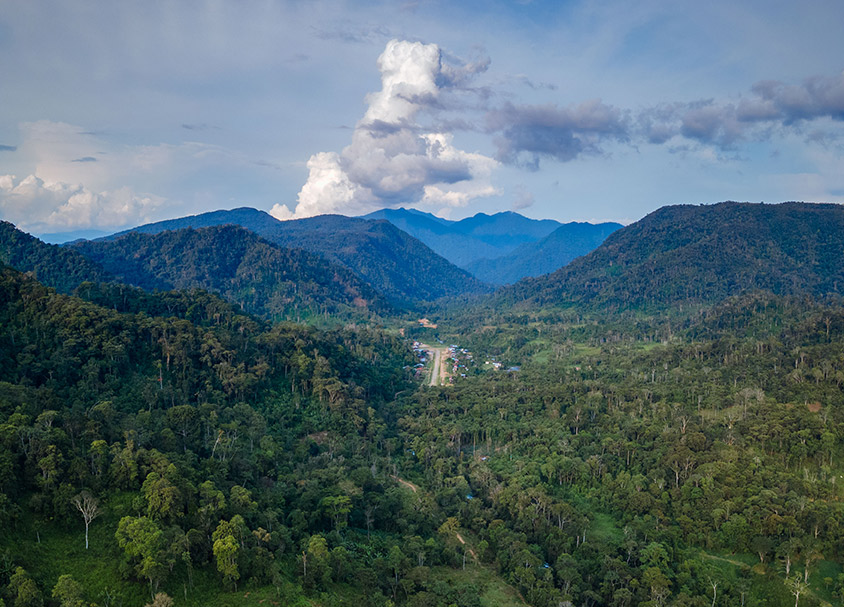
100% sustainable energy is the goal of environmentalists and lawmakers alike. However, a sticking point in achieving this goal is finding enough raw materials to create solar panels without damaging the environment. This is where Solaris Resources (TSX:SLS) (OTCQB:SLSSF) comes in. Solaris Resources is a copper mining company that specializes in finding and extracting copper, one of the key metals in the renewable energy transition, with minimal impact on the environment.
Solaris’ flagship Warintza project in Ecuador is operated according to the most stringent of ESG principles, without compromising the performance of the drill program. The company has just made its fourth discovery at the project of a broad porphyry deposit of at least 900m x 600 m and still open. This deposit is adjacent to and is not included in the Mineral Resource Estimate (MRE) from Warintza Central. The project is also set to be supplied by the Electric Corporation of Ecuador with low-cost, locally-sourced hydroelectric power.
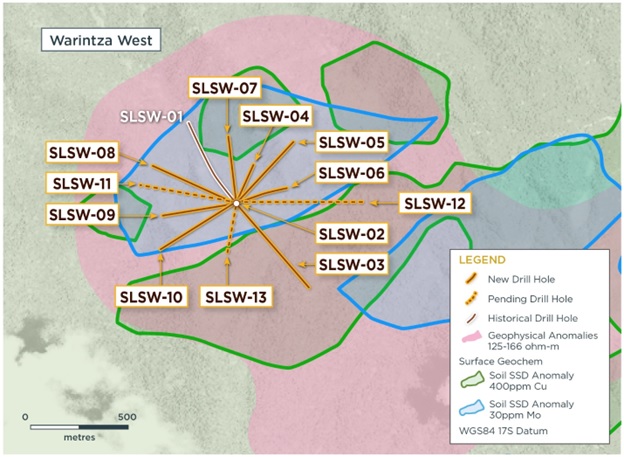
Copper projects are set to power the increase in manufacturing for solar panels, however, new projects are scarce, and shortages threaten to drive up prices. Solaris Resources is working to alleviate this issue by mining copper in a way that is respectful of the environment. Those same shortages could even delay the transition to renewable energy.
Despite this, the growth in solar power has been exponential in recent years, with the market projected to grow by over a hundred billion dollars in the coming years.
Copper at the Crossroads
Renewable energy sources, such as solar and wind, rely on certain metals to create electrical currents. Copper is one of the key metals that is needed in large quantities to make these sources of energy work. Copper is one of the most important metals in this area, as it is not just critical to solar power but all of the energy infrastructure, putting it at an important crossroads.
The infrastructure that is needed to support renewable energy is also reliant on copper. Copper cables, for example, are essential for transmitting power from the solar panels to the places where it is needed. Copper is also used in batteries to store energy.
The material used to create solar panels is also important. Solar panels are made from a variety of materials, but the most common is polysilicon. Polysilicon is a type of plastic that is used to create solar panels. Polysilicon is made from a variety of materials, but the most common is silicon. Silicon is not suffering the same shortages as other minerals and metals.
The shortage of copper has also driven up the price of copper. If the price of copper continues to increase, it could delay the transition to renewable energy.
Mining Industry Scramble
Rising prices, tight markets, and environmental concerns have all contributed to the unprecedented scramble by the mining industry to bring new projects to production. The first way this is being done is through exploration. Exploration is when miners look for new deposits to extract copper from. This is an expensive and time-consuming process, so it is often only done when there is a good chance that a deposit will be profitable.
Another way that the mining industry is trying to bring new projects to production is by renegotiating contracts. When a company has a contract to produce copper, it may be able to renegotiate the contract to produce other materials as well. For example, a company may have a contract to produce copper, but if the price of copper increases, it may be able to renegotiate the contract to produce aluminum.
The mining industry is also trying to bring new projects to production faster by investing in new technologies. This is often done by investing in new mining equipment. For example, the mining industry is trying to bring new projects to production by investing in new hydraulic fracturing technology. hydraulic fracturing is a process that is used to break down rocks to extract minerals.
As the mining industry scrambles to bring new projects to production, it is important that the regulators are aware of these efforts and are able to provide the necessary permits and licenses. If the regulators are not aware of these efforts, it could lead to delays in the production of the new projects. Concerns in the United States that permitting laws are not changing fast enough to move in lockstep with growing investment in battery metal and copper mining projects also remain.
However, projects around the world, including the Warintza Project in southeastern Ecuador, are moving forward with a focus on sustainability and social responsibility. Solaris Resources is one of the few mining companies that have a long track record of operating according to the most stringent of ESG principles, without compromising the performance of its drill programs.
The above references an opinion and is for information purposes only. It is not intended to be investment advice. Seek a licensed professional for investment advice. The author is not an insider or shareholder of any of the companies mentioned above.
Solaris Resources (TSX:SLS) has reported new assay results today from the first series of drill holes during follow-up drilling on the discovery of Warintza West. The results outline a new deposit that remains open in the Warintza cluster, just adjacent to the Mineral Resource Estimate (MRE) the company published in April 2022.
These follow-up holes fan out in all directions, outlining a broad porphyry deposit of at least 900m x 600m and still open and lies adjacent to and not included within the MRE. The company is focusing on targeting growth for the high-grade starter pit at Warintza Central and expanding the Warintza East discovery next while continuing the planned drilling at Warintza West. The Warintza Project is located in southeastern Ecuador, and Warintza West is the fourth and latest discovery at the project.
Highlights from the results are as follows:
Warintza West is one of four discoveries made to date within the Warintza porphyry cluster and is located 1km west of the Warintza Central Mineral Resource Estimate (“MRE”)¹ reported in April. The discovery was reported with the results of SLSW-01 (see press release dated February 16, 2021) – these follow-up holes fan out in all directions, outlining a broad porphyry deposit of at least 900m x 600m and still open and lies adjacent to and not included within the MRE. Follow-up drilling to test the further extent of the deposit is planned after priority drilling at Warintza Central aimed at expanding the starter pit and higher-grade resource expansion potential at Warintza East.
- SLSW-07 (drilled north) returned 686m of 0.46% CuEq¹ within a broader interval of 912m of 0.41% CuEq¹ from near surface
- SLSW-02 (drilled vertically) returned 246m of 0.47% CuEq¹ from near surface
- SLSW-09 (drilled west) returned 202m of 0.45% CuEq¹ within a broader interval of 444m of 0.36% CuEq¹ from near surface
- SLSW-08 (drilled northwest) returned 78m of 0.56% CuEq¹ within a broader interval of 812m of 0.32% CuEq¹ from near surface
- SLSW-04 (drilled northeast) returned 264m of 0.44% CuEq¹ from near surface
- SLSW-10 (drilled southwest) returned 220m of 0.41% CuEq¹ from near surface
- SLSW-03 (drilled southeast) returned 102m of 0.39% CuEq¹ within a broader interval of 911m of 0.24% CuEq¹ from near surface
- SLSW-05 (drilled northeast) returned 272m of 0.38% CuEq¹ within a broader interval of 570m of 0.30% CuEq¹ from near surface
- SLSW-06 (drilled east) returned 732m of 0.32% CuEq¹ from near surface
- Drilling at Warintza West confirms the interpretation of a broad porphyry deposit that remains open in all directions, with assays pending from a series of three additional holes testing the zone further to the west, east and south
- Step-out drilling is planned targeting high-grade surface sampling
Figure 1 – Plan View of Warintza West Drilling Released to Date
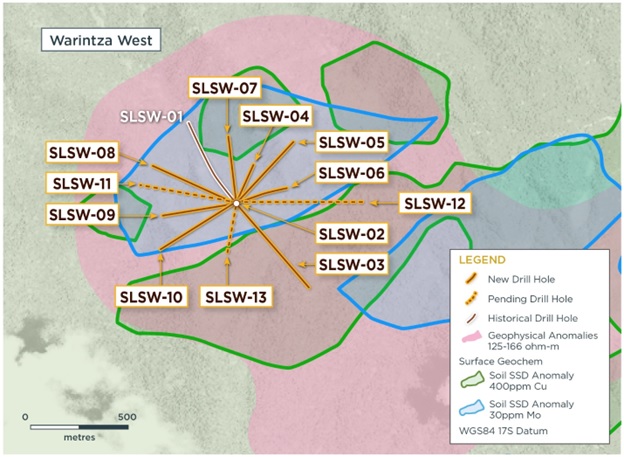
Table 1 – Assay Results
| Hole ID | Date Reported | From (m) | To (m) | Interval (m) | Cu (%) | Mo (%) | Au (g/t) | CuEq¹ (%) |
| SLSW-10 | 24 | 244 | 220 | 0.36 | 0.01 | 0.02 | 0.41 | |
| SLSW-09 | 24 | 468 | 444 | 0.31 | 0.01 | 0.03 | 0.36 | |
| Including | 24 | 226 | 202 | 0.41 | 0.01 | 0.03 | 0.45 | |
| SLSW-08 | 32 | 844 | 812 | 0.26 | 0.01 | 0.02 | 0.32 | |
| Including | 32 | 110 | 78 | 0.51 | 0.01 | 0.02 | 0.56 | |
| SLSW-07 | 24 | 936 | 912 | 0.32 | 0.02 | 0.03 | 0.41 | |
| Including | Oct 13, 2022 | 30 | 716 | 686 | 0.37 | 0.02 | 0.03 | 0.46 |
| SLSW-06 | 34 | 766 | 732 | 0.25 | 0.01 | 0.02 | 0.32 | |
| SLSW-05 | 34 | 604 | 570 | 0.23 | 0.01 | 0.02 | 0.30 | |
| Including | 34 | 306 | 272 | 0.31 | 0.01 | 0.02 | 0.38 | |
| SLSW-04 | 38 | 302 | 264 | 0.36 | 0.02 | 0.03 | 0.44 | |
| SLSW-03 | 38 | 949 | 911 | 0.19 | 0.01 | 0.02 | 0.24 | |
| Including | 40 | 142 | 102 | 0.33 | 0.01 | 0.03 | 0.39 | |
| SLSW-02 | 24 | 270 | 246 | 0.38 | 0.02 | 0.02 | 0.47 |
Notes to table: True widths of the mineralized zone are not known at this time.
Table 2 – Collar Location
| Hole ID | Easting | Northing | Elevation (m) | Depth (m) | Azimuth (degrees) | Dip (degrees) |
| SLSW-10 | 798507 | 9648465 | 1519 | 713 | 238 | -51.25 |
| SLSW-09 | 798507 | 9648465 | 1519 | 767 | 260 | -60.31 |
| SLSW-08 | 798507 | 9648465 | 1519 | 974 | 295 | -60.50 |
| SLSW-07 | 798507 | 9648465 | 1519 | 945 | 352 | -70.56 |
| SLSW-06 | 798507 | 9648465 | 1519 | 767 | 70 | -70.72 |
| SLSW-05 | 798507 | 9648465 | 1519 | 807 | 45 | -60.73 |
| SLSW-04 | 798507 | 9648465 | 1519 | 455 | 22 | -60.89 |
| SLSW-03 | 798507 | 9648465 | 1519 | 949 | 140 | -55.50 |
| SLSW-02 | 798507 | 9648465 | 1519 | 1227 | 0 | -90.00 |
| Notes to table: The coordinates are in WGS84 17S Datum. | ||||||
Endnotes
- Refer to Solaris’ press release dated April 18, 2022 and technical report titled, “NI 43-101 Technical Report for the Warintza Project, Ecuador” with an effective date of April 1, 2022, prepared by Mario E. Rossi and filed on the Company’s SEDAR profile at www.sedar.com.
- Copper-equivalence calculated as: CuEq (%) = Cu (%) + 4.0476 × Mo (%) + 0.487 × Au (g/t), utilizing metal prices of US$3.50/lb Cu, US$15.00/lb Mo, and US$1,500/oz Au, and assumes recoveries of 90% Cu, 85% Mo, and 70% Au based on preliminary metallurgical test work.
The above references an opinion and is for information purposes only. It is not intended to be investment advice. Seek a licensed professional for investment advice. The author is not an insider or shareholder of any of the companies mentioned above.
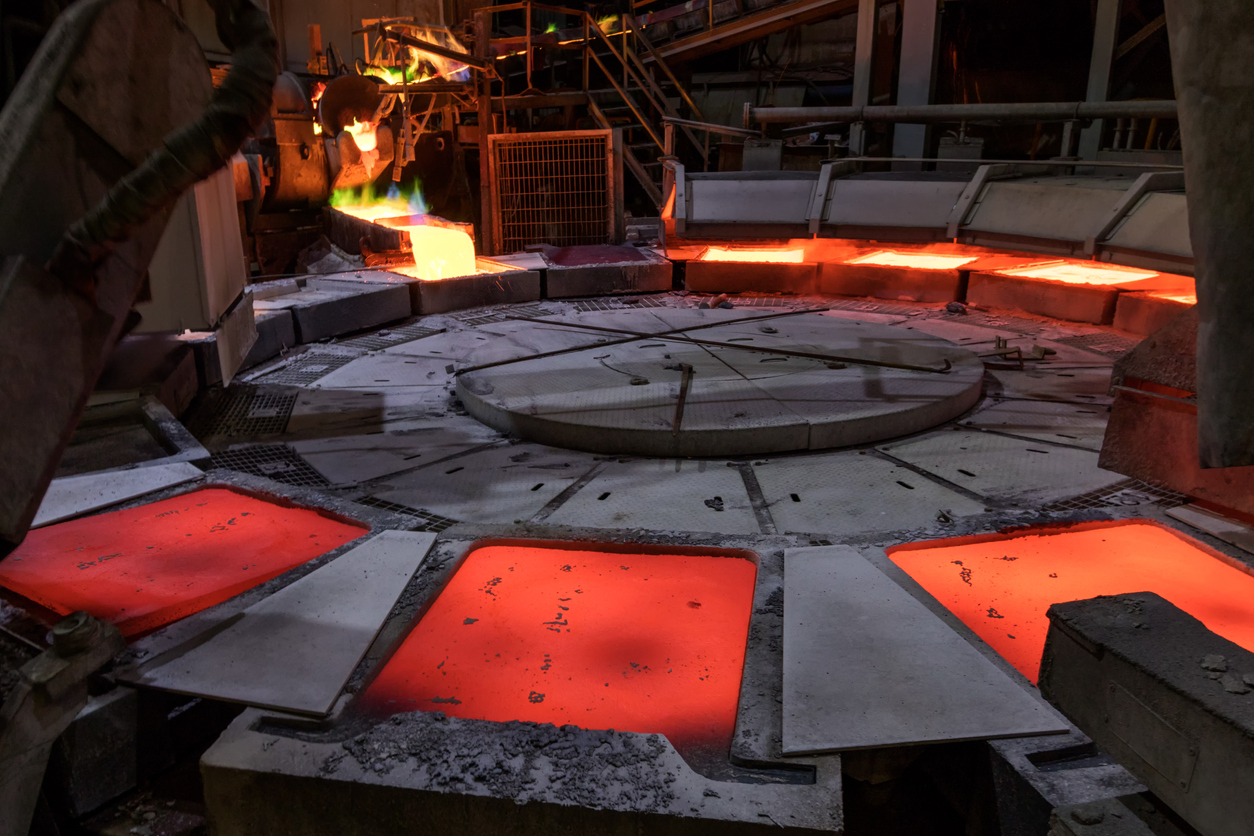
The global demand for minerals has placed a spotlight on the need for a stronger industrial base, one that includes more domestic production and processing of metals that are critical for a modern society. Energy security is strongly linked to mining, as minerals are essential ingredients in the production of energy technologies. Despite the critical role of minerals in securing economic futures and the protection of our planet, the U.S. continues to delay many high-value mining projects while deepening import dependence on the materials they provide.
Current energy disruptions have made it even more clear that a mineral and metals supply chain that relies heavily on a handful of countries can make the whole chain weak. Since Russia’s invasion of Ukraine, the U.S. and EU have looked for ways to reduce their dependence on Russian natural gas. One promising solution is to develop shale gas resources in the United States, which would help create jobs and reduce greenhouse gas emissions. However, this process requires large amounts of minerals, such as sand, clay, and limestone – all of which are in short supply.
Copper is another tight market being squeezed due to other supply chain issues that were exacerbated during the COVID-19 pandemic. New projects are in short supply, so companies are often eager to acquire new high-grade copper projects when they become available. The Warintza Project in southeastern Ecuador is operated by Solaris Resources (TSX:SLS) a junior mining company that is currently advancing the project towards production.
The Warintza Project has the potential to fill some of the gaps in the current copper market. The project is expected to produce approximately 100 million pounds of copper per year, making it one of the largest copper mines in Ecuador. In addition, the Warintza Project has been called a potential “super pit”, and has released a mineral resource estimate for a significant ‘Indicative Starter Pit’. The company reported in-pit resources of 579 Mt at 0.59% CuEq (Ind) and 887 Mt at 0.47% CuEq (Inf), and 180 Mt at 0.82% CuEq (Ind) and 107 Mt at 0.73% CuEq (Inf) at the time. Most recently, Solaris reported assay results from a series of holes aimed at growing the Northeast Extension of the ‘Indicative Starter Pit’.
Copper is another area the United States and many other countries are looking to lower import dependence. Companies like Tesla, a large consumer of copper for car and battery technology, have been vocal about their desire to source minerals from North America. The Warintza Project could play a role in meeting this demand, as it is located in an area with good infrastructure and a skilled workforce.
The vulnerability of the energy industry has accelerated the calls for renewable energy sources that would reduce or eliminate the dependence on oil and gas from other countries. To bolster domestic supply, it will require projects like the Warintza Project to fill the demand that continues to grow faster than supply. Junior mining companies will play a larger role in a future of energy security than ever before.
The above references an opinion and is for information purposes only. It is not intended to be investment advice. Seek a licensed professional for investment advice. The author is not an insider or shareholder of any of the companies mentioned above.
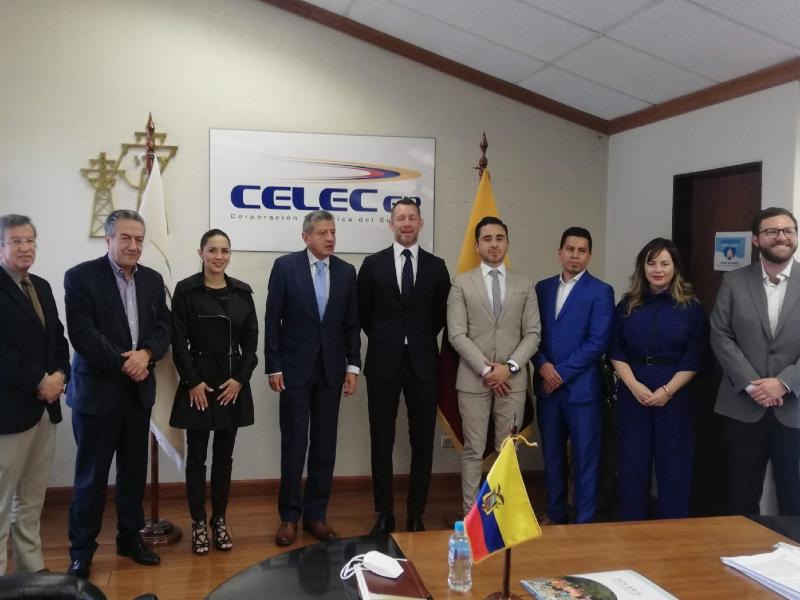
As the world becomes increasingly digitized and reliant on technology, the demand for copper continues to grow. Copper is used in everything from smartphones to power grids, and the mining and production of this valuable metal has a significant environmental impact. However, thanks to recent innovations in mining and production technology, we may be able to meet this growing demand without harming the environment.
Companies engaged in copper exploration are currently leading the charge toward a greener future for the industry. One such company is Rio Tinto, which has been working on developing a new method of extracting copper from ore that doesn’t require smelting. Smelting is a process that releases harmful greenhouse gases into the atmosphere, so eliminating it would be a major step forward in terms of reducing the environmental impact of copper mining.
Another great example is Solaris Resources (TSX:SLS) which has signed a Memorandum of Understanding with Electric Corporation of Ecuador (“CELEC EP”) to supply low-cost, locally sourced hydroelectric power to the Warintza Project (“Warintza” or “the Project”) in southeastern Ecuador.
CELEC EP will source hydroelectric power from the National Transmission System in Ecuador to provide primary power required for the Warintza Project. This initiative is consistent with the “Ecuador Zero Carbon Program” developed by the Ministry of Environment, Water and Ecological Transition and Solaris was the first mining signatory of September 2021.
Solaris wants to make the most of this efficient, renewable, and cheap energy source by investigating how to electrify infrastructure like mobile mining equipment (e.g., drills, trucks), goods transportation (including gravity-assisted solutions), and processing and pumping systems.
Daniel Earle, President & CEO, commented in a press release: “The MOU with CELEC supports our vision to study the potential for electrified operations that maximize the structural benefits of the Warintza Project within an infrastructure-rich mining district with the aim of lowering costs, increasing efficiencies, reducing emissions, and broadly positioning the Project as a leading development opportunity across a range of financial and ESG metrics in the industry.”
Supplying power for the infrastructure and mining activities at Warintza with renewable energy will help to offset the environmental impact of the project, and could set a precedent for other mines in the area.
Other companies have also looked at switching transportation to a net-zero emissions model, in which electric vehicles are powered by renewable energy sources. This would not only reduce emissions from the mining process itself, but also from the transportation of copper ore to processing plants.
Considering copper is one of the key elements powering the transition to renewable energy, it’s encouraging to see the exploration and production industry working hard to reduce its environmental impact. With continued research and development, companies like Solaris Resources are driving the mission toward net-zero forward faster than ever.
The above references an opinion and is for information purposes only. It is not intended to be investment advice. Seek a licensed professional for investment advice. The author is not an insider or shareholder of any of the companies mentioned above.
Solaris Resources (TSX:SLS) has reported new assay results from a series of holes at the Warintza Project in southeastern Ecuador. The holes are aimed at growing the Northeast Extension of the previously announced “Indicative Starter Pit”. The company is moving forward with drilling platforms in the Northeast Extention that are set to drive the latest high-grade results from the project.
Mr. Jorge Fierro, Vice President of Exploration, commented in a press release: “Drilling from existing and recently-completed platforms in the Northeast Extension zone is a key driver in the expansion of the ‘Indicative Starter Pit’, and we look forward to reporting the next set of results in the near future as the backlog of assays pending is now resolved.”
The “Indicative Starter Pit” was noted in an April 18, 2022 announcement from the company in a mineral resource estimate for the Warintza Central Deposit, in which the company reported in-pit resources of 579 Mt at 0.59% CuEq (Ind) and 887 Mt at 0.47% CuEq (Inf), and 180 Mt at 0.82% CuEq (Ind) and 107 Mt at 0.73% CuEq (Inf) for the “Indicative Starter Pit”.
Solaris also intends to spin out its non-core assets in Ecuador outside of the Warintza porphyry cluster, Peru, Chile, and Mexico into a new incorporated wholly-owned subsidiary of Solaris named Solaris Exploration Inc. Following the internal re-organization, it is expected that 100% of the common shares of Solaris Exploration Inc. will be spun out to shareholders of Solaris relative to their shareholdings.
Figure 1 – Plan View of Warintza Central Drilling Released to Date
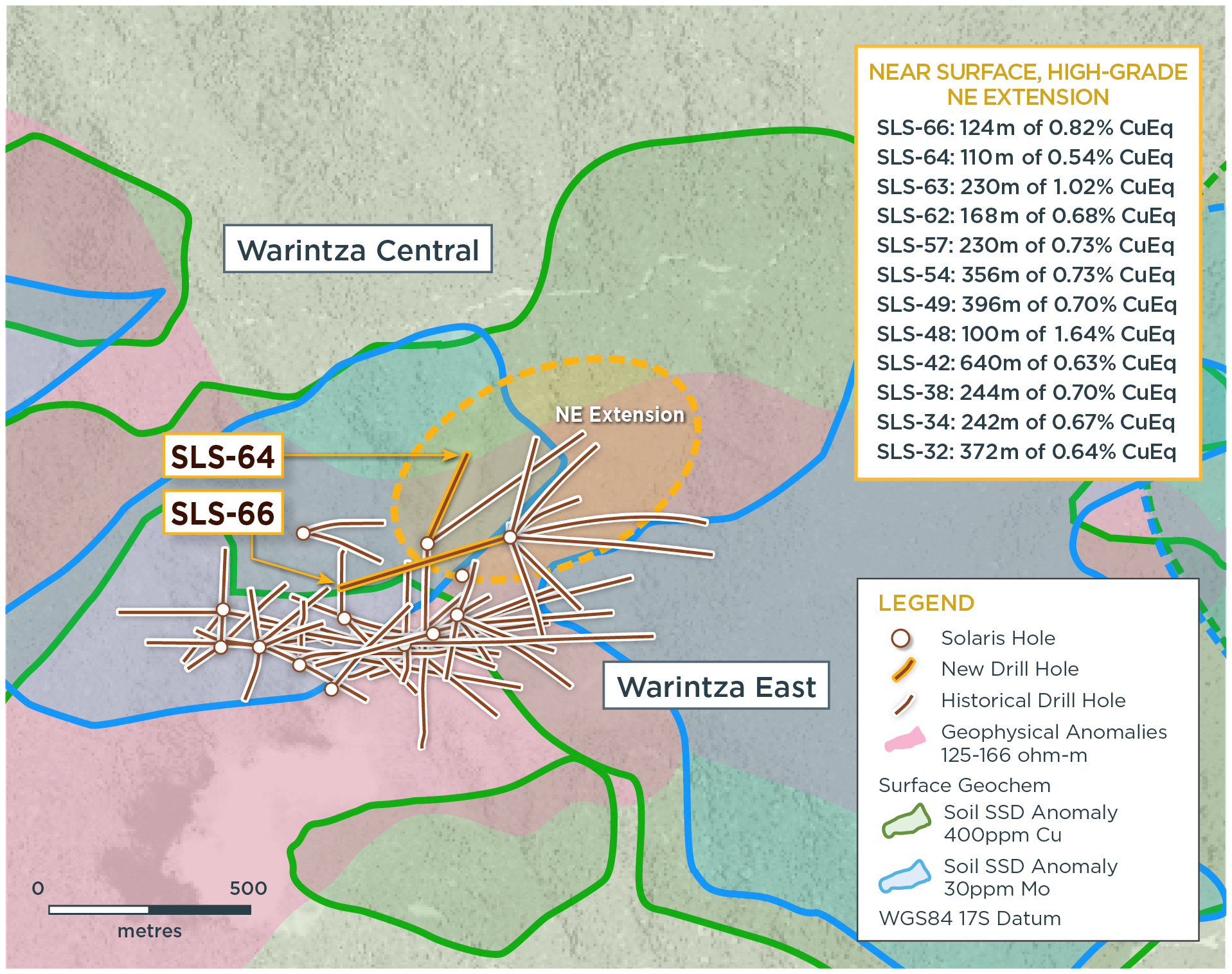
Highlights from the results are as follows:
Additional drilling has expanded the Northeast Extension of the ‘Indicative Starter Pit’ recently estimated at 180 Mt at 0.82% CuEq¹ (Indicated) and 107 Mt at 0.73% CuEq¹ (Inferred) within the Warintza Mineral Resource Estimate² (“MRE”). This zone is characterized by near surface, high-grade mineralization and remains open for further growth with follow-up drilling underway.
- SLS-66 was collared on a platform at the northeastern limit of the Warintza Central grid and drilled southwest into an open volume, returning 124m of 0.82% CuEq¹ within a broader interval of 622m of 0.42% CuEq¹ starting from surface
- SLS-66 follows from previous holes SLS-63 and SLS-54, which were drilled from the same pad to the north and southeast and respectively returned high-grade intervals of 230m of 1.02% CuEq¹ and 356m of 0.73% CuEq³ within broader intervals (refer to press releases dated Jul 20, 2022 and Apr 4, 2022 for details)
- SLS-64 was collared on a platform at the northern limit of Warintza Central and drilled north-northeast into an open volume, returning 110m of 0.54% CuEq¹ from near surface within a broader interval of 440m of 0.48% CuEq¹, extending and broadening the zone to the north in this area
- SLS-64 follows from previous holes SLS-62 and SLS-48, which were drilled from the same pad to the northeast and south and respectively returned high-grade intervals of 168m of 0.68% CuEq¹ and 100m of 1.64% CuEq³ within broader intervals (refer to press releases dated Jul 20, 2022 and Feb 28, 2022 for details)
- SLS-65, which is a step out hole from a new platform 200m to the north, has now been completed after operational delays with adjustments to the platform for drilling and assays are expected within the next four weeks
Table 1 – Assay Results
| Hole ID | Date Reported | From (m) | To (m) | Interval (m) | Cu (%) | Mo (%) | Au (g/t) | CuEq¹ (%) |
| SLS-66 | Sep 07, 2022 | 0 | 622 | 622 | 0.32 | 0.02 | 0.05 | 0.42 |
| Including | 66 | 190 | 124 | 0.71 | 0.02 | 0.09 | 0.82 | |
| SLS-64 | 78 | 518 | 440 | 0.32 | 0.04 | 0.04 | 0.48 | |
| Including | 78 | 188 | 110 | 0.38 | 0.04 | 0.03 | 0.54 |
Notes to table: True widths of the mineralized zone are not known at this time.
Table 2 – Collar Location
| Hole ID | Easting | Northing | Elevation (m) | Depth (m) | Azimuth (degrees) | Dip (degrees) |
| SLS-66 | 800383 | 9648303 | 1412 | 689 | 255 | -48 |
| SLS-64 | 800178 | 9648285 | 1439 | 571 | 26 | -66 |
Notes to table: The coordinates are in WGS84 17S Datum.
Endnotes
- Copper-equivalence calculated as: CuEq (%) = Cu (%) + 4.0476 × Mo (%) + 0.487 × Au (g/t), utilizing metal prices of US$3.50/lb Cu, US$15.00/lb Mo, and US$1,500/oz Au, and assumes recoveries of 90% Cu, 85% Mo, and 70% Au based on preliminary metallurgical test work.
- Refer to Solaris’ technical report titled, “NI 43-101 Technical Report for the Warintza Project, Ecuador” with an effective date of April 1, 2022, prepared by Mario E. Rossi and filed on the Company’s SEDAR profile at www.sedar.com.
- Copper-equivalence calculated as: CuEq (%) = Cu (%) + 3.33 × Mo (%) + 0.73 × Au (g/t), utilizing metal prices of US$3.00/lb Cu, US$10.00/lb Mo, and US$1,500/oz Au. No adjustments were made for recovery prior to the updated Warintza Mineral Resource Estimate, as the metallurgical data to allow for estimation of recoveries was not yet available. Solaris defined CuEq for reporting purposes only.
The above references an opinion and is for information purposes only. It is not intended to be investment advice. Seek a licensed professional for investment advice. The author is not an insider or shareholder of any of the companies mentioned above.
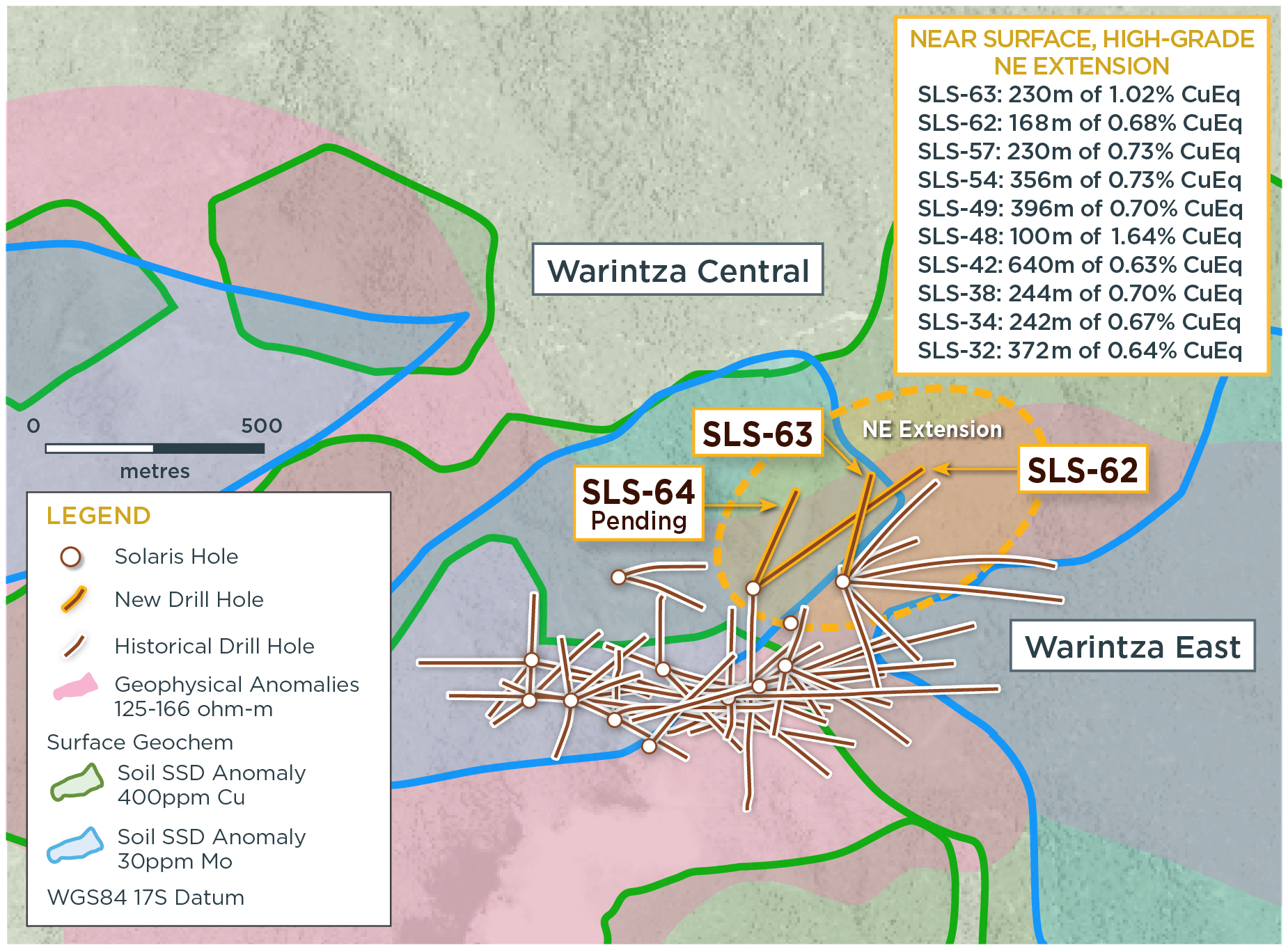
Solaris Resources (TSX:SLS) (OTCQB:SLSSF) has announced this morning new assay results from a series of holes aimed at growing the Northeast Extension of the “Indicative Starter pit” at the Warintza Project. The “Indicative Starter Pit” was noted in an April 18, 2022 announcement from the company in a mineral resource estimate for the Warintza Central Deposit, in which the company reported in-pit resources of 579 Mt at 0.59% CuEq (Ind) and 887 Mt at 0.47% CuEq (Inf), and 180 Mt at 0.82% CuEq (Ind) and 107 Mt at 0.73% CuEq (Inf) for the “Indicative Starter Pit”. The company has been targeting high-grade extensions and major growth in cluster at the project, with ongoing drilling focused on open extensions of near surface, high-grade mineralization to the northeast and southeast of Warintza Central.
Mr. Jorge Fierro, Vice President, Exploration, commented in a press release: “Ongoing drilling from existing and newly constructed platforms aims to expand on the Northeast Extension zone, which is one of the key target areas for the expansion of the ‘Indicative Starter Pit,’ along with higher grade, near surface mineralization being targeted at Warintza East, where results are pending.”
Highlights from the results are as follows:
Additional drilling has expanded the Northeast Extension of the ‘Indicative Starter Pit’ recently estimated at 180 Mt at 0.82% CuEq1 (Indicated) and 107 Mt at 0.73% CuEq1 (Inferred) within the Warintza Mineral Resource Estimate² (“MRE”). This zone is characterized by near surface, high-grade mineralization and remains open for further growth with follow-up and step-out drilling underway.
- SLS-62 was collared at the northern limit of Warintza Central and drilled northeast into an open volume, returning 168m of 0.68% CuEq¹ from 102m depth within a broader interval of 900m of 0.45% CuEq¹ from surface, expanding on prior drilling further to the east
- This hole represents the first follow-up to SLS-48, collared from the same pad but drilled to the south, which returned 100m of 1.64% CuEq³ from 50m depth within a broader interval of 852m of 0.56% CuEq³ (refer to press release dated Feb 28, 2022)
- SLS-63 was collared at the northeastern limit of the Warintza Central grid approximately 200m to the east and drilled into an open volume to the north-northeast, returning 230m of 1.02% CuEq¹ from 118m depth within a broader interval of 472m of 0.76% CuEq¹ from surface
- This hole follows on SLS-57, which was drilled northeast from the same pad, returning 230m of 0.73% CuEq¹ from 56m depth within a broader interval of 926m of 0.61% CuEq¹ from surface and SLS-54, drilled to the south and returning 356m of 0.73% CuEq³ from 50m depth within a broader interval of 1,093m of 0.56% CuEq³ from surface (refer to press releases dated May 26 and Apr 4, 2022)
- Follow-up drilling is underway and aims to test the Northeast Extension zone further to the north and northeast, with assays expected shortly for SLS-64, representing a follow-up hole from the same pad as SLS-62 and SLS-48
Table 1 – Assay Results
| Hole ID | Date Reported | From (m) | To (m) | Interval (m) | Cu (%) | Mo (%) | Au (g/t) | CuEq¹ (%) |
| SLS-63 | Jul 20, 2022 | 0 | 472 | 472 | 0.60 | 0.02 | 0.12 | 0.76 |
| Including | 118 | 348 | 230 | 0.87 | 0.02 | 0.12 | 1.02 | |
| SLS-62 | 10 | 910 | 900 | 0.33 | 0.02 | 0.07 | 0.45 | |
| Including | 102 | 270 | 168 | 0.51 | 0.03 | 0.07 | 0.68 |
Table 2 – Collar Location
| Hole ID | Easting | Northing | Elevation (m) | Depth (m) | Azimuth (degrees) | Dip (degrees) |
| SLS-63 | 800383 | 9648303 | 1412 | 498 | 17 | -61 |
| SLS-62 | 800178 | 9648285 | 1439 | 943 | 55 | -60 |
| Notes to table: The coordinates are in WGS84 17S Datum. | ||||||
Endnotes
- Copper-equivalence calculated as: CuEq (%) = Cu (%) + 4.0476 × Mo (%) + 0.487 × Au (g/t), utilizing metal prices of US$3.50/lb Cu, US$15.00/lb Mo, and US$1,500/oz Au, and assumes recoveries of 90% Cu, 85% Mo, and 70% Au based on preliminary metallurgical test work.
- Refer to Solaris press release dated April 18, 2022, stating updated Warintza Mineral Resource Estimate.
- Copper-equivalence calculated as: CuEq (%) = Cu (%) + 3.33 × Mo (%) + 0.73 × Au (g/t), utilizing metal prices of US$3.00/lb Cu, US$10.00/lb Mo, and US$1,500/oz Au. No adjustments were made for recovery prior to the updated Warintza Mineral Resource Estimate, as the metallurgical data to allow for estimation of recoveries was not yet available. Solaris defined CuEq for reporting purposes only.
Source: Solaris Resources
The above references an opinion and is for information purposes only. It is not intended to be investment advice. Seek a licensed professional for investment advice. The author is not an insider or shareholder of any of the companies mentioned above.
Solaris Resources (TSX:SLS) has provided an update for the Warintza Project in southeastern Ecuador, and announced that it has identified a number of new targets for further exploration in the support of the drill program. The company also provided a report on the progress of the proposed asset spin-out to create Solaris Exploration Inc. Ecuador’s recent protests concluded on June 30, and the company’s samples have now been able to flow from the core processing facility to the prep lab, which has resumed operations. The samples are continuing on for final assays in Lima, Peru, although there is a considerable backlog of assays still pending.
The company is continuing its regional exploration program and identified new porphyry, skarn, and epithermal targets. A large high sulphidation epithermal target was identified adjacent to the Warintza porphyry cluster where overlapping mineralized porphyries have intruded a layered sequence of carbonate and volcanic rocks. This has given the mineralization a very fertile setting to be able to develop.
Solaris also provided an update of the proposed Solaris Exploration spin-out, and when completed, it is expected that 100% of the common shares of Solaris Exploration will be spun out to shareholders of Solaris relative to their current shareholdings. Details of the corporate update are as follows:
Corporate Update on Proposed Solaris Exploration Spin-Out
Solaris continues to advance the proposed spin-out and has made considerable progress with the internal re-organization of the Company, its subsidiaries and mineral concessions including the transfer of its non-core assets held in Ecuador outside of the Warintza porphyry cluster (involving the authorization of the Ministry of Energy and Mines), Peru, Chile and Mexico into a newly incorporated wholly-owned subsidiary of Solaris named Solaris Exploration Inc. Following the internal re-organization, it is expected that 100% of the common shares of Solaris Exploration Inc. will be spun out to shareholders of Solaris relative to their shareholdings (refer to press release dated December 6, 2021).
Source: Solaris Resources
A full update from Warintza and the regional exploration program is as follows:
Warintza Update
Exploration activities at the Warintza Project continue with seven drill rigs targeting high value growth of the recently reported Warintza Mineral Resource Estimate (refer to press release dated April 18, 2022), with drilling at Warintza Central targeting extensions to near surface, high-grade mineralization, and major growth targeted from the expansion of drill coverage at Warintza East within a largely undrilled footprint. With the protests in Ecuador having concluded on June 30, the flow of samples from the Company’s core processing facility to its prep lab, which has now resumed operations, and onward for final assay in Lima has restarted, with a considerable backlog of assays pending.
Regional Exploration Update
Solaris has undertaken the first significant program of regional exploration at Warintza since the original stream sediment sampling program that identified the Warintza porphyry cluster in the 1990s. This work has identified additional porphyry targets (refer to Figure 1), potentially expanding the footprint of the cluster to the northeast, and possibly a new area of porphyry emplacement to the west, approximately halfway to the adjacent San Carlos copper porphyry deposit.
In addition, this work has established a series of skarn targets, as well as a large high sulphidation epithermal target adjacent to the Warintza porphyry cluster where overlapping mineralized porphyries have intruded a layered sequence of carbonate and volcanic rocks that have provided a fertile setting to develop these styles of mineralization.
Porphyry Targets:
- Mateo: 3km x 1.4km area of copper-molybdenum enrichment in soil samples located approximately 5km to the east of Warintza East. A program of detailed mapping and sampling is underway to refine the target in support of drilling.
- Cora: 1.2km x 1.4km copper-molybdenum-gold soil anomaly in andesitic volcanic sequences cut by porphyry dikes approximately 3km to the northeast of Warintza East. This anomaly resembles those that defined the Warintza East and Warintza South discoveries. Detailed mapping and sampling are planned to refine the target in support of drilling.
- Medio Camino: 3.5km x 1.5km area of porphyry-related alteration, and copper-molybdenum veining 5km to the west of Warintza West and 7km east of the adjacent San Carlos copper porphyry deposit. An extensive program of soil and rock chip sampling has been completed to refine the large target area, with results pending.
Skarn Targets:
Five skarn targets have been identified with three of these forming a partial arc on the northeastern side of the Warintza porphyry cluster, which is typical of skarn mineralization related to porphyry systems.
- Playas and Justo: Extensive mineral alteration typical of skarn systems has been identified in an area of copper mineralization concentrated in a permeable horizon 3.5km northwest of Warintza West. Soil sampling of the 10km2 area surrounding the Justo target has been completed in an effort to refine the target, with results pending. Soil sampling is also planned at the Playas target, along with detailed mapping at both targets based on the results of soil sampling.
- Betty and Yawi: Betty, a 1.2km x 1.4km skarn and potential carbonate replacement target located 0.5km north of Warintza Central, features significant copper values in rock samples in carbonate horizons within volcano-sedimentary sequences. Within the Yawi target, a 2km x 1km skarn/carbonate replacement target features strongly anomalous zinc values in limited soil sampling within a high conductivity anomaly interpreted from ZTEM. Additional soil sampling is planned at both targets.
- La Celestina: Marble exposed in streams in this 1.7km x 1.2km area host copper-zinc veinlets that may represent leakage from a mineralized zone below, with soil geochemistry showing enrichment of pathfinder elements and anomalous copper. Two windows of garnet-bearing skarn containing copper mineralization are exposed through the marble. Detailed mapping and sampling of marble and exposed skarn are underway to help define drill targets.
High Sulphidation Epithermal Gold Target
- Caya: Large 5km x 3km gold anomaly in stream sediments, 6km to the northeast of Warintza East, where recent follow-up soil and rock sampling in the southern part of the anomaly has identified a flat-lying volcano-sedimentary layer that has a high permeability over at least 300m in thickness. In this portion of the anomaly, an area of 0.7km x 1.3km features anomalous gold, copper and pathfinder element values in soil and rock samples, and a concentration of dickite clay and vuggy silica, characteristic of high sulphidation systems.
Figure 1 – Regional Map of Solaris Land Package in Ecuador
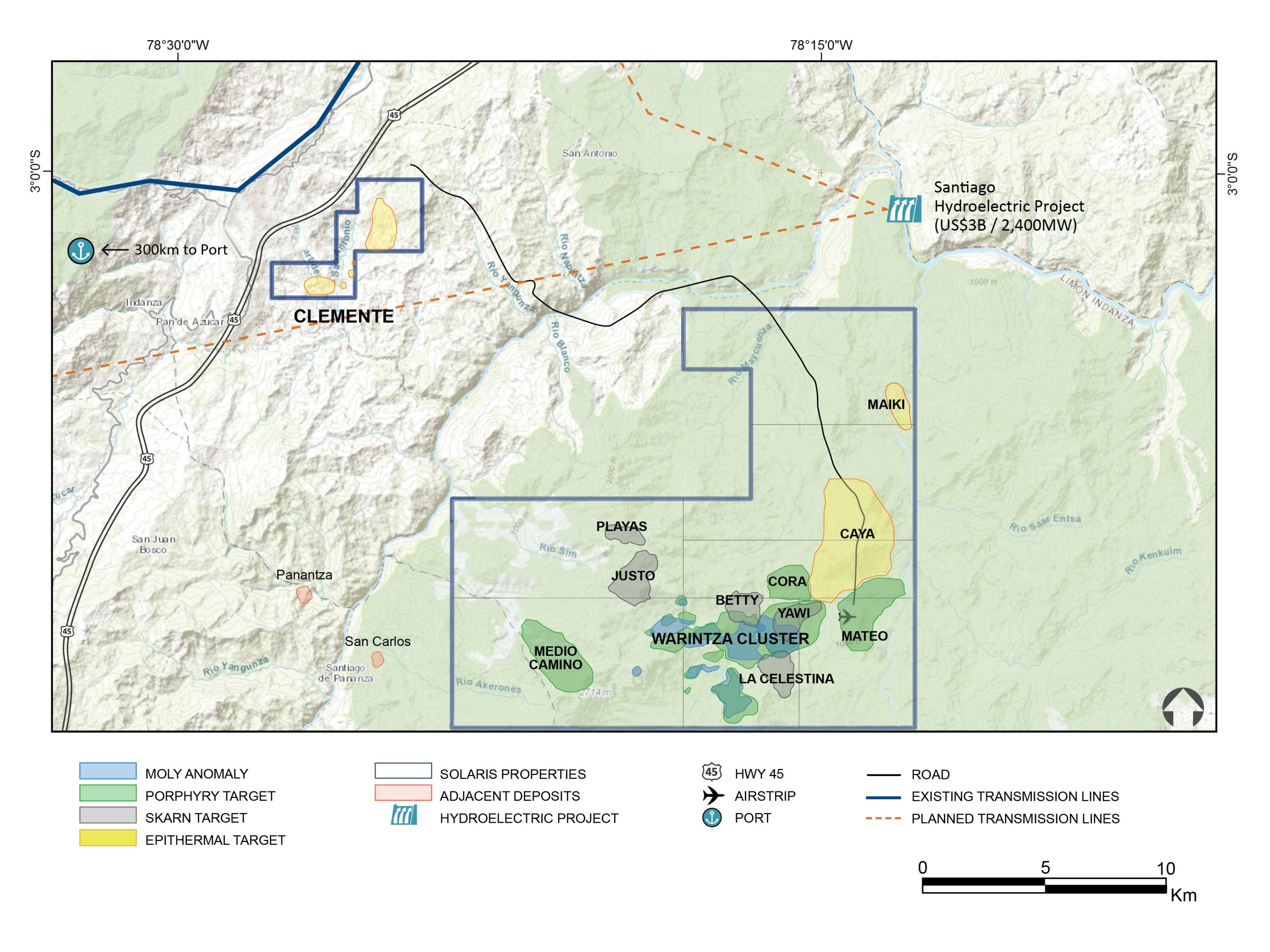

The above references an opinion and is for information purposes only. It is not intended to be investment advice. Seek a licensed professional for investment advice. The author is not an insider or shareholder of any of the companies mentioned above.
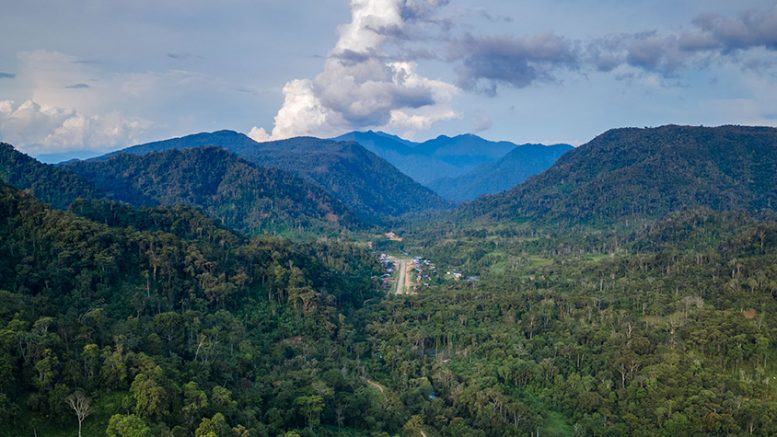

Solaris Resources (TSX:SLS) has announced an agreement with the Government of Ecuador that will secure the stability of its Warintza Project in southeastern Ecuador. The company has signed an Investment Protection Agreement that provides a foundation of certainty for the legal framework governing the Warintza Project. The agreement outlines further affirmation of stable mining regulations, security of title, and investment for the term of the agreement, on top of significant new tax incentives to accelerate development at the project.
Highlights from the agreement:
- The IPA provides a foundation of certainty with respect to the legal framework governing the Project, including stable mining regulations, security of title and investment, and new tax incentives to accelerate development
- 5% reduction of income tax, fixing the income tax rate at 20% (applicable to SLS), exemption from capital outflow tax, and exemption of all import duties for the import of goods needed for new investments
- Specific protections relate to the prohibition of all forms of confiscation, non-discriminatory treatment and equal playing field, legal security, tax stability and international arbitration
- IPA signing ceremony to take place with the Warints and Yawi communities at the Project in July. SLS recently amended its Impact and Benefits Agreement with these communities reaffirming their support for the responsible advancement of Warintza
Ms. Lorena Konanz, Vice Minister of Export and Investment Promotion of the Government of Ecuador, stated, “From day one, our administration has been focused on encouraging sustainable and transparent economic growth in Ecuador with incentives to facilitate major investments in the country. In the mining sector, our most important goal is to ensure that development is responsible, environmentally friendly, and socially-committed, as at the Warintza Project.”
Mr. Vicente Tsakimp, Coordinator of the Warintza Project Strategic Alliance, stated, “We are excited to be part of the successful advancement of Warintza and show the industry that it is possible to develop a mining project in a responsible and inclusive way. The people of Warints and Yawi welcome President Lasso’s approach which promotes the development of remote communities as this has had a direct impact on our families’ economy, living conditions and opportunities.”
Mr. Daniel Earle, President & CEO, commented, “President Lasso´s administration continues to take consequential action to accelerate the development of the formal mining sector in Ecuador. Its positive approach of regulatory reform and meaningful tax relief focused on major new projects like Warintza, which embrace responsible approaches to community development and environmental protection, will pay great dividends to the people of Ecuador for generations to come. We are humbled to operate in service of its vision.”
The agreement will include a 5% income tax reduction, fixing the total income tax rate applicable to Solaris Resources at 20%. There will also be an exemption from the capital outflow tax and all import duties for any import of goods needed for new investments in the Warintza project. The signing ceremony for the agreement will take place with the participation of the Warints and Yawi communities, two important community partners for the Warintza Project and Solaris, in the village of Warintza sometime in July 2022.
The other notable parts of the agreement are the specific protections related to the prohibition of all forms of confiscation, non-discriminatory treatment and equal playing field, legal security, tax stability, and international arbitration if there are any disputes about the Warintza Project. With countries like Peru experiencing upheaval in the mining industry and nationalization of resources and projects in Mexico, Ecuador and the communities of Warints and Yawi have shown that collaborative, collective work is not only possible, but the most beneficial form of business for all stakeholders.
The above references an opinion and is for information purposes only. It is not intended to be investment advice. Seek a licensed professional for investment advice. The author is not an insider or shareholder of any of the companies mentioned above.
Solaris Resources (TSX:SLS) (OTCQB:SLSSF) has reported assay results from a series of holes at the Warintza Project. The drilling at the holes is aimed at upgrading and growing mineral resources at the project, which was recently released.
Mr. Jorge Fierro, Vice President, Exploration, commented in a press release: “Ongoing follow-up drilling from existing and newly constructed platforms aims to expand on the Northeast Extension zone and grow the high-grade indicative starter pit, while also targeting areas within Warintza Central where resource classification can be upgraded with targeted drilling. In addition, we have completed a considerable amount of drilling from our recent Warintza East discovery targeting major growth with assays pending.”
Highlights are listed below, with a corresponding image in Figure 1 and detailed results in Tables 1-2.
Northeast Extension
SLS-57 was collared at the northeastern limit of the Warintza Central grid and drilled northeast into an entirely open volume, returning 230m of 0.73% CuEq¹ from 56m depth within a broader interval of 926m of 0.61% CuEq¹ from surface, extending the zone 200m to the northeast where it remains open.
Additional drilling aimed at expanding the zone to the north from this platform and broadening the zone with holes from the platform located 200m to the west where SLS-48 returned 100m of 1.64% CuEq² from 50m depth within 852m of 0.56% CuEq² have been completed with assays pending.
The Northeast Extension zone is characterized by near surface, high-grade mineralization, and represents a priority target for growth of the ‘Indicative Starter Pit’ recently estimated at 180 Mt at 0.82% CuEq1 (Indicated) and 107 Mt at 0.73% CuEq1 (Inferred) within the Warintza Mineral Resource Estimate³ (“MRE”).
Warintza Central
A limited program of follow-up drilling at Warintza Central within the MRE envelope is aimed at upgrading targeted volumes that the geological model predicts hold potential for higher grades than the MRE reflects, as well as increasing the confidence of mineral resources in the Inferred category.
SLS-56 was collared from the southeastern portion of the grid and drilled east, returning 102m of 0.90% CuEq¹ from 48m depth within a broader interval aimed at adding definition to the southern portion of the overlap between the Warintza Central and Warintza East deposits.
SLS-60 was collared from the central portion of the grid and drilled south, returning 154m of 0.90% CuEq¹ from 70m depth within a broader interval of 829m of 0.58% CuEq¹ from 44m depth.
SLS-61 was collared from the south-central portion of the grid and drilled southwest, returning 930m of 0.77% CuEq¹ from surface, successfully infilling data in this area.
SLS-58 was collared from the south-central portion of the grid and drilled northeast into an area that the exploration model predicted could be upgraded, and successfully returned 741m of 0.62% CuEq¹ from 102m depth, improving on the grade modelled in this volume.
SLS-59 was collared from the southwestern portion of the grid and drilled northeast, returning 238m of 0.85% CuEq¹ from near surface within a broader interval of 511m of 0.73% CuEq¹ from surface.
Figure 1 – Plan View of Warintza Central Drilling Released to Date


Table 1 – Assay Results
| Hole ID | Date Reported | From (m) | To (m) | Interval (m) | Cu (%) | Mo (%) | Au (g/t) | CuEq¹ (%) |
| SLS-61 | May 26, 2022 | 2 | 932 | 930 | 0.62 | 0.03 | 0.07 | 0.77 |
| SLS-60 | 44 | 873 | 829 | 0.50 | 0.01 | 0.04 | 0.58 | |
| Including | 70 | 224 | 154 | 0.81 | 0.02 | 0.05 | 0.90 | |
| SLS-59 | 2 | 513 | 511 | 0.54 | 0.04 | 0.07 | 0.73 | |
| Including | 34 | 272 | 238 | 0.67 | 0.03 | 0.08 | 0.85 | |
| SLS-58 | 102 | 843 | 741 | 0.48 | 0.03 | 0.06 | 0.62 | |
| SLS-57 | 0 | 926 | 926 | 0.49 | 0.02 | 0.08 | 0.61 | |
| Including | 56 | 286 | 230 | 0.59 | 0.03 | 0.08 | 0.73 | |
| SLS-56 | 48 | 606 | 558 | 0.33 | 0.01 | 0.03 | 0.38 | |
| Including | 48 | 150 | 102 | 0.80 | 0.02 | 0.04 | 0.90 |
Table 2 – Collar Location
| Hole ID | Easting | Northing | Elevation (m) | Depth (m) | Azimuth (degrees) | Dip (degrees) |
| SLS-61 | 800191 | 9648065 | 1573 | 967 | 255 | -72 |
| SLS-60 | 800258 | 9648097 | 1559 | 873 | 190 | -80 |
| SLS-59 | 799765 | 9648033 | 1571 | 513 | 65 | -70 |
| SLS-58 | 799942 | 9647932 | 1643 | 843 | 40 | -70 |
| SLS-57 | 800383 | 9648303 | 1412 | 964 | 40 | -71 |
| SLS-56 | 800126 | 9648032 | 1566 | 920 | 88 | -50 |
| Notes to table: The coordinates are in WGS84 17S Datum. | ||||||
Endnotes
- Copper-equivalence calculated as: CuEq (%) = Cu (%) + 4.0476 × Mo (%) + 0.487 × Au (g/t), utilizing metal prices of US$3.50/lb Cu, US$15.00/lb Mo, and US$1,500/oz Au, and assumes recoveries of 90% Cu, 85% Mo, and 70% Au based on preliminary metallurgical test work.
- Refer to press release dated February 28, 2022. Copper-equivalence calculated as: CuEq (%) = Cu (%) + 3.33 × Mo (%) + 0.73 × Au (g/t), utilizing metal prices of US$3.00/lb Cu, US$10.00/lb Mo, and US$1,500/oz Au. No adjustments were made for recovery prior to the updated Warintza Mineral Resource Estimate, as the metallurgical data to allow for estimation of recoveries was not yet available. Solaris defined CuEq for reporting purposes only.
- Refer to Solaris press release dated April 18, 2022, stating updated Warintza Mineral Resource Estimate.
Source: Solaris Resources
The above references an opinion and is for information purposes only. It is not intended to be investment advice. Seek a licensed professional for investment advice. The author is not an insider or shareholder of any of the companies mentioned above.
Solaris Resources (TSX:SLS) has had the highest insider buying for its industry group, leading all issuers in the TSX materials sector, and that rate continues to climb. The company has announced that it received about C$30.4 million from the exercise of common share purchase warrants. The company is now fully funded through to mid-2023 for its drill program at the Warintza Project in Ecuador.
Mr. Daniel Earle, President & CEO, commented in a press release: “With last year’s intensive resource drilling program at Warintza Central having established a voluminous mineral resource estimate and robust starter pit, we are now directing our efforts to immediate high-impact drilling aimed at expanding the starter pit in open extensions of near surface, high-grade mineralization at Warintza Central, expanding the minimally-drilled Warintza East discovery, and testing the potential of the nearby Warintza West discovery.”
The total insider buying has now crossed $170 million dollars in the past 24 months, as a portion of the warrants has been exercised by Solaris management. Executive Chairman Richard Warke is the main shareholder exercising the most warrants. In the second half of 2022 and the first half of 2023, more warrant expires will occur. Should holders choose to exercise all of them, the company would bring in another C$54.1 million, with approximately 63% of the still outstanding warrants held by management.
A recent mineral resource update for Warintza Central showed in-pit resources of 579 Mt at 0.59% CuEq (Ind) and 887 Mt at 0.47% CuEq (Inf). This also includes an ‘indicative starter pit’ of 180 Mt at 0.82% CuEq (Ind) & 107 Mt at 0.73% CuEq (Inf). Additionally, the company is now targeting high-grade extensions and major growth in cluster. Warintza East and Warintza West will now become the focus for the company as it advances its flagship project.
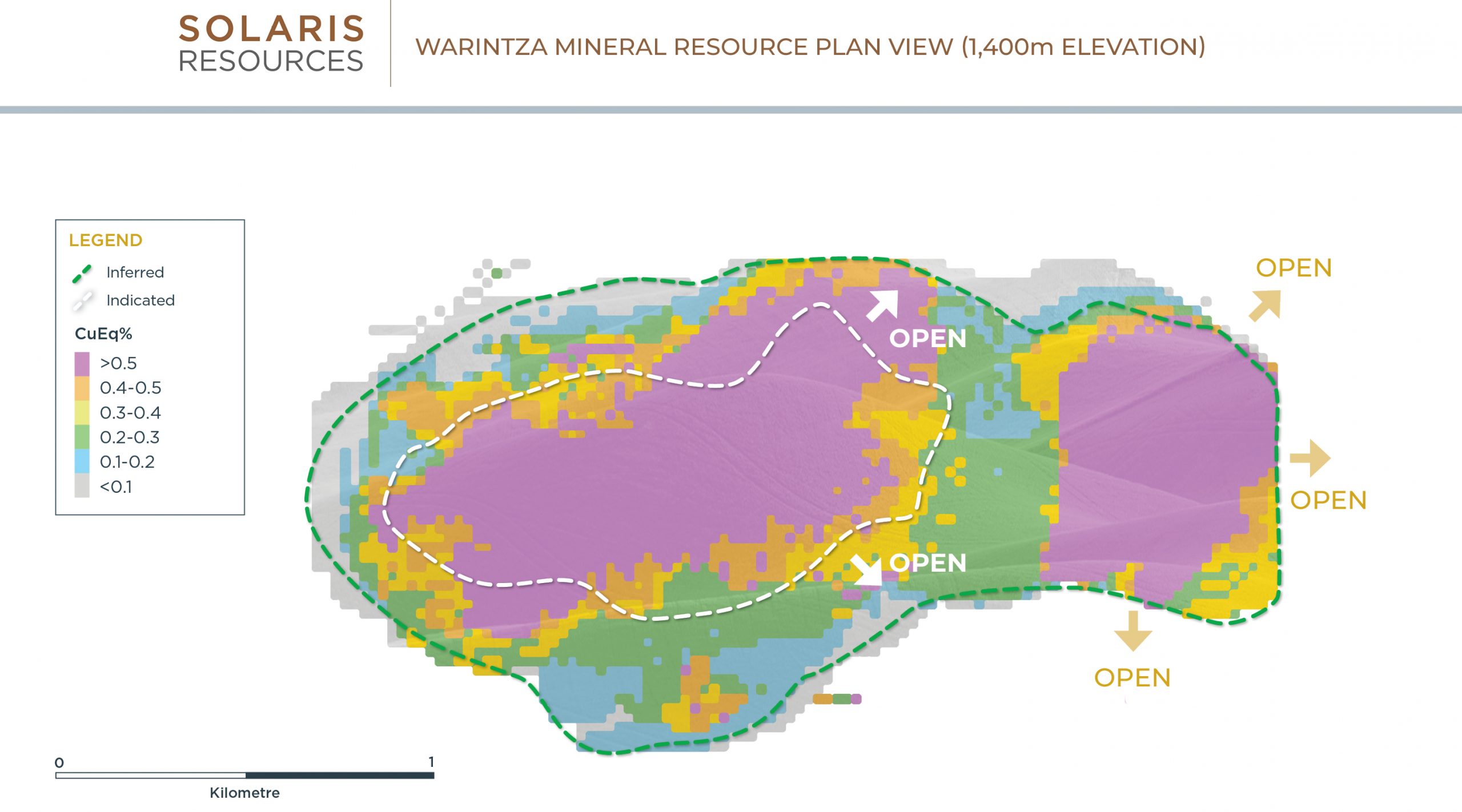

Highlights from the Warintza Central mineral resource update are as follows:
- In-Pit Indicated mineral resources of 579 million tonnes (“Mt”) at 0.59% copper equivalent¹ (“CuEq”) and Inferred mineral resources of 887 Mt at 0.47% CuEq¹ above a 0.3% CuEq cut-off grade
- Includes ‘Indicative Starter Pit’ comprised of Indicated mineral resources of 180 Mt at 0.82% CuEq² and Inferred mineral resources of 107 Mt at 0.73% CuEq² above 0.6% CuEq cut-off grade
- High Quality – Expected low strip ratio ‘Indicative Starter Pit’ and ultimate pit, zoned from high-grade at surface to low grade at depth, consistent, clean sulphide mineralogy free of deleterious elements
- High-Grade Growth – Ongoing drilling focused on open extensions of near surface, high-grade mineralization to the northeast and southeast of Warintza Central
- ‘Super Pit’ Growth – Warintza Central pit shell includes overlapping portion of Warintza East, discovered mid-2021, a target wide open for major growth potential within a shared pit
- Cluster Potential – Warintza Central forms part of a 7km x 5km cluster of porphyry deposits, where in addition to East, recent discoveries at West and South offer major growth potential
- Structural Advantages – Set within mining district featuring access to highway, abundant and low-cost hydroelectric power, fresh water, labour and low elevation
Source: Solaris Resources
The above references an opinion and is for information purposes only. It is not intended to be investment advice. Seek a licensed professional for investment advice. The author is not an insider or shareholder of any of the companies mentioned above.
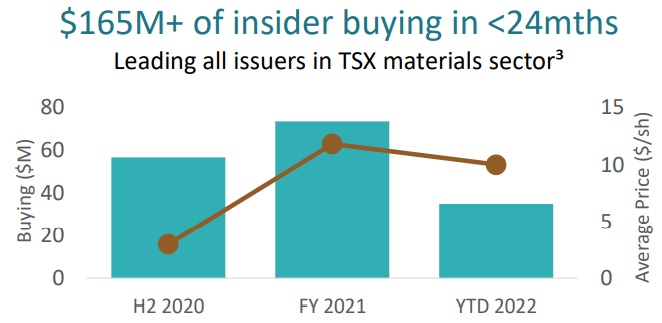

Insider buying at Solaris Resources (TSX:SLS) continues to show a large amount of stock being purchased throughout the last two years. On April 20, 2022, Richard Warke, Executive Chairman, bought C$35 million of Solaris stock through the exercise of 3,500,000 warrants. Warrants were set at $10 to buy 5 million shares of Solaris Resources from Equinox Gold. The warrants would have expired on April 26th, 2022.
Christian Milau, CEO of Equinox Gold, stated: “As a strategic and supportive shareholder, Equinox Gold is pleased to accommodate Solaris in this transaction, which benefits both companies. The proceeds from this sale will further strengthen Equinox Gold’s already solid balance sheet as we continue to execute on our expansion and growth objectives.”
A recent mineral resource update and the ongoing success of the drill program at Warintza may have insiders optimistic about the future of the company since they have been net buyers of shares since the IPO. The total insider shareholding of any given company gives investors an overall view of whether management and other inside investors are aligned with other shareholders.


Sunny Lowe, CFO of Solaris Resources (TSX:SLS), also purchased approximately C$100K in Solaris shares on the open market on Monday, April 25th, 2022. Total insider investment has reached over C$165 million in less than 24 months now, demonstrating a significant amount of confidence in the company by those in charge of its success. In the TSX materials sector, this places Solaris Resources (TSX:SLS) in the lead for insider buying. The company has seen strong interest in the stock since its IPO, up nearly 700%.
The above references an opinion and is for information purposes only. It is not intended to be investment advice. Seek a licensed professional for investment advice. The author is not an insider or shareholder of any of the companies mentioned above.
Solaris Resources (TSX:SLS) (OTC:SLSSF) has announced a highly-anticipated mineral resource update to Warintza Central at the Warintza Project in Ecuador. The company reported in-pit resources of 579 Mt at 0.59% CuEq (Ind) & 887 Mt at 0.47% CuEq (Inf). This also includes an ‘indicative starter pit’ of 180 Mt at 0.82% CuEq (Ind) & 107 Mt at 0.73% CuEq (Inf). Additionally, the company is now targeting high-grade extensions and major growth in cluster.
Daniel Earle, President & CEO of Solaris Resources, commented in a press release: “After only eighteen months of drilling, primarily in Warintza Central, one of the four major discoveries made on the property to date, the MRE establishes baseline credentials for the Project of hosting a robust inventory, featuring a high-grade indicative starter pit and low strip ratio, within a mining district offering major structural advantages from highway access, abundant and low-cost hydroelectric power, fresh water, labour and low elevation. Ongoing drilling is targeting further rapid growth, with an emphasis on the open extensions of near surface, high-grade mineralization at Warintza Central and expanding our recent Warintza East discovery to include it within a shared pit, while testing the further potential within the cluster.”
Highlights from the mineral resource update are as follows:
Highlights
- In-Pit Indicated mineral resources of 579 million tonnes (“Mt”) at 0.59% copper equivalent¹ (“CuEq”) and Inferred mineral resources of 887 Mt at 0.47% CuEq¹ above a 0.3% CuEq cut-off grade
- Includes ‘Indicative Starter Pit’ comprised of Indicated mineral resources of 180 Mt at 0.82% CuEq² and Inferred mineral resources of 107 Mt at 0.73% CuEq² above 0.6% CuEq cut-off grade
- High Quality – Expected low strip ratio ‘Indicative Starter Pit’ and ultimate pit, zoned from high-grade at surface to low grade at depth, consistent, clean sulphide mineralogy free of deleterious elements
- High-Grade Growth – Ongoing drilling focused on open extensions of near surface, high-grade mineralization to the northeast and southeast of Warintza Central
- ‘Super Pit’ Growth – Warintza Central pit shell includes overlapping portion of Warintza East, discovered mid-2021, a target wide open for major growth potential within a shared pit
- Cluster Potential – Warintza Central forms part of a 7km x 5km cluster of porphyry deposits, where in addition to East, recent discoveries at West and South offer major growth potential
- Structural Advantages – Set within mining district featuring access to highway, abundant and low-cost hydroelectric power, fresh water, labour and low elevation
Table 1: Warintza Mineral Resource Estimate Summary and Cut-Off Grade Sensitivity
| Cut-off | Category | Tonnage | Grade | Contained Metal | |||||||
| CuEq (%) |
(Mt) | CuEq (%) |
Cu (%) |
Mo (%) |
Au (g/t) |
CuEq (Mt) |
Cu (Mt) |
Mo (Mt) |
Au (Moz) |
||
| 0.2 | % | Indicated | 736 | 0.52 | 0.40 | 0.02 | 0.05 | 3.84 | 2.95 | 0.18 | 1.11 |
| Inferred | 1,558 | 0.37 | 0.31 | 0.01 | 0.03 | 5.80 | 4.80 | 0.19 | 1.63 | ||
| 0.3% (Base) | Indicated | 579 | 0.59 | 0.47 | 0.03 | 0.05 | 3.45 | 2.70 | 0.15 | 0.93 | |
| Inferred | 887 | 0.47 | 0.39 | 0.01 | 0.04 | 4.17 | 3.48 | 0.13 | 1.08 | ||
| 0.4 | % | Indicated | 442 | 0.67 | 0.54 | 0.03 | 0.05 | 2.97 | 2.38 | 0.12 | 0.77 |
| Inferred | 539 | 0.55 | 0.47 | 0.01 | 0.04 | 2.96 | 2.53 | 0.08 | 0.71 | ||
| ‘Indicative Starter Pit’ | |||||||||||
| 0.6 | % | Indicated | 180 | 0.82 | 0.67 | 0.03 | 0.07 | 1.49 | 1.20 | 0.06 | 0.38 |
| Inferred | 107 | 0.73 | 0.64 | 0.02 | 0.05 | 0.79 | 0.69 | 0.02 | 0.17 | ||
Notes to Table 1:
- The mineral resource estimates are reported in accordance with the CIM Definition Standards for Mineral Resources & Mineral Reserves, adopted by CIM Council May 10, 2014.
- Reasonable prospects for eventual economic extraction assume open-pit mining with conventional flotation processing and were tested using NPV Scheduler™ pit optimization software with the following assumptions: metal prices of US$3.50/lb Cu, US$15.00/lb Mo, and US$1,500/oz Au; operating costs of US$1.50/t + US$0.02/t per bench for mining, US$4.50/t milling, US$0.90/t G&A; recoveries of 90% Cu, 85% Mo, and 70% Au.
- Resource includes grade capping and internal dilution. Grade was interpolated by ordinary kriging populating a block model with block dimensions of 25m x 25m x 15m.
- The ‘Indicative Starter Pit’ is based on the same assumptions as the Resource except utilized metal prices of US$1.00/lb Cu, US$7.50/lb Mo, and US$750/oz Au. No economic analysis has been completed by the Company and there is no guarantee than an ‘Indicative Starter Pit’ will be realized or prove to be economic.
- Mineral resources that are not mineral reserves do not have demonstrated economic viability.
- Copper equivalent assumes recoveries of 90% Cu, 85% Mo, and 70% Au based on preliminary metallurgical testwork, and metal prices of US$3.50/lb Cu, US$15.00/lb Mo, and US$1,500/oz Au. CuEq formula: CuEq (%) = Cu (%) + 4.0476 × Mo (%) + 0.487 × Au (g/t).
- The Qualified Person is Mario E. Rossi, FAusIMM,RM-SME, Principal Geostatistician of Geosystems International Inc.
- All figures are rounded to reflect the relative accuracy of the estimate.
- The effective date of the mineral resource estimate is April 1, 2022.
The corresponding Technical Report disclosing the MRE in accordance with National Instrument 43-101 – Standards of Disclosure for Mineral Projects (“NI 43-101”) will be prepared by Mr. Rossi and available on SEDAR under the Company’s profile at www.sedar.com within 45 days of this news release.
- Copper equivalent assumes recoveries of 90% Cu, 85% Mo, and 70% Au based on preliminary metallurgical testwork, and metal prices of US$3.50/lb Cu, US$15.00/lb Mo, and US$1,500/oz Au. CuEq formula: CuEq (%) = Cu (%) + 4.0476 × Mo (%) + 0.487 × Au (g/t).
- The Company anticipates that a near surface, high grade portion of the Resource may form the basis of an ‘Indicative Starter Pit’ once an economic analysis of the Project is complete. No economic analysis has been completed by the Company and there is no guarantee an ‘Indicative Starter Pit’ will be realized or prove to be economic. The ‘Indicative Starter Pit’ is based on the same assumptions as the Resource except utilized metal prices of US$1.00/lb Cu, US$7.50/lb Mo, and US$750/oz Au.
Resource Estimation Methodology and Parameters
Indicated mineral resources were defined where the nominal drill hole spacing is 120m. The classification reflects not only the drill spacing, but the confidence level in the continuity of the grade and the geometry of the deposit. Inferred mineral resources were defined by blocks which were estimated with less stringent requirements within search ellipses defined for each domain to a maximum distance of 350m. Resources include grade capping and internal dilution. Grade was interpolated by ordinary kriging populating a block model with block dimensions of 25m x 25m x 15m. The Indicated and Inferred mineral resources are classified in a manner that is consistent with the May 10, 2014 CIM Definition Standards for Mineral Resources and Mineral Reserves. Mineral resources that are not mineral reserves do not have demonstrated economic viability. In Mr. Rossi’s opinion, there are currently no relevant factors or legal, political, environmental, or other risks that could materially affect the potential development of the mineral resources.
Source: Solaris Resources
Figure 1 – Warintza Mineral Resource Plan View (1,400m Elevation)
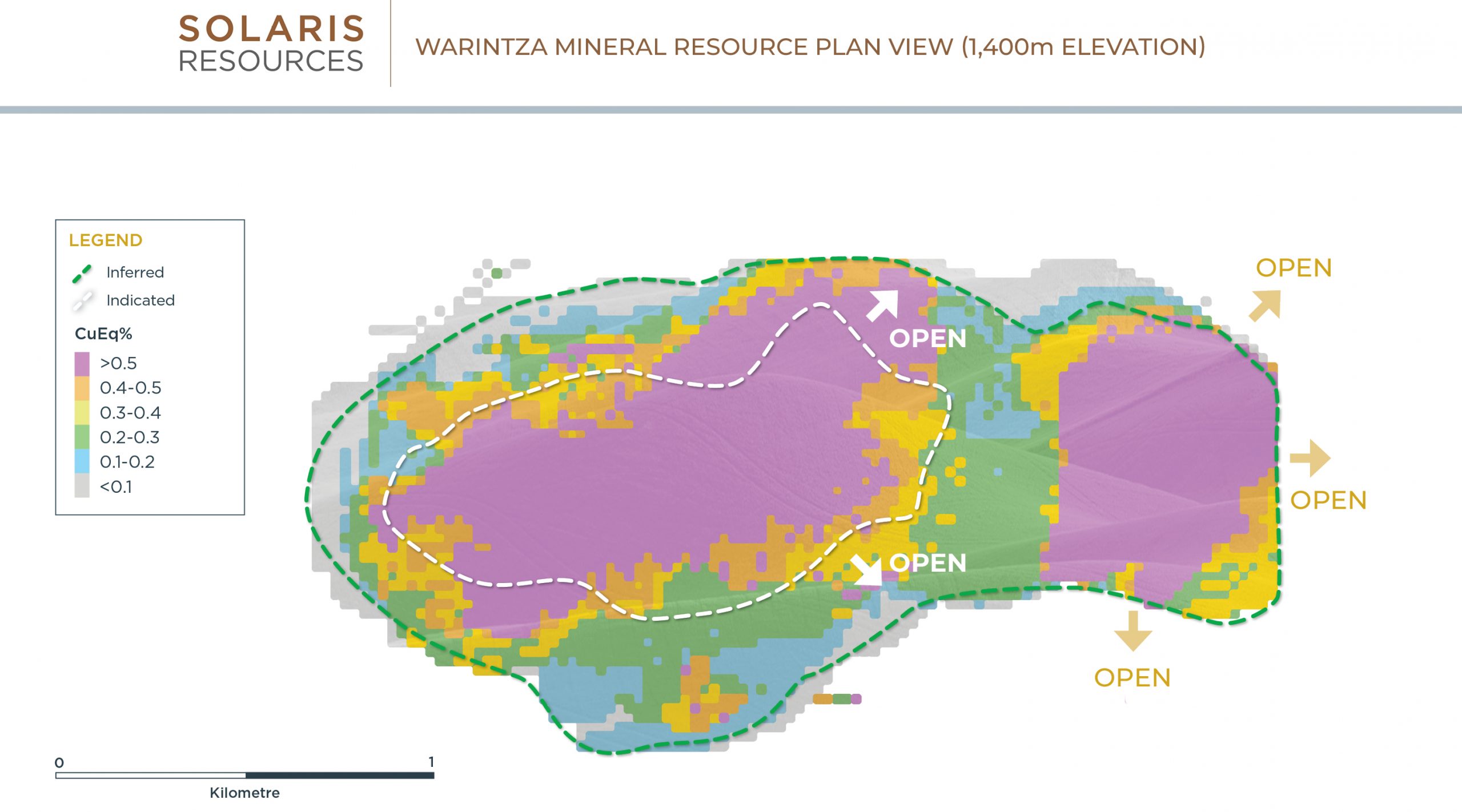

Figure 2 – Warintza Mineral Resource Long Section
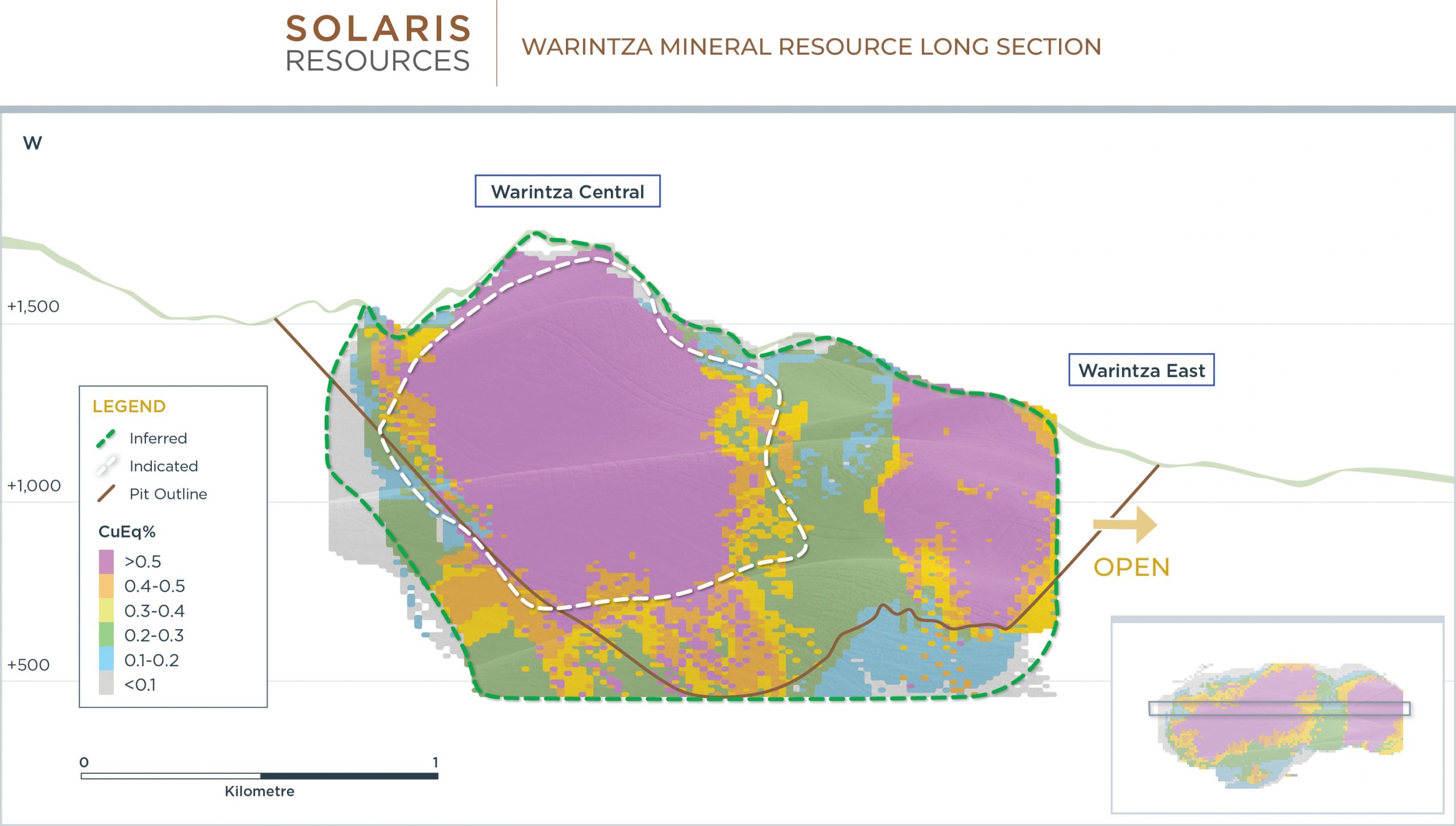

Figure 3 – Warintza Mineral Resource Cross Section
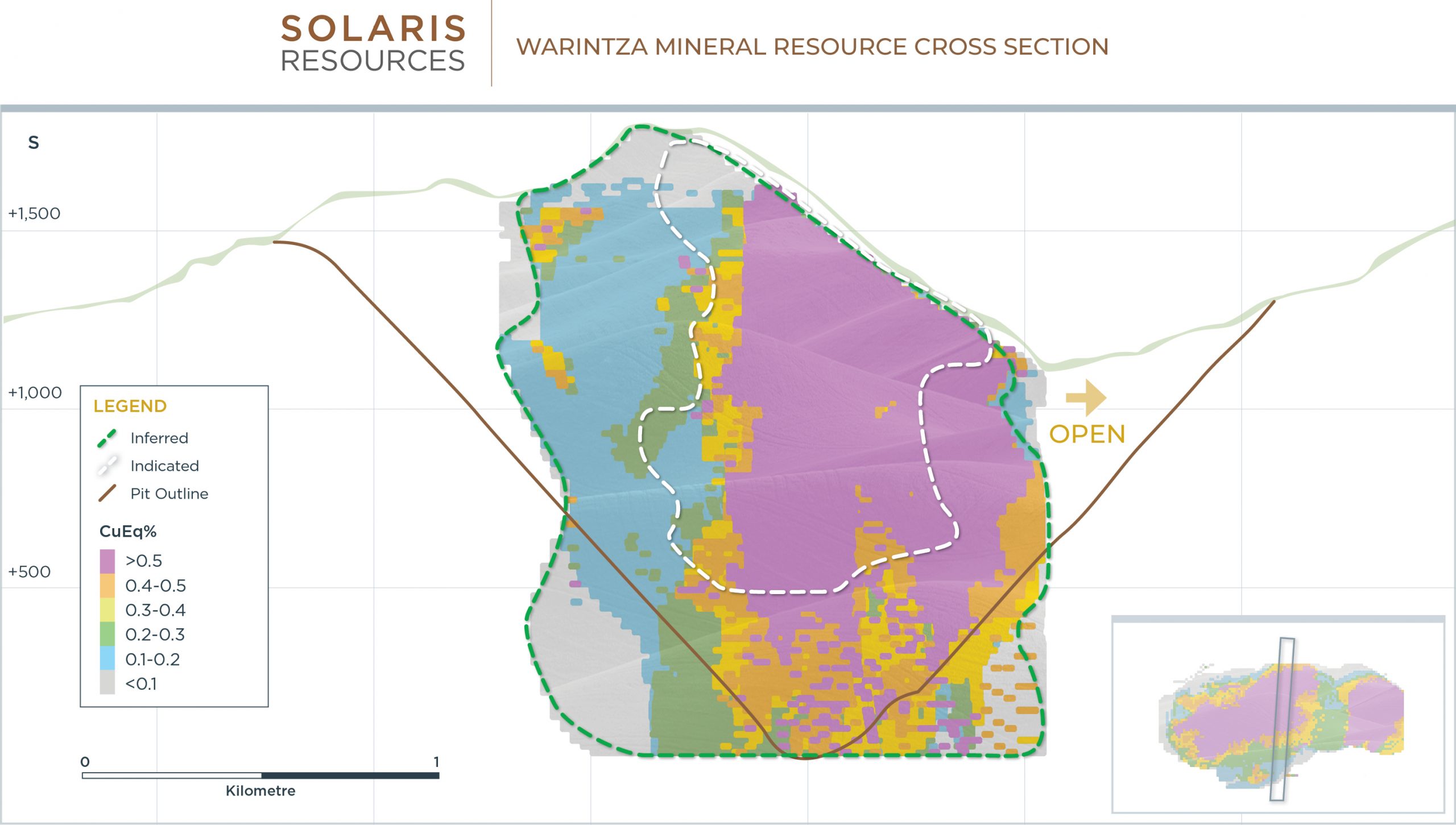

The above references an opinion and is for information purposes only. It is not intended to be investment advice. Seek a licensed professional for investment advice. The author is not an insider or shareholder of any of the companies mentioned above.
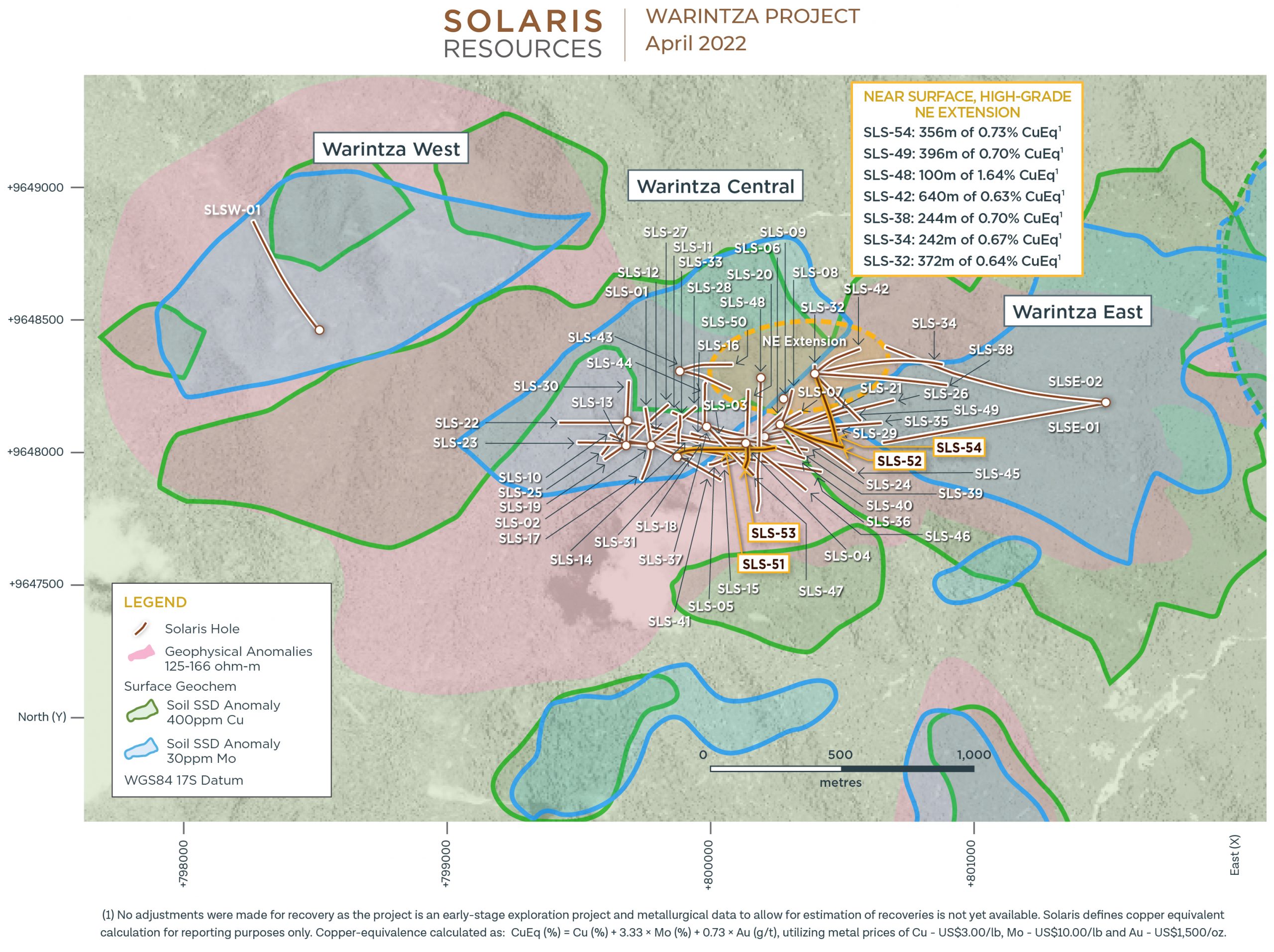


Solaris Resources (TSX:SLS) (OTC:SLSSF) has reported assay results from additional holes at Warintza Project as part of its mineral resources growth drilling. The company also recently added to near-surface, high-grade northeast and southeast extension. Solaris has said that the extension to the northeast and southeast are not priority targets and therefore will be targeted for further growth through step-out drilling.
Highlights from drilling are as follows:
Key Takeaways
Since the discovery of Warintza East in mid-2021, approximately 1km east of Warintza Central, limited drilling has been completed on the open area between the two deposits that would fall into the eastern sector of the conceptual pit design for Warintza Central as uncategorized waste – these results now establish continuity of mineralization between the two deposits with Warintza East remaining entirely open and undrilled to the north, south and east for future potential growth
- SLSE-06 was collared from the original platform in the middle of Warintza East and drilled west-northwest into an entirely open volume, returning 484m of 0.42% CuEq¹ from surface
- SLSE-08 was collared from the same platform and drilled northwest into an open volume, returning 142m of 0.65% CuEq¹ from near surface within a broader interval of 536m of 0.43% CuEq¹ from surface
- SLSE-04 was collared between Warintza Central and Warintza East and drilled west-southwest into a partially open volume, returning 616m of 0.63% CuEq¹ from 276m depth within a broader interval of 892m of 0.50% CuEq¹ from surface, establishing the overlap of the two deposits within the Warintza Central pit shell
- SLSE-03 was collared from the same platform and drilled west-northwest into a partially open volume, returning 326m of 0.62% CuEq¹ from 276m depth within a broader interval of 818m of 0.38% CuEq¹ from 38m depth, further confirming the overlap of the two deposits
- SLSE-05, collared from the same platform, was drilled north-northwest into a partially open area, returning 268m of 0.53% CuEq¹ from 446m depth within a broader interval of 714m of 0.32% CuEq¹ from surface
Updated Warintza Central Mineral Resource Estimate expected to be issued in April
To date, 62 holes have been completed at Warintza Central with assays reported for 54 of these and 8 holes have been completed at Warintza East with results reported for all holes
Mr. Jorge Fierro, Vice President, Exploration, commented: “Following the final Warintza Central results released April 4, these results represent the final holes from Warintza East to be included in the forthcoming mineral resource update, and serve to convert what would otherwise be uncategorized waste within the expected pit shell in the area where Warintza Central and Warintza East overlap.”
Table 1 – Assay Results
| Hole ID | Date Reported | From (m) | To (m) | Interval (m) | Cu (%) | Mo (%) | Au (g/t) | CuEq¹ (%) | ||
| SLSE-08 | Apr 11, 2022 | 8 | 544 | 536 | 0.35 | 0.02 | 0.04 | 0.43 | ||
| Including | 18 | 160 | 142 | 0.56 | 0.01 | 0.06 | 0.65 | |||
| SLSE-07 | 632 | 1069 | 437 | 0.29 | 0.02 | 0.04 | 0.37 | |||
| SLSE-06 | 0 | 484 | 484 | 0.33 | 0.02 | 0.04 | 0.42 | |||
| SLSE-05 | 0 | 714 | 714 | 0.26 | 0.01 | 0.05 | 0.32 | |||
| Including | 446 | 714 | 268 | 0.42 | 0.02 | 0.08 | 0.53 | |||
| SLSE-04 | 0 | 892 | 892 | 0.43 | 0.01 | 0.04 | 0.50 | |||
| Including | 276 | 892 | 616 | 0.54 | 0.02 | 0.04 | 0.63 | |||
| SLSE-03 | 38 | 856 | 818 | 0.29 | 0.02 | 0.03 | 0.38 | |||
| Including | 276 | 602 | 326 | 0.48 | 0.03 | 0.05 | 0.62 | |||
| SLS-54 | Apr 4, 2022 | 0 | 1093 | 1093 | 0.45 | 0.02 | 0.04 | 0.56 | ||
| Including | 50 | 406 | 356 | 0.62 | 0.02 | 0.05 | 0.73 | |||
| SLS-53 | 10 | 967 | 957 | 0.39 | 0.01 | 0.03 | 0.46 | |||
| Including | 16 | 192 | 176 | 0.65 | 0.03 | 0.04 | 0.78 | |||
| SLS-52 | 42 | 1019 | 977 | 0.39 | 0.01 | 0.03 | 0.45 | |||
| Including | 96 | 578 | 482 | 0.55 | 0.01 | 0.03 | 0.62 | |||
| SLS-51 | 36 | 1048 | 1012 | 0.38 | 0.01 | 0.06 | 0.47 | |||
| Including | 130 | 1048 | 918 | 0.41 | 0.01 | 0.05 | 0.50 | |||
| SLS-50 | 336 | 458 | 122 | 0.14 | 0.04 | 0.03 | 0.30 | |||
| SLS-49 | Feb 28, 2022 | 50 | 867 | 817 | 0.50 | 0.02 | 0.04 | 0.60 | ||
| SLS-48 | 50 | 902 | 852 | 0.45 | 0.02 | 0.05 | 0.56 | |||
| SLS-47 | 48 | 859 | 811 | 0.41 | 0.02 | 0.05 | 0.51 | |||
| SLS-46 | 48 | 680 | 632 | 0.27 | 0.01 | 0.03 | 0.31 | |||
| SLS-45 | 44 | 608 | 564 | 0.37 | 0.01 | 0.03 | 0.41 | |||
| SLS-44 | 6 | 524 | 518 | 0.16 | 0.05 | 0.03 | 0.35 | |||
| SLS-43 | 138 | 350 | 212 | 0.17 | 0.03 | 0.03 | 0.30 | |||
| SLS-42 | 52 | 958 | 906 | 0.42 | 0.02 | 0.06 | 0.53 | |||
| SLSS-01 | Jan 18, 2022 | 0 | 755 | 755 | 0.28 | 0.02 | 0.02 | 0.36 | ||
| SLS-41 | Dec 14, 2021 | 0 | 592 | 592 | 0.42 | 0.02 | 0.06 | 0.52 | ||
| SLS-40 | 8 | 1056 | 1048 | 0.39 | 0.01 | 0.03 | 0.46 | |||
| SLS-39 | 28 | 943 | 915 | 0.49 | 0.01 | 0.04 | 0.56 | |||
| SLS-38 | 58 | 880 | 822 | 0.28 | 0.01 | 0.05 | 0.35 | |||
| SLS-37 | 28 | 896 | 868 | 0.39 | 0.05 | 0.05 | 0.58 | |||
| SLS-36 | Nov 15, 2021 | 2 | 1082 | 1080 | 0.33 | 0.01 | 0.04 | 0.41 | ||
| SLS-35 | 48 | 968 | 920 | 0.53 | 0.02 | 0.04 | 0.62 | |||
| SLS-34 | Oct 25, 2021 | 52 | 712 | 660 | 0.36 | 0.02 | 0.06 | 0.47 | ||
| SLS-33 | 40 | 762 | 722 | 0.55 | 0.03 | 0.05 | 0.69 | |||
| SLSE-02 | 0 | 1160 | 1160 | 0.20 | 0.01 | 0.04 | 0.25 | |||
| SLS-32 | Oct 12, 2021 | 0 | 618 | 618 | 0.38 | 0.02 | 0.05 | 0.48 | ||
| SLS-31 | 8 | 1008 | 1000 | 0.68 | 0.02 | 0.07 | 0.81 | |||
| SLS-30 | 2 | 374 | 372 | 0.57 | 0.06 | 0.06 | 0.82 | |||
| SLSE-01 | Sep 27, 2021 | 0 | 1213 | 1213 | 0.21 | 0.01 | 0.03 | 0.28 | ||
| SLS-29 | Sep 7, 2021 | 6 | 1190 | 1184 | 0.58 | 0.02 | 0.05 | 0.68 | ||
| SLS-28 | 6 | 638 | 632 | 0.51 | 0.04 | 0.06 | 0.68 | |||
| SLS-27 | 22 | 484 | 462 | 0.70 | 0.04 | 0.08 | 0.91 | |||
| SLS-26 | July 7, 2021 | 2 | 1002 | 1000 | 0.51 | 0.02 | 0.04 | 0.60 | ||
| SLS-25 | 62 | 444 | 382 | 0.62 | 0.03 | 0.08 | 0.77 | |||
| SLS-24 | 10 | 962 | 952 | 0.53 | 0.02 | 0.04 | 0.62 | |||
| SLS-19 | 6 | 420 | 414 | 0.21 | 0.01 | 0.06 | 0.31 | |||
| SLS-23 | May 26, 2021 | 10 | 558 | 548 | 0.31 | 0.02 | 0.06 | 0.42 | ||
| SLS-22 | 86 | 324 | 238 | 0.52 | 0.03 | 0.06 | 0.68 | |||
| SLS-21 | 2 | 1031 | 1029 | 0.63 | 0.02 | 0.04 | 0.73 | |||
| SLS-20 | April 19, 2021 | 18 | 706 | 688 | 0.35 | 0.04 | 0.05 | 0.51 | ||
| SLS-18 | 78 | 875 | 797 | 0.62 | 0.05 | 0.06 | 0.83 | |||
| SLS-17 | 12 | 506 | 494 | 0.39 | 0.02 | 0.06 | 0.50 | |||
| SLS-16 | Mar 22, 2021 | 20 | 978 | 958 | 0.63 | 0.03 | 0.06 | 0.77 | ||
| SLS-15 | 2 | 1231 | 1229 | 0.48 | 0.01 | 0.04 | 0.56 | |||
| SLS-14 | 0 | 922 | 922 | 0.79 | 0.03 | 0.08 | 0.94 | |||
| SLS-13 | Feb 22, 2021 | 6 | 468 | 462 | 0.80 | 0.04 | 0.09 | 1.00 | ||
| SLS-12 | 22 | 758 | 736 | 0.59 | 0.03 | 0.07 | 0.74 | |||
| SLS-11 | 6 | 694 | 688 | 0.39 | 0.04 | 0.05 | 0.57 | |||
| SLS-10 | 2 | 602 | 600 | 0.83 | 0.02 | 0.12 | 1.00 | |||
| SLS-09 | 122 | 220 | 98 | 0.60 | 0.02 | 0.04 | 0.71 | |||
| SLSW-01 | Feb 16, 2021 | 32 | 830 | 798 | 0.25 | 0.02 | 0.02 | 0.31 | ||
| SLS-08 | Jan 14, 2021 | 134 | 588 | 454 | 0.51 | 0.03 | 0.03 | 0.62 | ||
| SLS-07 | 0 | 1067 | 1067 | 0.49 | 0.02 | 0.04 | 0.60 | |||
| SLS-06 | Nov 23, 2020 | 8 | 892 | 884 | 0.50 | 0.03 | 0.04 | 0.62 | ||
| SLS-05 | 18 | 936 | 918 | 0.43 | 0.01 | 0.04 | 0.50 | |||
| SLS-04 | 0 | 1004 | 1004 | 0.59 | 0.03 | 0.05 | 0.71 | |||
| SLS-03 | Sep 28, 2020 | 4 | 1014 | 1010 | 0.59 | 0.02 | 0.10 | 0.71 | ||
| SLS-02 | 0 | 660 | 660 | 0.79 | 0.03 | 0.10 | 0.97 | |||
| SLS-01 | Aug 10, 2020 | 1 | 568 | 567 | 0.80 | 0.04 | 0.10 | 1.00 | ||
| Notes to table: True widths cannot be determined at this time. | ||||||||||
Table 2 – Collar Location
| Hole ID | Easting | Northing | Elevation (m) | Depth (m) | Azimuth (degrees) | Dip (degrees) |
| SLSE-08 | 801485 | 9648192 | 1170 | 959 | 305 | -70 |
| SLSE-07 | 800749 | 9648146 | 1282 | 1069 | 84 | -50 |
| SLSE-06 | 801485 | 9648192 | 1170 | 1078 | 285 | -55 |
| SLSE-05 | 800749 | 9648146 | 1282 | 737 | 330 | -65 |
| SLSE-04 | 800749 | 9648146 | 1282 | 893 | 257 | -45 |
| SLSE-03 | 800749 | 9648146 | 1282 | 909 | 270 | -45 |
| Notes to table: The coordinates are in WGS84 17S Datum. | ||||||
(1) No adjustments were made for recovery as the project is an early-stage exploration project and metallurgical data to allow for estimation of recoveries is not yet available. Solaris defines copper equivalent calculation for reporting purposes only. Copper-equivalence calculated as: CuEq (%) = Cu (%) + 3.33 × Mo (%) + 0.73 × Au (g/t), utilizing metal prices of Cu – US$3.00/lb, Mo – US$10.00/lb and Au – US$1,500/oz.
Source: Solaris Resources
The above references an opinion and is for information purposes only. It is not intended to be investment advice. Seek a licensed professional for investment advice. The author is not an insider or shareholder of any of the companies mentioned above.



Solaris Resources (TSX:SLS) has reported assay results from a series of additional holes from mineral resource growth drilling at its Warintza Project in southeastern Ecuador. The results highlighted expansion of the growing northeastern extension area, and that drilling has expanded the southeastern extension area. The southeastern extension remains open in near surface, high-grade mineralization.
Mr. Jorge Fierro, Vice President of Exploration for Solaris, said in a press release: “These final holes expand on two key growth areas with near surface, high-grade mineralization on the edge of resource drilling that remains open. These holes will be included in the forthcoming resource update; further extensions to the northeast and southeast represent priority targets for further growth with step-out drilling commencing shortly.”
On top of the exciting assay results, the company has noted that an updated Warintza Central Mineral Resource Estimate is expected to be issued in April. This is a highly anticipated catalyst for the company and the Warintza Project.
Highlights
Additional drilling has expanded the growing northeast extension area, which remains open with follow-up and step-out drilling underway. This zone is characterized by near surface, high-grade mineralization, as detailed below, at the northeastern limit of drilling at Warintza Central and represents a priority target for further growth.
- SLS-54 was collared at the northeastern limit of the grid and drilled into an open volume near surface, returning 356m of 0.73% CuEq¹ from 50m depth within a broader interval of 1,093m of 0.56% CuEq¹ from surface
- This follows from near surface, high-grade mineralization previously reported (refer to press releases dated February 28, 2022, December 14, 2021 and October 25 & 12, 2021) from:
- SLS-49 – 396m of 0.70% CuEq¹ from 50m depth within 817m of 0.60% CuEq¹
- SLS-48 – 100m of 1.64% CuEq¹ from 50m depth within 852m of 0.56% CuEq¹
- SLS-42 – 740m of 0.60% CuEq¹ from 52m depth within 906m of 0.53% CuEq¹
- SLS-38 – 244m of 0.70% CuEq¹ from 58m depth within 822m of 0.35% CuEq¹
- SLS-34 – 242m of 0.67% CuEq¹ from 52m depth within 660m of 0.47% CuEq¹
- SLS-32 – 372m of 0.64% CuEq¹ from 46m depth within 618m of 0.48% CuEq¹
- Follow-up drilling from existing platforms is underway, with a 260m northeast step-out platform recently completed and a second platform stepping out further to the northeast under construction
Additional drilling has expanded the growing southeast extension area, which remains open in near surface, high-grade mineralization.
- SLS-52 was collared on the eastern side of the grid and drilled southeast into an open volume near surface, returning 482m of 0.62% CuEq¹ from 96m depth, within a broader interval of 977m of 0.45% CuEq¹ from near surface that infilled drilling at depth
- SLS-53 was collared from a southeastern platform and drilled south into an open volume near surface, returning 176m of 0.78% CuEq¹ from 16m depth, within a broader interval of 957m of 0.46% CuEq¹ from 10m depth that infilled drilling at depth
- This follows from near surface, high-grade mineralization previously reported (refer to press releases dated February 28, 2022, December 14, 2021 and November 15, 2021) from:
- SLS-45 – 236m of 0.56% CuEq¹ from 44m depth within 564m of 0.41% CuEq¹
- SLS-39 – 368m of 0.73% CuEq¹ from 90m depth within 915m of 0.56% CuEq¹
- SLS-35 – 326m of 0.80% CuEq¹ from 50m depth within 920m of 0.62% CuEq¹
- Additional platform construction to support follow-up and step-out drilling to test the further southeast extension of near surface, high-grade mineralization is planned, following the release of the updated mineral resource estimate
- SLS-51 was collared from the south-central portion of the grid and drilled east into an open volume at surface, returning 918m of 0.50% CuEq¹ from 130m depth within a broader interval of 1,012m of 0.47% CuEq¹ from near surface that infilled drilling at depth
Updated Warintza Central Mineral Resource Estimate expected to be issued in April.
To date, 62 holes have been completed at Warintza Central with assays reported for 54 of these.
Table 1 – Assay Results
| Hole ID | Date Reported | From (m) | To (m) | Interval (m) | Cu (%) | Mo (%) | Au (g/t) | CuEq¹ (%) | ||
| SLS-54 | Apr 4, 2022 | 0 | 1093 | 1093 | 0.45 | 0.02 | 0.04 | 0.56 | ||
| Including | 50 | 406 | 356 | 0.62 | 0.02 | 0.05 | 0.73 | |||
| SLS-53 | 10 | 967 | 957 | 0.39 | 0.01 | 0.03 | 0.46 | |||
| Including | 16 | 192 | 176 | 0.65 | 0.03 | 0.04 | 0.78 | |||
| SLS-52 | 42 | 1019 | 977 | 0.39 | 0.01 | 0.03 | 0.45 | |||
| Including | 96 | 578 | 482 | 0.55 | 0.01 | 0.03 | 0.62 | |||
| SLS-51 | 36 | 1048 | 1012 | 0.38 | 0.01 | 0.06 | 0.47 | |||
| Including | 130 | 1048 | 918 | 0.41 | 0.01 | 0.05 | 0.50 | |||
| SLS-50 | 336 | 458 | 122 | 0.14 | 0.04 | 0.03 | 0.30 | |||
| SLS-49 | Feb 28, 2022 | 50 | 867 | 817 | 0.50 | 0.02 | 0.04 | 0.60 | ||
| SLS-48 | 50 | 902 | 852 | 0.45 | 0.02 | 0.05 | 0.56 | |||
| SLS-47 | 48 | 859 | 811 | 0.41 | 0.02 | 0.05 | 0.51 | |||
| SLS-46 | 48 | 680 | 632 | 0.27 | 0.01 | 0.03 | 0.31 | |||
| SLS-45 | 44 | 608 | 564 | 0.37 | 0.01 | 0.03 | 0.41 | |||
| SLS-44 | 6 | 524 | 518 | 0.16 | 0.05 | 0.03 | 0.35 | |||
| SLS-43 | 138 | 350 | 212 | 0.17 | 0.03 | 0.03 | 0.30 | |||
| SLS-42 | 52 | 958 | 906 | 0.42 | 0.02 | 0.06 | 0.53 | |||
| SLSS-01 | Jan 18, 2022 | 0 | 755 | 755 | 0.28 | 0.02 | 0.02 | 0.36 | ||
| SLS-41 | Dec 14, 2021 | 0 | 592 | 592 | 0.42 | 0.02 | 0.06 | 0.52 | ||
| SLS-40 | 8 | 1056 | 1048 | 0.39 | 0.01 | 0.03 | 0.46 | |||
| SLS-39 | 28 | 943 | 915 | 0.49 | 0.01 | 0.04 | 0.56 | |||
| SLS-38 | 58 | 880 | 822 | 0.28 | 0.01 | 0.05 | 0.35 | |||
| SLS-37 | 28 | 896 | 868 | 0.39 | 0.05 | 0.05 | 0.58 | |||
| SLS-36 | Nov 15, 2021 | 2 | 1082 | 1080 | 0.33 | 0.01 | 0.04 | 0.41 | ||
| SLS-35 | 48 | 968 | 920 | 0.53 | 0.02 | 0.04 | 0.62 | |||
| SLS-34 | Oct 25, 2021 | 52 | 712 | 660 | 0.36 | 0.02 | 0.06 | 0.47 | ||
| SLS-33 | 40 | 762 | 722 | 0.55 | 0.03 | 0.05 | 0.69 | |||
| SLSE-02 | 0 | 1160 | 1160 | 0.20 | 0.01 | 0.04 | 0.25 | |||
| SLS-32 | Oct 12, 2021 | 0 | 618 | 618 | 0.38 | 0.02 | 0.05 | 0.48 | ||
| SLS-31 | 8 | 1008 | 1000 | 0.68 | 0.02 | 0.07 | 0.81 | |||
| SLS-30 | 2 | 374 | 372 | 0.57 | 0.06 | 0.06 | 0.82 | |||
| SLSE-01 | Sep 27, 2021 | 0 | 1213 | 1213 | 0.21 | 0.01 | 0.03 | 0.28 | ||
| SLS-29 | Sep 7, 2021 | 6 | 1190 | 1184 | 0.58 | 0.02 | 0.05 | 0.68 | ||
| SLS-28 | 6 | 638 | 632 | 0.51 | 0.04 | 0.06 | 0.68 | |||
| SLS-27 | 22 | 484 | 462 | 0.70 | 0.04 | 0.08 | 0.91 | |||
| SLS-26 | July 7, 2021 | 2 | 1002 | 1000 | 0.51 | 0.02 | 0.04 | 0.60 | ||
| SLS-25 | 62 | 444 | 382 | 0.62 | 0.03 | 0.08 | 0.77 | |||
| SLS-24 | 10 | 962 | 952 | 0.53 | 0.02 | 0.04 | 0.62 | |||
| SLS-19 | 6 | 420 | 414 | 0.21 | 0.01 | 0.06 | 0.31 | |||
| SLS-23 | May 26, 2021 | 10 | 558 | 548 | 0.31 | 0.02 | 0.06 | 0.42 | ||
| SLS-22 | 86 | 324 | 238 | 0.52 | 0.03 | 0.06 | 0.68 | |||
| SLS-21 | 2 | 1031 | 1029 | 0.63 | 0.02 | 0.04 | 0.73 | |||
| SLS-20 | April 19, 2021 | 18 | 706 | 688 | 0.35 | 0.04 | 0.05 | 0.51 | ||
| SLS-18 | 78 | 875 | 797 | 0.62 | 0.05 | 0.06 | 0.83 | |||
| SLS-17 | 12 | 506 | 494 | 0.39 | 0.02 | 0.06 | 0.50 | |||
| SLS-16 | Mar 22, 2021 | 20 | 978 | 958 | 0.63 | 0.03 | 0.06 | 0.77 | ||
| SLS-15 | 2 | 1231 | 1229 | 0.48 | 0.01 | 0.04 | 0.56 | |||
| SLS-14 | 0 | 922 | 922 | 0.79 | 0.03 | 0.08 | 0.94 | |||
| SLS-13 | Feb 22, 2021 | 6 | 468 | 462 | 0.80 | 0.04 | 0.09 | 1.00 | ||
| SLS-12 | 22 | 758 | 736 | 0.59 | 0.03 | 0.07 | 0.74 | |||
| SLS-11 | 6 | 694 | 688 | 0.39 | 0.04 | 0.05 | 0.57 | |||
| SLS-10 | 2 | 602 | 600 | 0.83 | 0.02 | 0.12 | 1.00 | |||
| SLS-09 | 122 | 220 | 98 | 0.60 | 0.02 | 0.04 | 0.71 | |||
| SLSW-01 | Feb 16, 2021 | 32 | 830 | 798 | 0.25 | 0.02 | 0.02 | 0.31 | ||
| SLS-08 | Jan 14, 2021 | 134 | 588 | 454 | 0.51 | 0.03 | 0.03 | 0.62 | ||
| SLS-07 | 0 | 1067 | 1067 | 0.49 | 0.02 | 0.04 | 0.60 | |||
| SLS-06 | Nov 23, 2020 | 8 | 892 | 884 | 0.50 | 0.03 | 0.04 | 0.62 | ||
| SLS-05 | 18 | 936 | 918 | 0.43 | 0.01 | 0.04 | 0.50 | |||
| SLS-04 | 0 | 1004 | 1004 | 0.59 | 0.03 | 0.05 | 0.71 | |||
| SLS-03 | Sep 28, 2020 | 4 | 1014 | 1010 | 0.59 | 0.02 | 0.10 | 0.71 | ||
| SLS-02 | 0 | 660 | 660 | 0.79 | 0.03 | 0.10 | 0.97 | |||
| SLS-01 | Aug 10, 2020 | 1 | 568 | 567 | 0.80 | 0.04 | 0.10 | 1.00 | ||
| Notes to table: True widths cannot be determined at this time. | ||||||||||
Table 2 – Collar Location
| Hole ID | Easting | Northing | Elevation (m) | Depth (m) | Azimuth (degrees) | Dip (degrees) |
| SLS-54 | 800383 | 9648303 | 1412 | 1093 | 160 | -74 |
| SLS-53 | 800126 | 9648032 | 1566 | 967 | 170 | -82 |
| SLS-52 | 800258 | 9648097 | 1559 | 1019 | 110 | -75 |
| SLS-51 | 799873 | 9648008 | 1632 | 1048 | 85 | -70 |
| SLS-50 | 799870 | 9648315 | 1414 | 768 | 80 | -75 |
| Notes to table: The coordinates are in WGS84 17S Datum. | ||||||
(1) No adjustments were made for recovery as the project is an early-stage exploration project and metallurgical data to allow for estimation of recoveries is not yet available. Solaris defines copper equivalent calculation for reporting purposes only. Copper-equivalence calculated as: CuEq (%) = Cu (%) + 3.33 × Mo (%) + 0.73 × Au (g/t), utilizing metal prices of Cu – US$3.00/lb, Mo – US$10.00/lb and Au – US$1,500/oz.
Source: Solaris Resources
The above references an opinion and is for information purposes only. It is not intended to be investment advice. Seek a licensed professional for investment advice. The author is not an insider or shareholder of any of the companies mentioned above.
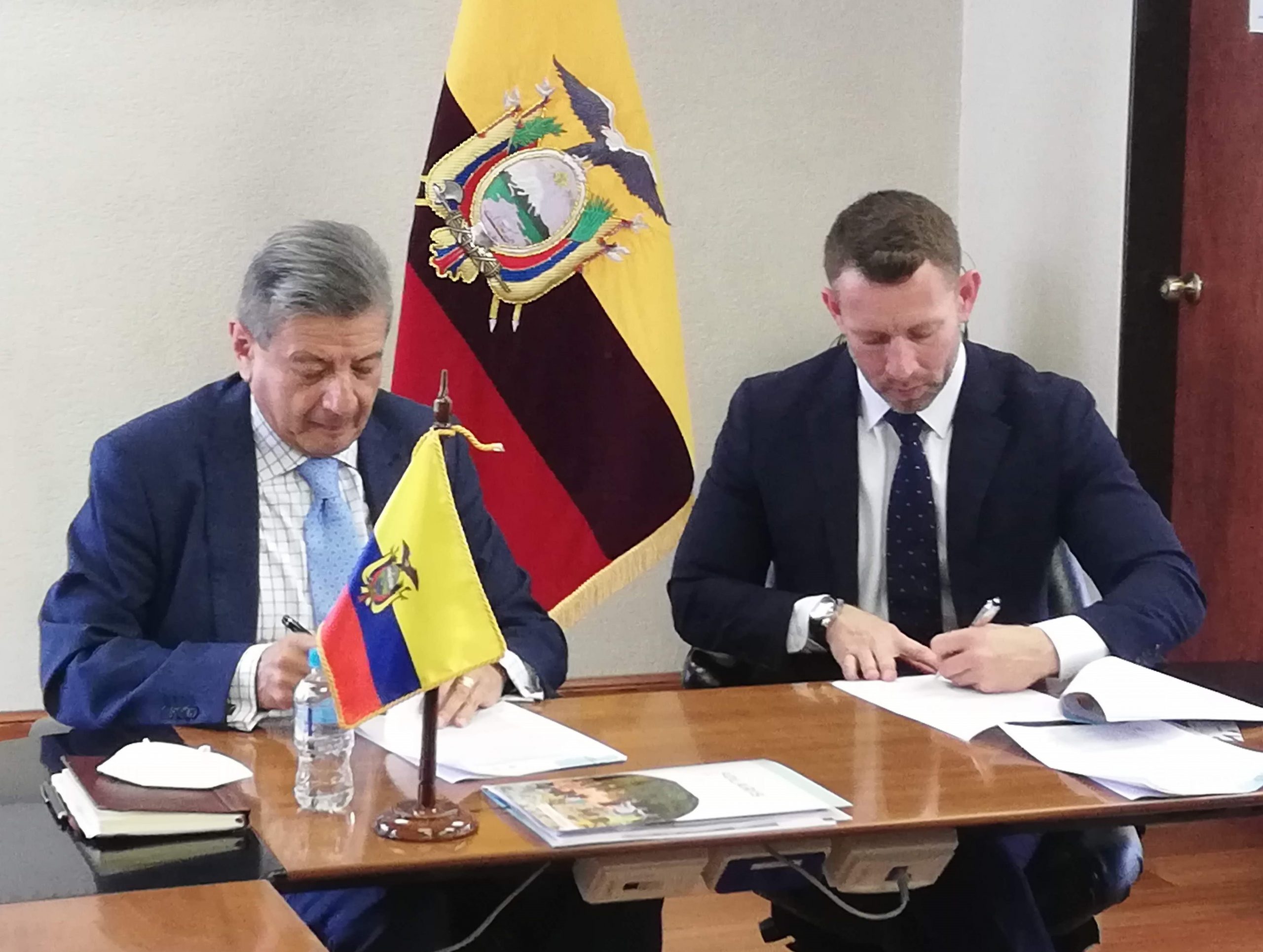

Solaris Resources (TSX:SLS) announced this morning the signing of a Memorandum of Understanding with Electric Corporation of Ecuador (CELEC) to provide low-cost, locally sourced hydroelectric power to the Warintza Project in southeastern Ecuador.
The Warintza Project is Solaris’ flagship exploration project, for which CELEC will provide locally-sourced hydroelectric power from the National Transmission System in Ecuador. This clean-power initiative will provide the primary power to the entire Warintza Project.
The adoption of this plan is aligned with the “Ecuador Zero Carbon Program” created by the Ministry of Environment, Water and Ecological Transition, as well as the National Decarbonization Pact, for which Solaris was one of the first mining signatories in September 2021.
Daniel Earle, President & CEO of Solaris Resources, commented in a press release: “The MOU with CELEC supports our vision to study the potential for electrified operations that maximize the structural benefits of the Warintza Project within an infrastructure-rich mining district with the aim of lowering costs, increasing efficiencies, reducing emissions, and broadly positioning the Project as a leading development opportunity across a range of financial and ESG metrics in the industry.”
Solaris aims to maximize the efficiency possibilities from this enormous, renewable, and low-cost energy source by investigating potential solutions for electrification of infrastructure, mobile mining equipment, including drills, trucks and shovels, material transportation and conveyance, such as gravity-assisted methods, and processing and pumping systems.
Mr. Gonzalo Uquillas Vallejo, General Manager of CELEC, also said: “As a leading strategic public company in the generation and transmission of electric power, we work in compliance with national guidelines to move toward the electrification of all areas of national industry, including large-scale mining, which will be a mainstay for the development of the Ecuadorian economy in the coming decades.”
Solaris has been singled out by the government for its commitment to best practices, and the Warintza Project is expected to set a new industry standard for low-cost, emission-free mining.
This announcement comes as good news for the Warintza Project and for Solaris Resources as a whole. Not only does it reduce the environmental impact of the project, but it also demonstrates Solaris’ commitment to working with the local community and government to create a sustainable future for all.
The above references an opinion and is for information purposes only. It is not intended to be investment advice. Seek a licensed professional for investment advice. The author is not an insider or shareholder of any of the companies mentioned above.
Copper exploration company Solaris Resources (TSX:SLS) recently announced new assay drilling results from its Warinzta project in southeastern Ecuador. These results come from additional holes that actually increased the size of the “drilled defined envelope of mineralization” at the Warinzta Central location.
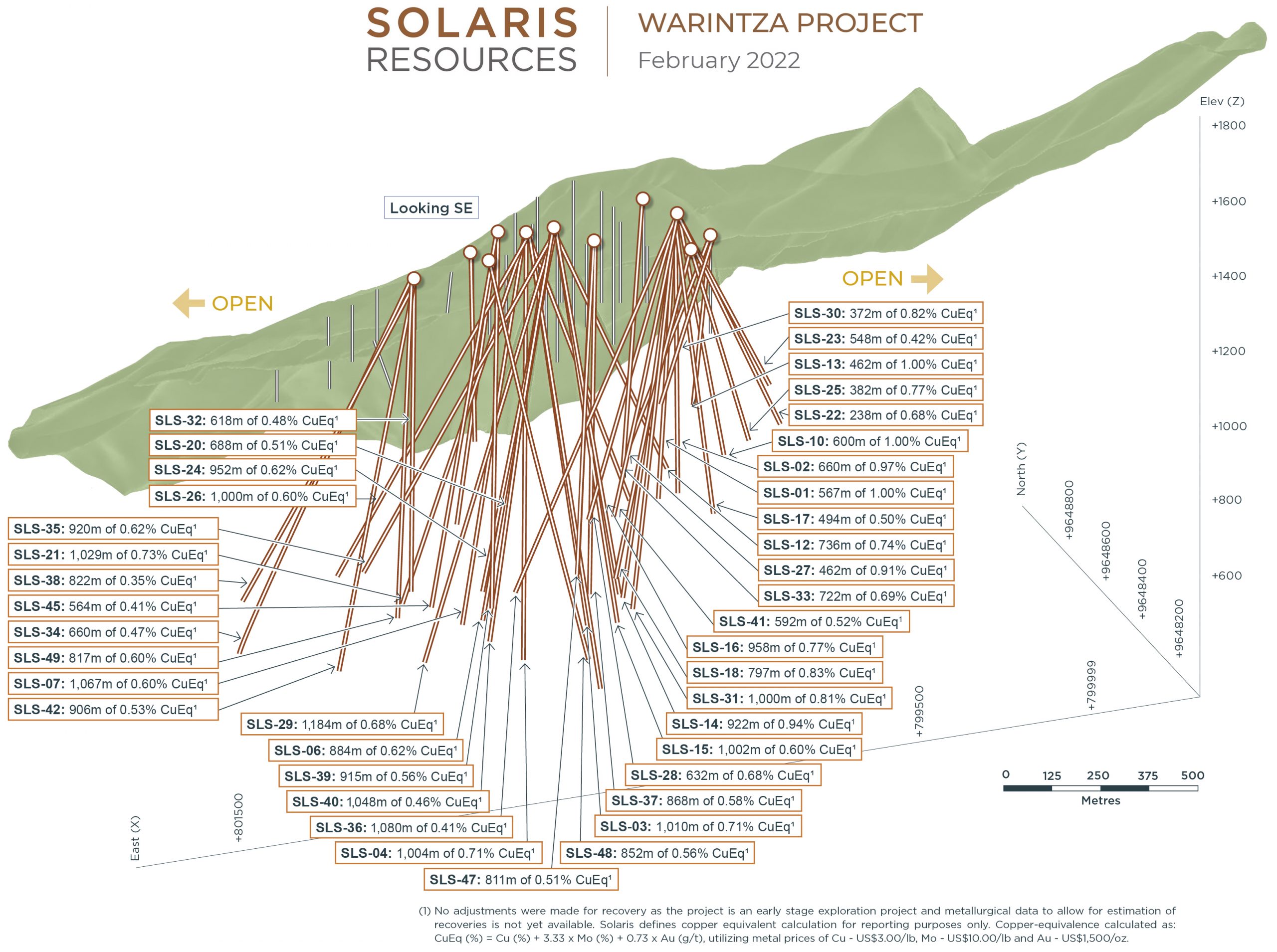

The drilling of these additional holes provided the area with the highest-grade intersection reported by Solaris to date, as well as high-grade extension to the northeast, south and southeast locations at the Warinzta project.
As of today, Solaris has completed drilling 58 holes at Warinzta, and 49 of those holes have assays already reported. Mr. Jorge Fierro, Vice President of Exploration of Solaris explained that the initial resource growth drilling program for Warinzta is finally completed and touched on future drilling plans.
“With this intensive program behind us, the focus of ongoing drilling has turned to pursuing the further extensions of near-surface, high-grade mineralization which remain open, with additional platforms allowing for more aggressive step-outs under construction,” said Fierro in a press release.
Highlights of the drilling from Solaris are as follows:
Drilling Returns Highest Grades Reported to Date in Emerging Northeast Extension that Remains Open:
- SLS-42 was collared at the northeastern limit of the grid and drilled northeast into an entirely open volume, returning 740m of 0.60% CuEq¹ from 52m depth within a broader interval of 906m of 0.53% CuEq¹, extending mineralization in this direction where it remains open
- SLS-49 was drilled southeast from the same platform and returned 396m of 0.70% CuEq¹ within a broader interval of 817m of 0.60% CuEq¹ from 50m depth, tying the northeast extension to the overlap between Warintza Central and East
- SLS-48, was collared in an undrilled area ~200m west of SLS-49 and drilled south, returning 100m of 1.64% CuEq¹ from 50m depth, the highest-grade mineralization reported to date, within a broader interval of 852m of 0.56% CuEq¹, extending the near surface high-grade mineralization to the west in that area
- These results expand Warintza Central by building on an emerging area of near surface, high-grade mineralization; follow-up drilling will pursue further growth by targeting the open areas to the north and northwest, with an additional platform being constructed to pursue further step-outs to the northeast
Drilling Extends Mineralization to Southeast that Remains Open:
- SLS-45 was collared on the eastern side of the grid and drilled southeast into an entirely open volume, returning 236m of 0.56% CuEq¹ from 44m depth within a broader interval of 564m of 0.41% CuEq¹, extending mineralization to the southeast where it remains open
- SLS-46 was collared from a southeastern platform and drilled southeast into a partially open volume, returning 168m of 0.69% CuEq¹ from 48m depth within a broader interval of 632m of 0.31% CuEq¹, extending mineralization in this direction where it remains open
- SLS-47 was collared in the middle of the grid and drilled southeast to infill this area, returning 446m of 0.70% CuEq¹ from 48m depth within a broader interval of 811m of 0.51% CuEq¹, with mineralization remaining open to the south
Figure 2 – Plan View of Warintza Drilling Released to Date
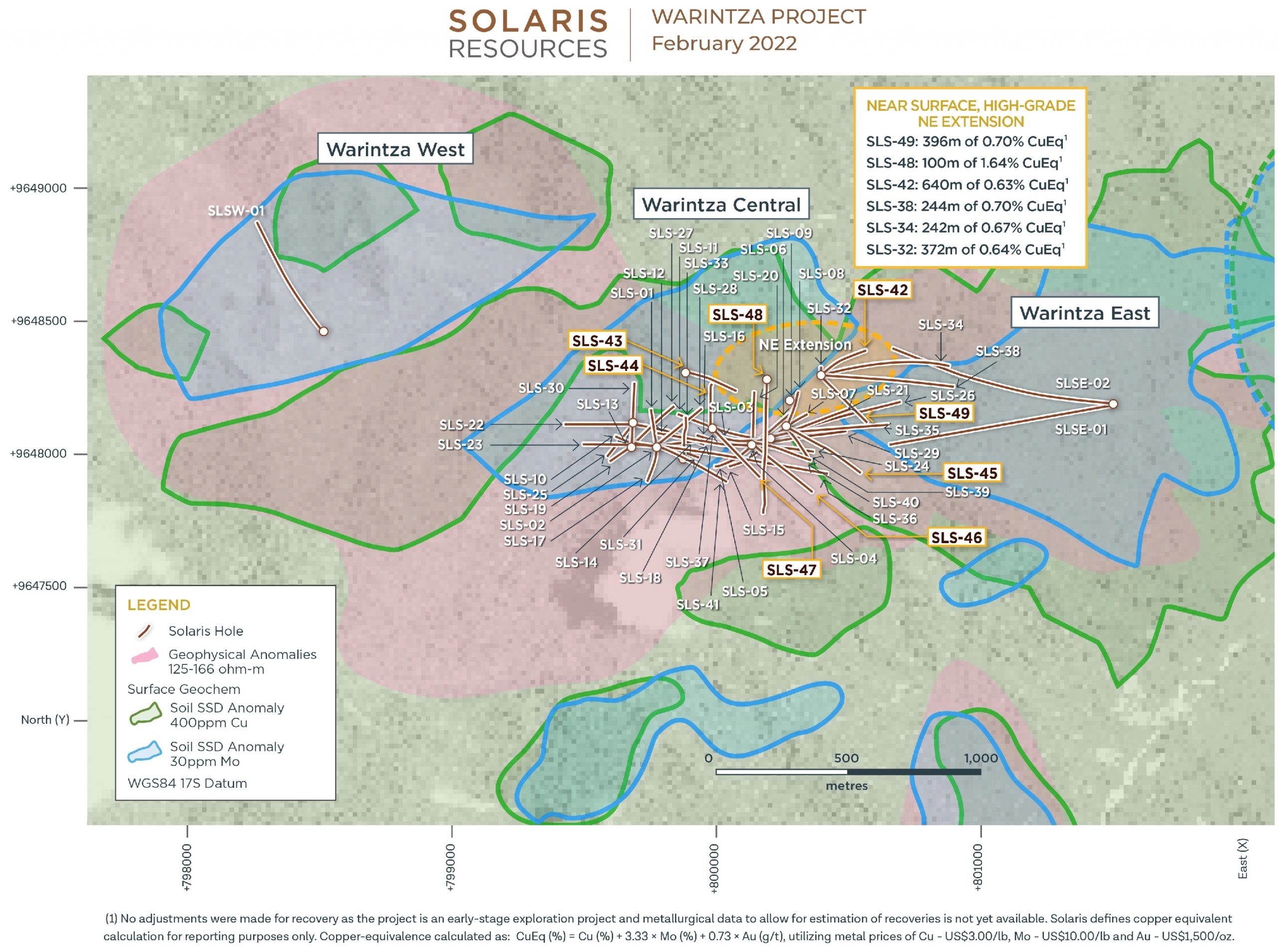

Figure 3 – Long Section of 3D Geophysics Looking Southwest
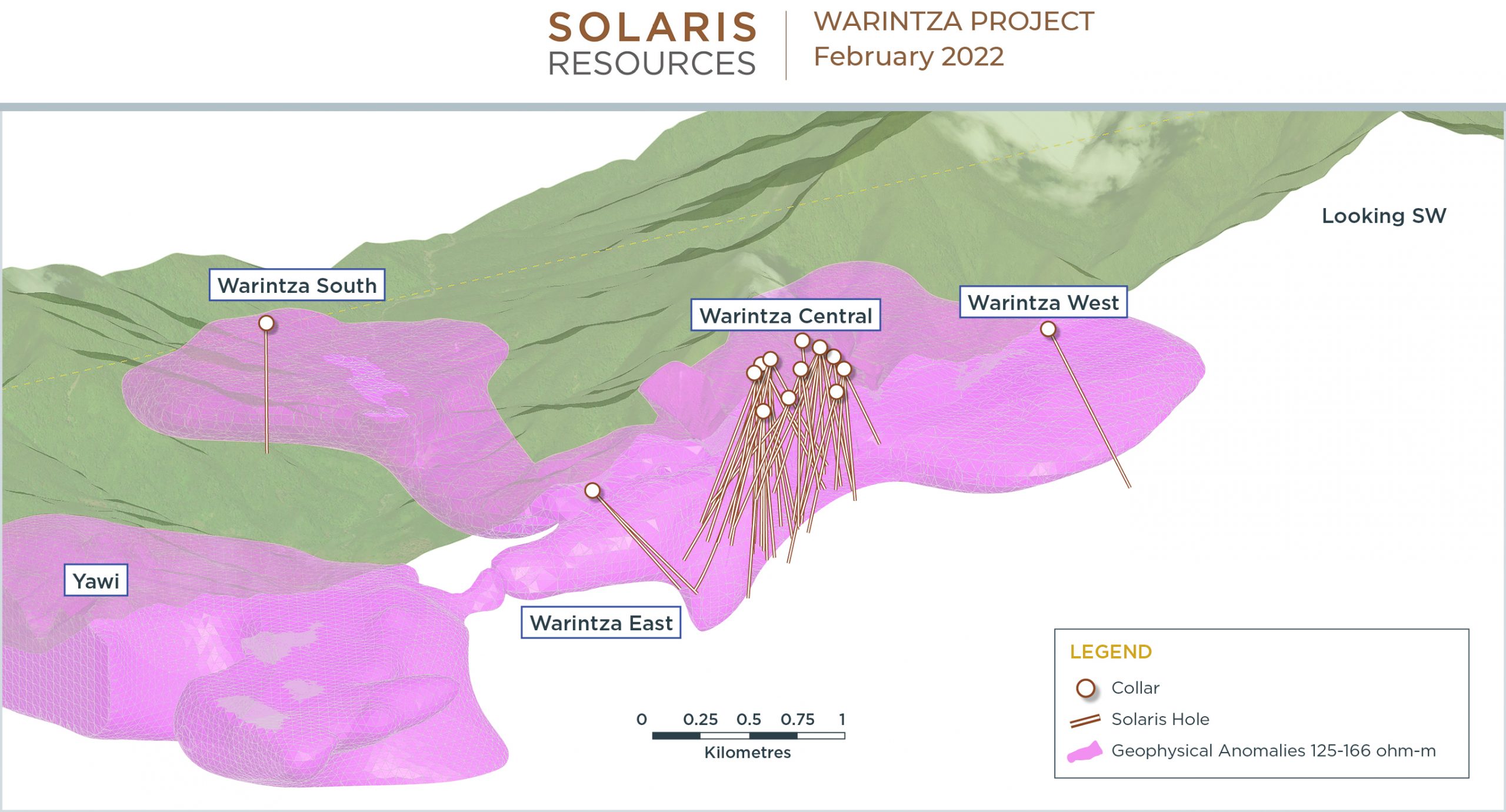

The above references an opinion and is for information purposes only. It is not intended to be investment advice. Seek a licensed professional for investment advice. The author is not an insider or shareholder of any of the companies mentioned above.
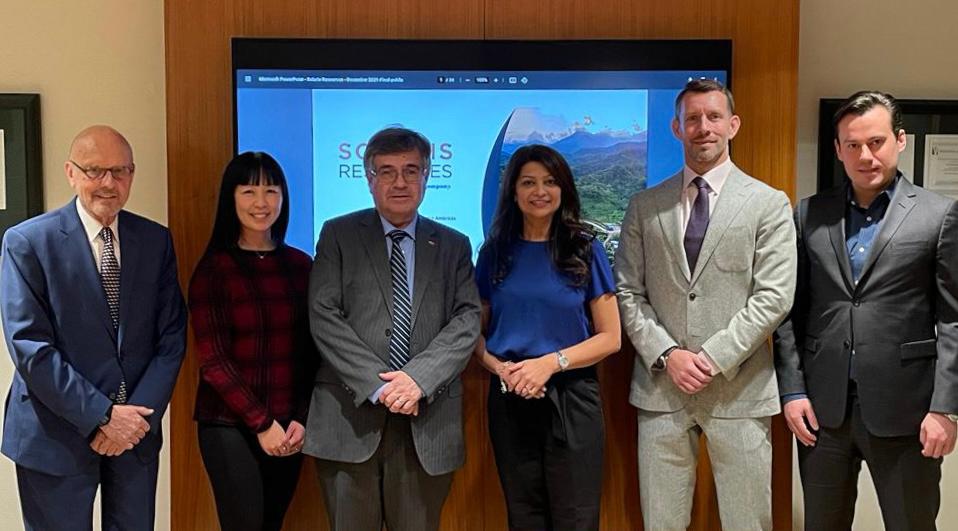

Bank of America (BofA) Global Research analysts have reported that beginning in 2025, the copper market will again suffer a deficit due to the lower number of projects currently underway.
Although global copper production by 2023 will increase by 7.7% after an expected shortfall in 2022, output will fall, due to the underperformance of new copper mine construction in recent years.
“While visibility over the near-term project pipeline is good, activity increases come with a wrinkle,” say the bank’s analysts. “Indeed, many of the projects currently developed have been in the making for almost three decades, and with exploration activity relatively limited in recent years, supply increases may fade from 2025.”
BofA predicts several drawbacks preventing copper production from growing. Edgar Blanco Rand, vice-minister of mining in Chile’s previous government, represented this data in a presentation during LME Week. His presentation showed a pipeline of projects planned for 2029 in Chile at a cost of $74 billion with the goal of achieving production of 7 million tons. Edgar Blanco pointed out a stagnation in production since 2000 with 5.7 million tons after 1990, a decade of rapid growth.
“This implies a capex intensity of around $50,000 per tonne, well above the $10,000 to 20,000 per tonne range seen in recent years. As an aggravating factor, the investment will need to be large enough to offset about 1.5 million tonnes of production losses,” says the bank.
The shortfall in copper production is beneficial to exploration companies because they have valuable projects that other companies are interested in acquiring in order to increase production.
Solaris Resources (TSX:SLS) is responsibly and sustainably pursuing a number of copper projects in the Americas. Its Warintza project, based in Ecuador, is a high-grade open-pit resource within a 7 km x 5 km porphyry copper cluster. The company is also working on discovery drilling at Tamarugo and Ricardo in Chile and Capricho and Paco Orco in Peru.
Warintza’s mining model is a participatory model that promotes state-company-community dialogue based on transparency, collaboration and trust, which contributes to the sustainable socio-economic development of the communities and the project.
For the copper market to continue to sustain steady production and high-quality projects, exploration companies like Solaris with projects like Warintza will become a priority and highly valuable to the major producers looking to grow output. As a result, this is a company that could be a significant part of the solution for this complex market problem.
The above references an opinion and is for information purposes only. It is not intended to be investment advice. Seek a licensed professional for investment advice. The author is not an insider or shareholder of any of the companies mentioned above.
This morning, Solaris Resources (TSX:SLS) announced a huge new discovery at the Warintza South target at the Warintza Project. Ongoing exploration has revealed multiple high-grade targets, and Warintza South is the latest in a string of discoveries at the project.
Mr. Jorge Fierro, Vice President, Exploration, Solaris Resources, said in a press release, “We are delighted to have made a significant new discovery at Warintza South, with the firstever hole returning a long interval of well mineralized copper porphyry. The multi-km dimensions of the target present a large-scale opportunity. Interpretation of the drill core together with recent mapping and sampling provide important vectors for follow-up drilling to be completed once additional access and infrastructure are established.”
The high-grade resource at Warintza has been the source of excitement for investors, as Solaris’ stock price has continued to rise throughout 2021 and 2022. The company recently spun out its non-core assets to focus on drilling at Warintza in Ecuador, but placed other projects in another entity including projects in Chile, Peru, and Mexico.
Solaris (TSX:SLS) is up 133% in the trailing twelve-month period ended January 18, 2022. The company continues to gather interest as a prime takeout target for a major mining company as the copper mining industry struggles to keep up with growing demand due to the green energy transition. For Solaris Resources’ Warintza project, that means high potential for a producer to direct its interest toward the company in the future as it continues toward an updated resource in 2022.
Highlights from Warintza South:
- SLSS-01 was the first hole ever drilled at Warintza South, which is an entirely separate porphyry deposit, located approximately 3kms south of the Warintza Central zone that has been the focus of the Company’s resource expansion drilling efforts to date
- SLSS-01 was drilled vertically and returned 606m of 0.41% CuEq¹ of continuous porphyry copper mineralization from near surface, within a broader interval of 755m of 0.36% CuEq¹, marking a significant new discovery on the Project
- Warintza South is reflected by a high conductivity anomaly over twice the size of Warintza Central, illustrating the very broad proportions of this newly discovered porphyry system, with approximate dimensions of 2.5km x 2.0km x 0.7km
- SLSS-01 targeted an exposure of leached capping within this anomaly; an ongoing program of detailed sampling, including an additional 265 soil samples and 131 rock samples, significantly expanded the geochemical anomaly and shifted its core to the northeast (Figure 1)
- Follow-up drilling targeting the interpreted core of the porphyry system is set to commence after additional drill platforms are prepared based on this recent mapping and sampling work refining the target and a dedicated exploration camp is set up to support a ramp-up in activities
- Warintza South marks the fourth major copper discovery within the 7km x 5km Warintza porphyry cluster, with the adjacent Yawi and Caya targets still to be tested, as well as other recently generated targets within the broader land package to be revealed in a forthcoming update
Mr. Jorge Fierro, Vice President, Exploration, commented: “We are delighted to have made a significant new discovery at Warintza South, with the first ever hole returning a long interval of well mineralized copper porphyry. The multi-km dimensions of the target present a large-scale opportunity. Interpretation of the drill core together with recent mapping and sampling provide important vectors for follow-up drilling to be completed once additional access and infrastructure are established.”
Figure 1 – Plan View


Figure 2 – Long Section of 3D Geophysics Looking Southwest


Figure 3 – Long Section of Warintza South 3D Geophysics Looking Northeast


Figure 4 – SLSS-01 Drill Core


Notes to Figure 4: SLSS-01 core interval from 377.03 to 379.15m, averaging 0.74% Cu, 0.04% Mo and 0.05g/t Au. Quartz-diorite intermineral dike is cutting andestic volcanics. Alteration and mineralization is mainly composed of early-stage, halo-type associations with quartz, anhydrite, chlorite, biotite, epidote, pyrite, chalcopyrite, and magnetite cut by A- and B-type Mo-bearing quartz veinlets.
Table 1 – Warintza South Results
| Hole ID | Date Reported | From (m) | To (m) | Interval (m) | Cu (%) | Mo (%) | Au (g/t) | CuEq¹ (%) |
| SLSS-01 | Jan 18, 2022 | 0 | 755 | 755 | 0.28 | 0.02 | 0.02 | 0.36 |
| Including | 42 | 648 | 606 | 0.32 | 0.02 | 0.02 | 0.41 | |
| Including | 188 | 512 | 324 | 0.35 | 0.02 | 0.02 | 0.45 | |
| Notes to Table 1: True widths cannot be determined at this time. | ||||||||
Table 2 – Collar Location
| Hole ID | Easting | Northing | Elevation (m) | Depth (m) | Azimuth (degrees) | Dip (degrees) |
| SLSS-01 | 801494 | 9645194 | 1215 | 755 | 0 | -89 |
| Notes to Table 2: The coordinates are in WGS84 17S Datum. | ||||||
Source: Solaris Resources
The above references an opinion and is for information purposes only. It is not intended to be investment advice. Seek a licensed professional for investment advice. The author is not an insider or shareholder of any of the companies mentioned above.
Solaris Resources (TSX:SLS) has reported assay results from its ongoing drill program at its Warintza Project in Ecuador. The company is currently operating discovery drill programs and aiming for mineral resource growth at the project.
Solaris announced this morning that it has extended Warintza Central to South, Southeast, and still open, while announcing that drill results from maiden drilling at Warintza South are now expected in January 2022.
Mr. Jorge Fierro, Vice President, Exploration, commented in a press release: “These latest results continue to expand the dimensions of Warintza Central to the south and southeast where it remains open. Our next series of holes will target extensions to the north and northeast. In January, we are looking forward to the results of the first-ever drilling at Warintza South, where we are targeting the fourth major discovery within the 7km x 5km cluster of copper porphyries on this property.”
Figure 1 – Long Section of Warintza Central Drilling Looking Southeast
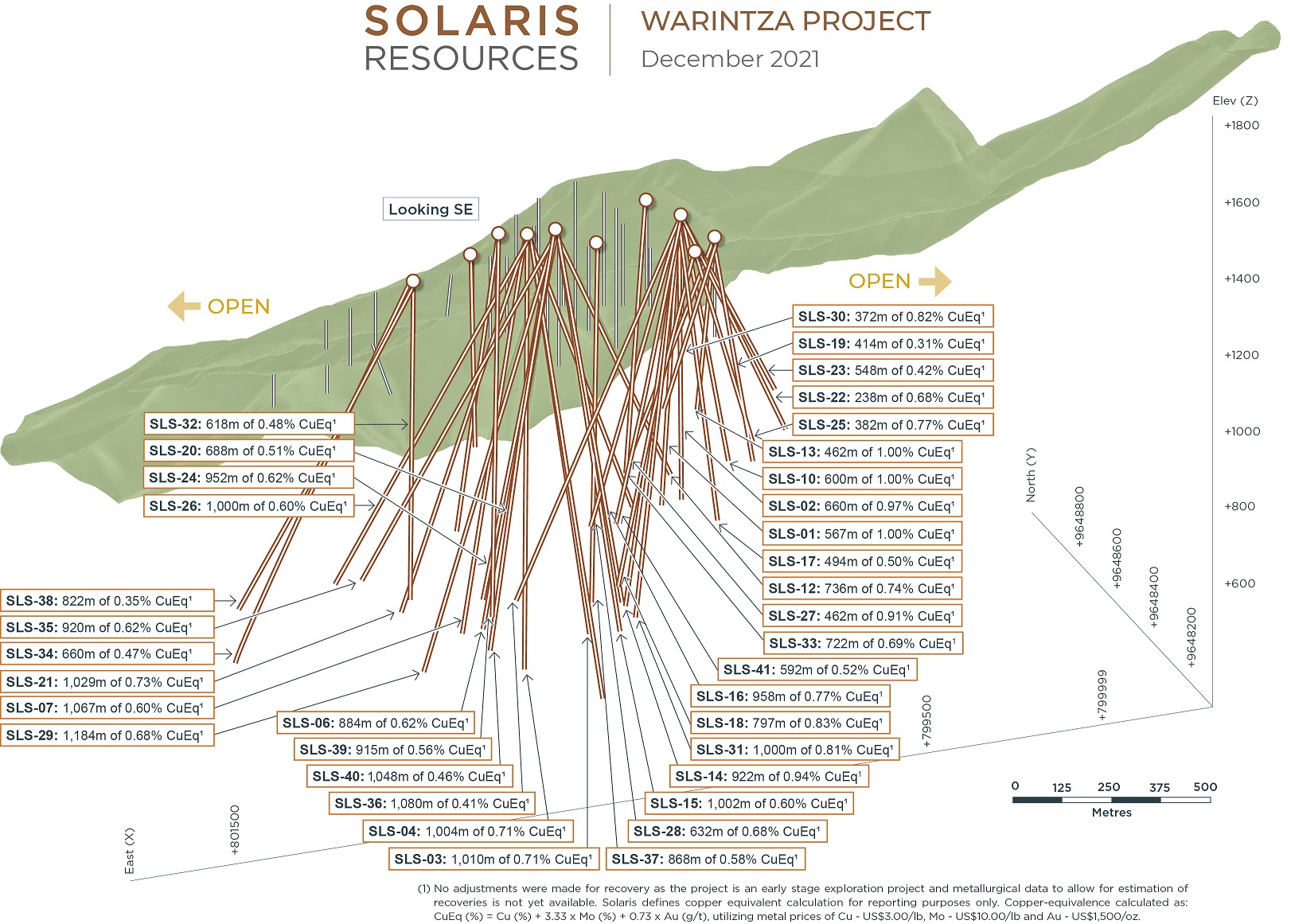

Figure 2 – Plan View of Warintza Drilling Released to Date
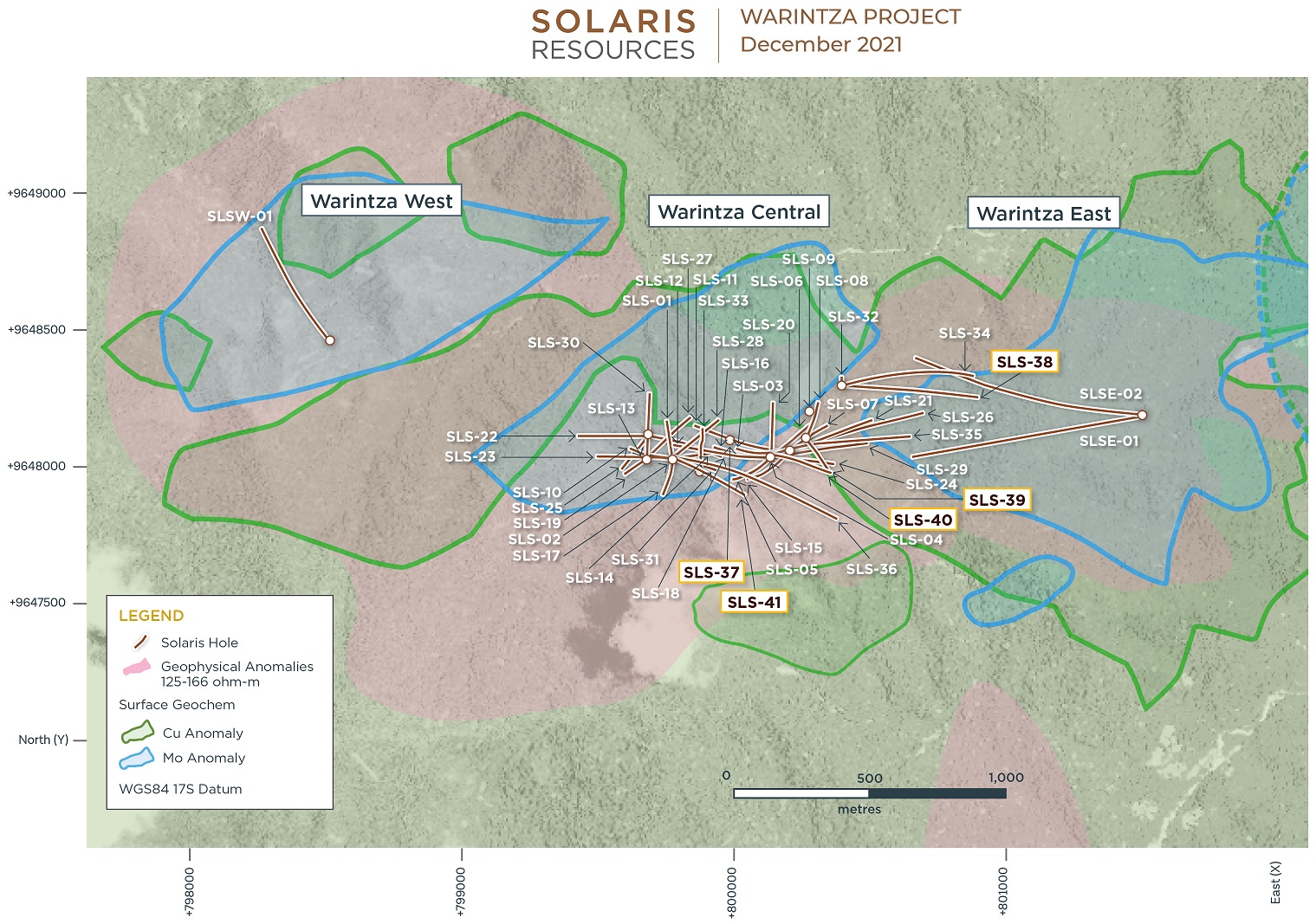

Figure 3 – Long Section of 3D Geophysics Looking Southwest
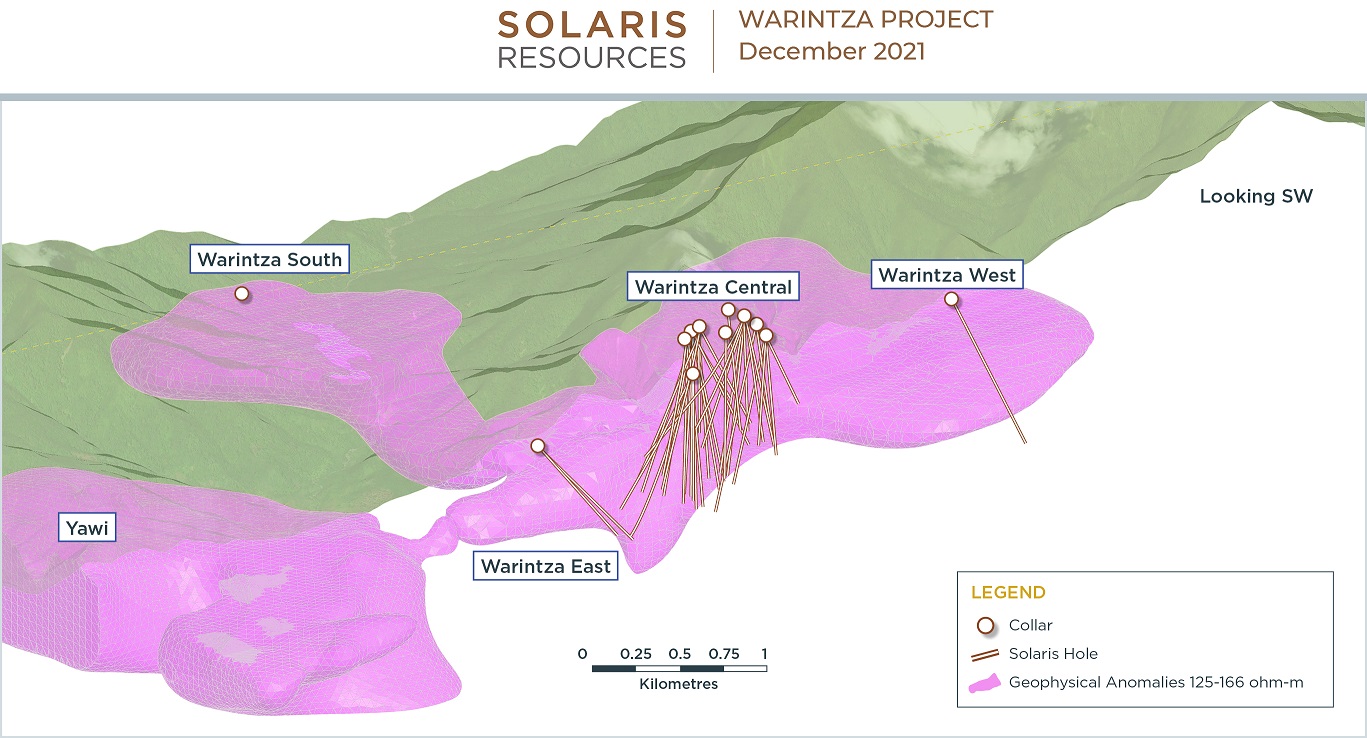

Highlights
- Five additional holes reported in this press release have expanded the dimensions of Warintza Central to the south and southeast where it remains open, with the highest-grade intervals within each hole starting at or near surface (refer to Figures 1 & 2)
- SLS-37 was collared in the middle of the Warintza Central grid and drilled vertically into a partially open volume near surface, returning 868m of 0.58% CuEq¹ from 28m depth; further drilling from this platform will target northern and southern extensions of the zone
- SLS-38 was collared at the northeastern limit of the grid and drilled east into an open volume, returning 244m of 0.70% CuEq¹ from 58m depth, within a broader interval of 822m of 0.35% CuEq¹ that included dilution from a weakly-mineralized mafic intrusive
- SLS-39 was collared on the eastern side of the grid and drilled into a partially open volume to the southeast, returning 915m of 0.56% CuEq¹, including 368m of 0.73% CuEq¹ from 90m depth, with the last 10m of the hole grading 0.61% CuEq¹ suggesting further potential to the southeast
- SLS-40 was collared at the southeastern limit of the grid and drilled into a partially open volume to the southeast, returning 1,048m of 0.46% CuEq¹ from surface, including 382m of 0.64% CuEq¹ from 50m depth, extending mineralization to the southeast where it remains open
- SLS-41 was collared in the middle of the Warintza Central grid and drilled into an open volume to the southeast, returning 592m of 0.52% CuEq¹ from surface, including 496m of 0.58% CuEq¹, extending mineralization to the south where it remains open
- To date, 55 holes have been completed at Warintza Central with assays reported for 41 of these
- Maiden drilling results are expected in January from Warintza South, a target defined by a high conductivity anomaly measuring 2.5km x 2.0km x 0.7km and overlapping copper and molybdenum anomalies where exposed at surface
Table 1 – Assay Results
| Hole ID | Date Reported | From (m) | To (m) | Interval (m) | Cu (%) | Mo (%) | Au (g/t) | CuEq¹ (%) |
| SLS-41 | Dec 14, 2021 | 0 | 592 | 592 | 0.42 | 0.02 | 0.06 | 0.52 |
| Including | 8 | 504 | 496 | 0.48 | 0.02 | 0.06 | 0.58 | |
| SLS-40 | 8 | 1056 | 1048 | 0.39 | 0.01 | 0.03 | 0.46 | |
| Including | 50 | 432 | 382 | 0.56 | 0.02 | 0.04 | 0.64 | |
| SLS-39 | 28 | 943 | 915 | 0.49 | 0.01 | 0.04 | 0.56 | |
| Including | 90 | 458 | 368 | 0.65 | 0.02 | 0.04 | 0.73 | |
| SLS-38 | 58 | 880 | 822 | 0.28 | 0.01 | 0.05 | 0.35 | |
| Including | 58 | 302 | 244 | 0.58 | 0.02 | 0.06 | 0.70 | |
| SLS-37 | 28 | 896 | 868 | 0.39 | 0.05 | 0.05 | 0.58 | |
| SLS-36 | Nov 15, 2021 | 2 | 1082 | 1080 | 0.33 | 0.01 | 0.04 | 0.41 |
| SLS-35 | 48 | 968 | 920 | 0.53 | 0.02 | 0.04 | 0.62 | |
| SLS-34 | Oct 25, 2021 | 52 | 712 | 660 | 0.36 | 0.02 | 0.06 | 0.47 |
| SLS-33 | 40 | 762 | 722 | 0.55 | 0.03 | 0.05 | 0.69 | |
| SLSE-02 | 0 | 1160 | 1160 | 0.20 | 0.01 | 0.04 | 0.25 | |
| SLS-32 | Oct 12, 2021 | 0 | 618 | 618 | 0.38 | 0.02 | 0.05 | 0.48 |
| SLS-31 | 8 | 1008 | 1000 | 0.68 | 0.02 | 0.07 | 0.81 | |
| SLS-30 | 2 | 374 | 372 | 0.57 | 0.06 | 0.06 | 0.82 | |
| SLSE-01 | Sep 27, 2021 | 0 | 1213 | 1213 | 0.21 | 0.01 | 0.03 | 0.28 |
| SLS-29 | Sep 7, 2021 | 6 | 1190 | 1184 | 0.58 | 0.02 | 0.05 | 0.68 |
| SLS-28 | 6 | 638 | 632 | 0.51 | 0.04 | 0.06 | 0.68 | |
| SLS-27 | 22 | 484 | 462 | 0.70 | 0.04 | 0.08 | 0.91 | |
| SLS-26 | July 7, 2021 | 2 | 1002 | 1000 | 0.51 | 0.02 | 0.04 | 0.60 |
| SLS-25 | 62 | 444 | 382 | 0.62 | 0.03 | 0.08 | 0.77 | |
| SLS-24 | 10 | 962 | 952 | 0.53 | 0.02 | 0.04 | 0.62 | |
| SLS-19 | 6 | 420 | 414 | 0.21 | 0.01 | 0.06 | 0.31 | |
| SLS-23 | May 26, 2021 | 10 | 558 | 548 | 0.31 | 0.02 | 0.06 | 0.42 |
| SLS-22 | 86 | 324 | 238 | 0.52 | 0.03 | 0.06 | 0.68 | |
| SLS-21 | 2 | 1031 | 1029 | 0.63 | 0.02 | 0.04 | 0.73 | |
| SLS-20 | April 19, 2021 | 18 | 706 | 688 | 0.35 | 0.04 | 0.05 | 0.51 |
| SLS-18 | 78 | 875 | 797 | 0.62 | 0.05 | 0.06 | 0.83 | |
| SLS-17 | 12 | 506 | 494 | 0.39 | 0.02 | 0.06 | 0.50 | |
| SLS-16 | Mar 22, 2021 | 20 | 978 | 958 | 0.63 | 0.03 | 0.06 | 0.77 |
| SLS-15 | 2 | 1231 | 1229 | 0.48 | 0.01 | 0.04 | 0.56 | |
| SLS-14 | 0 | 922 | 922 | 0.79 | 0.03 | 0.08 | 0.94 | |
| SLS-13 | Feb 22, 2021 | 6 | 468 | 462 | 0.80 | 0.04 | 0.09 | 1.00 |
| SLS-12 | 22 | 758 | 736 | 0.59 | 0.03 | 0.07 | 0.74 | |
| SLS-11 | 6 | 694 | 688 | 0.39 | 0.04 | 0.05 | 0.57 | |
| SLS-10 | 2 | 602 | 600 | 0.83 | 0.02 | 0.12 | 1.00 | |
| SLS-09 | 122 | 220 | 98 | 0.60 | 0.02 | 0.04 | 0.71 | |
| SLSW-01 | Feb 16, 2021 | 32 | 830 | 798 | 0.25 | 0.02 | 0.02 | 0.31 |
| SLS-08 | Jan 14, 2021 | 134 | 588 | 454 | 0.51 | 0.03 | 0.03 | 0.62 |
| SLS-07 | 0 | 1067 | 1067 | 0.49 | 0.02 | 0.04 | 0.60 | |
| SLS-06 | Nov 23, 2020 | 8 | 892 | 884 | 0.50 | 0.03 | 0.04 | 0.62 |
| SLS-05 | 18 | 936 | 918 | 0.43 | 0.01 | 0.04 | 0.50 | |
| SLS-04 | 0 | 1004 | 1004 | 0.59 | 0.03 | 0.05 | 0.71 | |
| SLS-03 | Sep 28, 2020 | 4 | 1014 | 1010 | 0.59 | 0.02 | 0.10 | 0.71 |
| SLS-02 | 0 | 660 | 660 | 0.79 | 0.03 | 0.10 | 0.97 | |
| SLS-01 | Aug 10, 2020 | 1 | 568 | 567 | 0.80 | 0.04 | 0.10 | 1.00 |
| Notes to table: True widths cannot be determined at this time. | ||||||||
Table 2 – Collar Location
| Hole ID | Easting | Northing | Elevation (m) | Depth (m) | Azimuth (degrees) | Dip (degrees) |
| SLS-41 | 799765 | 9648033 | 1571 | 792 | 115 | -70 |
| SLS-40 | 800124 | 9648044 | 1568 | 1056 | 105 | -75 |
| SLS-39 | 800253 | 9648105 | 1576 | 943 | 145 | -80 |
| SLS-38 | 800383 | 9648303 | 1412 | 923 | 90 | -56 |
| SLS-37 | 799968 | 9648102 | 1510 | 929 | 0 | -90 |
| Notes to table: The coordinates are in WGS84 17S Datum. | ||||||
Source: Solaris Resources
The above references an opinion and is for information purposes only. It is not intended to be investment advice. Seek a licensed professional for investment advice. The author is not an insider or shareholder of any of the companies mentioned above.


Canadian-based Solaris Resources (TSX:SLS) has announced its plans to focus on advancing its 100%-owned flagship Warintza copper and gold project in southeastern Ecuador, while transferring its non-core assets into a new private company called Solaris Exploration Inc.
The company will be transferring its noncore assets in Ecuador, Chile, Mexico, and Peru to the new company following an internal reorganization from the company. It is expected that 100% of the common shares of Solaris Resources will be spun out to shareholders relative to their shareholdings.
In order for the spin-out to be approved, at least two-thirds of Solaris Resources shareholders have to vote and agree on the future plans. The spin-out and reorganization are also subject to other approvals, including approval by the Supreme Court of British Columbia.
After the proposed spin-out has been approved, Solaris will continue trading on the Toronto Stock Exchange in Canada under the symbol “SLS”, and on the OTCQB Venture Market in the United States under the symbol “SLSSF”. Solaris Exploration will not be listed on any stock exchange post-spin-out approval, and will remain a private company for the time being.
Warintza Stands on Its Own
As the company bundles its non-core assets, Solaris plans to focus on rapidly growing and advancing its Warintza project. The 268-sq.-km property is adjacent to the San Carlos-Panantza copper and gold mine, along with the Mirador copper and gold mine about 40 km south of the property. The Mirador mine is one of the world’s lowest-cost copper operations and largest mines in Ecuador; it started production in 2019 and is expected to produce 94,000 tonnes of copper concentrate per year.
The low cost of operation at Waritnza and the surrounding mines is due to easy-to-access roads and highways, access to freshwater, and access to low-cost hydroelectric energy.
The property is also adjacent to a highway nearby that allows access to Pacific ports, transmission lines, and an airport. It is connected to grid power which supplies the company with inexpensive hydroelectric power, as well as access to fresh water, and low-cost skilled labour. This is the ideal situation for the exploration company and its flagship asset. Ultimately, the capital cost savings for the project have been lowered immensely due to the opportune placement of the project.
A 2019 mineral resource estimate for Warintza Central estimated 123.8 million inferred tonnes grading 0.56% copper, 0.03% molybdenum, and 0.06 gram gold per tonne (0.7% copper-equivalent) for 1.5 billion lb. contained copper, 77.5 million lb. molybdenum, and 238,600 oz. gold. The estimate was based on about 7,000 metres of historical drilling to an average depth of approximately 200 metres.
Warintza was first discovered by David Lowell over 20 years ago in 2000. After the discovery, the property was left alone for almost two decades as social acceptance of the property began to break down within the local communities. Through extensive communication and understanding of why operating this project would affect the community so immensely, the two parties came to a resolution in 2019.
Beyond Business, To Community Development
Now, Solaris has a strategic alliance in place with the Shuar communities of Warintza and Yawi to overlook and engage in direct and transparent dialogue regarding all Warintza project-related activities. This alliance also led to the decision to create a CSR program promoting trust, cooperation, and reciprocal support. Solaris now employs over 450 personnel, which represents full employment from the local communities.
In September 2020, the company signed an Impacts & Benefits Agreement with the Shuar communities of Warintza and Yawi for the Warintza project. This agreement provides certainty to Solaris that the communities will continue to support the company through the development and production stages of the project.
Warintza has 12 drill rigs on the property, mostly focused on Waritnza Central, currently open to the north, east, and south. Results from ongoing exploration are expected in the near-term as well, and 2022 is set to bring further big developments.
Most Exciting Year Yet?
An updated mineral resource estimate is expected to be published within the first quarter of 2022, as well as a preliminary economic assessment set to be released later in the year. Those updates could establish Warintza as a premier copper project, and reset investor expectations for how big the Warintza project – and Solaris Resources – could be.
With the new move to make it clear that Warintza is a world-class asset on its own, this could mean the start of the next chapter for the project and Solaris Resources.
The above references an opinion and is for information purposes only. It is not intended to be investment advice. Seek a licensed professional for investment advice. The author is not an insider or shareholder of any of the companies mentioned above.
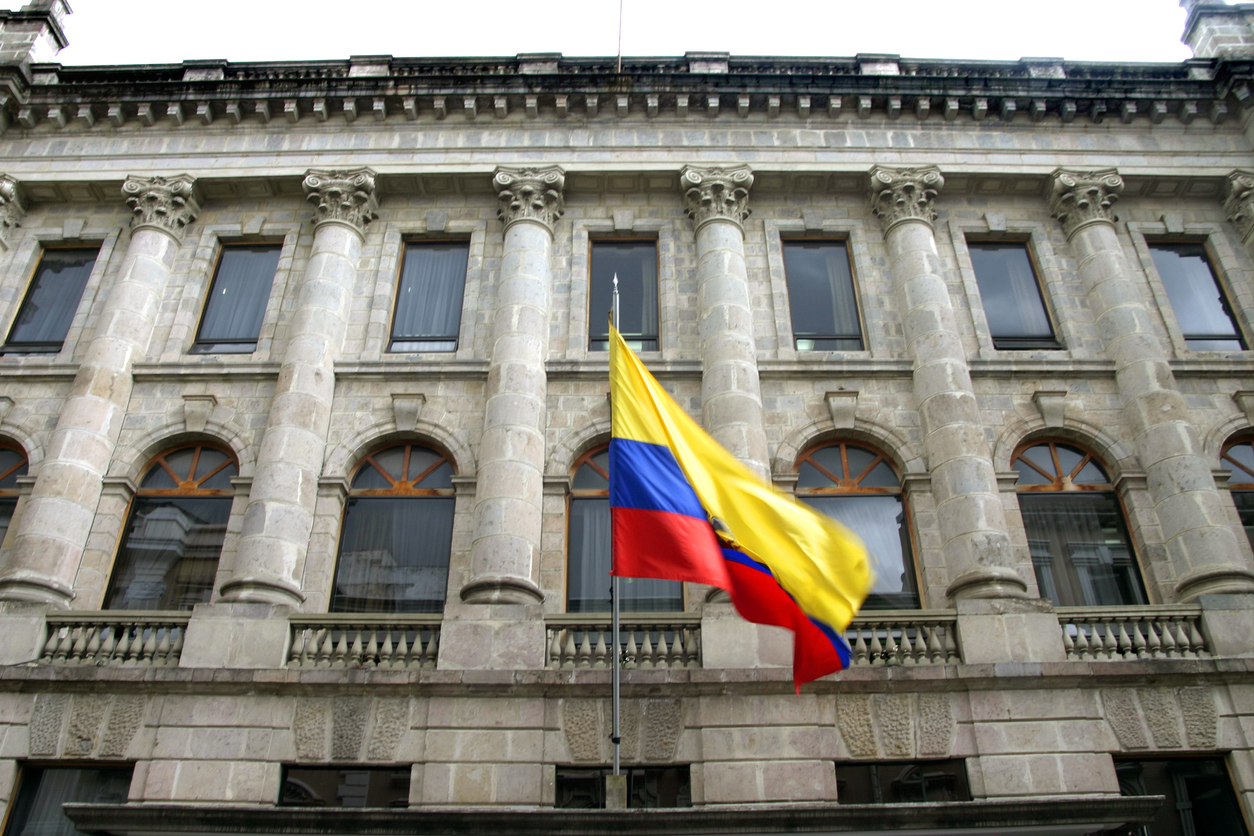

Ecuador’s constitutional court ruled Wednesday that mining in the country’s protected rainforest violates nature’s constitutional rights. The landmark decision was reached after a lawsuit filed by environmental organizations, which argued that mining activities threatened Ecuador’s constitutional provisions granting rights to ecosystems and protection from degradation or pollution. In their ruling, Ecuadorian justices found that the state mining company Enami and Cornerstone Capital Resources, its Canadian partner violated constitutional protections granted to natural resources in the Los Cedros Protected Area.
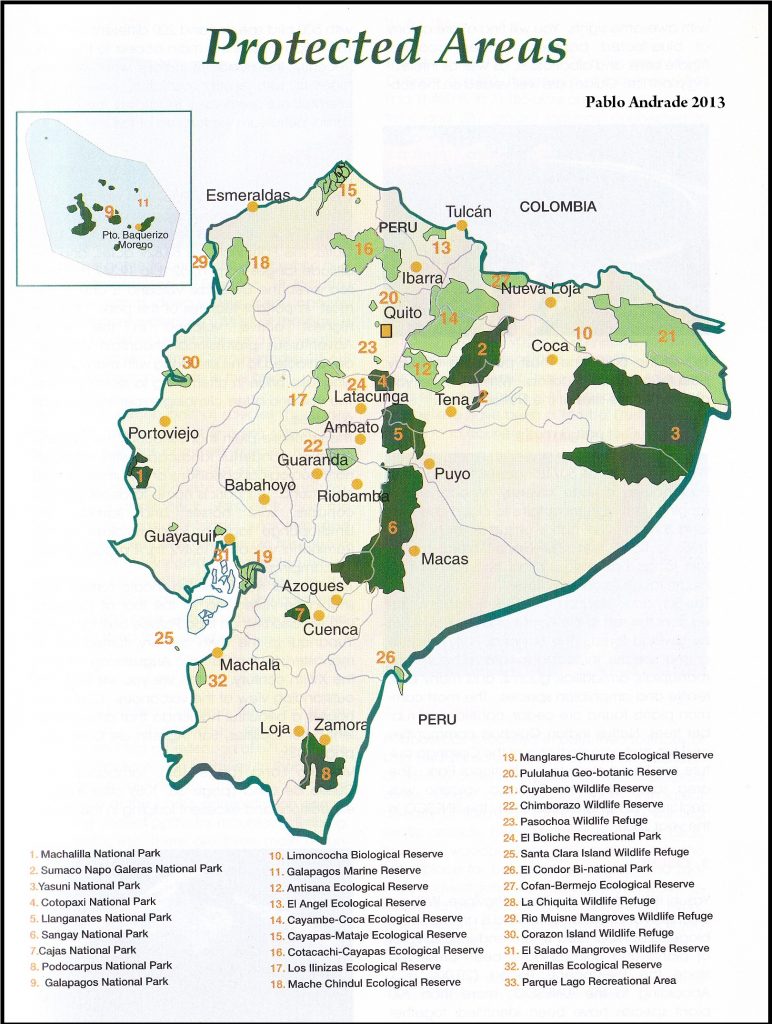

Solaris Resources (TSX:SLS) is exploring its Warintza property in southeastern Ecuador, which lies east of Cuenca. The project is not located in any of the biologically sensitive areas mapped out by the government, and does not lie within or near the rainforest.
This is good news for the junior mining company that has made significant progress in its drill program, making back-to-back discoveries at multiple targets. With several hundred kilometres between the Warintza project and the nearest protected forest, Sangay, Solaris should be able to avoid much of the risk that other mining companies will need to deal with.


The ruling creates uncertainty for other junior mining companies through this new precedent that could threaten their projects if they lie within or around the protected rainforest or other environmentally sensitive areas.
This could also be harmful to the country’s tax base and economic prosperity as the mining industry has been an important source of economic growth and contributes to Ecuador’s GDP.
With this latest constitutional court decision on protecting nature’s rights, it looks like Ecuador could be witnessing a shift towards greater environmental protections at the expense of foreign investment which could impact future economic development initiatives by President Guillermo Lasso’s administration.
The ruling is a landmark victory for the rights of nature movement, which has been growing in popularity as more countries adopt constitutional amendments and legislation recognizing the legal rights of ecosystems to exist and flourish. Ecuador is one of the first countries to recognize constitutional rights for nature, doing so in 2008 with Article 71-A of its Constitution.
Good for Nature, Harmful to Business
This week’s ruling by Ecuador’s constitutional court follows another groundbreaking verdict that granted the Vilcabamba River constitutional rights and recognized it as an entity with legal interests in the protection against pollution or degradation. The watershed of this Andean river spans across six provinces through Peru and three more provinces in southern Colombia before reaching its mouth at the Amazonian city of Iquitos, where approximately 500,000 people reside. This unprecedented ruling was also decided by seven justices voting unanimously for nature’s right to exist and flourish under Article 71A of Ecuador’s Constitution.
An Infringement of Rights?
However, the most recent ruling from the constitutional court is seen by some as an infringement of mining rights that were granted to two companies authorized to operate on those lands. According to Ecuador’s Ministry of Mines and Metal Resources, mining is the second most important source of income for the country after oil.
This places the country’s interests directly in contention with the legal ruling made by the constitutional court, which is expected to set a precedent for future constitutional protections on nature. Ultimately, this could open the country up to more litigation in the future as companies with projects in protected lands that have worked to protect those regions while maintaining operations are shut down or have their licenses revoked.
Miners may also consider the risk of doing business in Ecuador to be too high if the constitutional court continues to hand down rulings in this way, evoking images of overreach in some cases. Foreign investment from the mining industry in Ecuador is important because it boosts the country’s economy through royalties, taxes, and job creation.
If nature’s rights begin to impede economic progress, the constitutional court may have to begin to weigh that into its decision-making process. It is likely that eventually, Ecuador’s constitutional court will be forced to make definitive rulings on these issues in order for them not to continue being brought before it with each new instance of violation of pollution taking place within ecosystems protected by constitutional rights.
This ruling sets a public global precedent as well, which could lead other countries around the world where nature also has constitutional protections – such as Colombia and Bolivia – to follow suit if they are seeing similar environmental degradation from mining activities there.
For now, mining companies and investors will be watching very closely for the progress in Ecuador and any future news on this case and others.
The above references an opinion and is for information purposes only. It is not intended to be investment advice. Seek a licensed professional for investment advice. The author is not an insider or shareholder of any of the companies mentioned above.
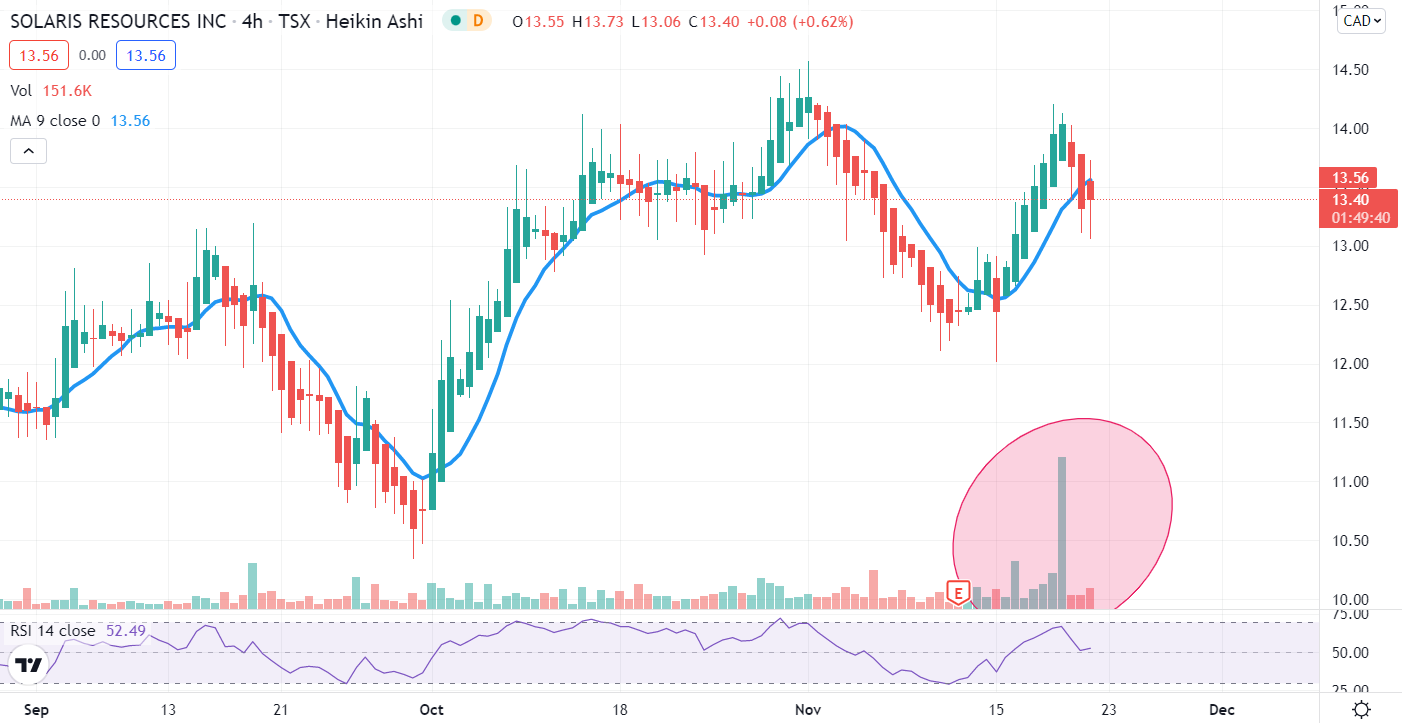

On November 18, 2021 Solaris Resources (TSX:SLS) traded above average volume by hundreds of thousands of shares at nearly 1.7 million in daily volume. Solaris’ share structure has one of the highest insider ownerships for a junior miner, begging the question of why exactly did volume spike on that day?
Could it have been that insiders are shifting positions ahead of upcoming drill results? Or is something else happening with retail investors to draw such high volume?
It would first help to understand what a breakout above regular price action and traded volume can mean for investors. Often higher volume will drive prices higher or lower depending on the bid-ask spread, but in this case, shares traded only 2% higher on the day.
The stock was not outside of its normal bounds, and closed just below C$14, at $13.90. The uptick in volume is notable for how it didn’t accompany a significantly different price action, but potentially foreshadows new price action coming down the line.
For this reason, it could be inferred that the expectation of news coming down the pipeline could be the reason for the higher than average daily volume. The company has had a run of successful assay results as part of its ongoing exploration at the Warintza Project in Ecuador.
An expansion of the Warintza Porphyry Cluster, multiple back-to-back discoveries, the commencement of maiden drilling at Warintza South, and positive preliminary results at Warintza Central have seen shares climb consistently month after month.
The stock is up over 1000% since the company’s IPO in 2020, and the bullish sentiment indicated by multiple breaks above the 50-day moving average would seem to indicate that buyers are always present.
Whether the larger than average trade volume is indicative of insiders moving shares ahead of news or higher investor interest due to the company’s performance and the drill program is yet to be seen. For now, investors will be watching closely whether Solaris (TSX:SLS) continues to climb higher.
The above references an opinion and is for information purposes only. It is not intended to be investment advice. Seek a licensed professional for investment advice. The author is not an insider or shareholder of any of the companies mentioned above.
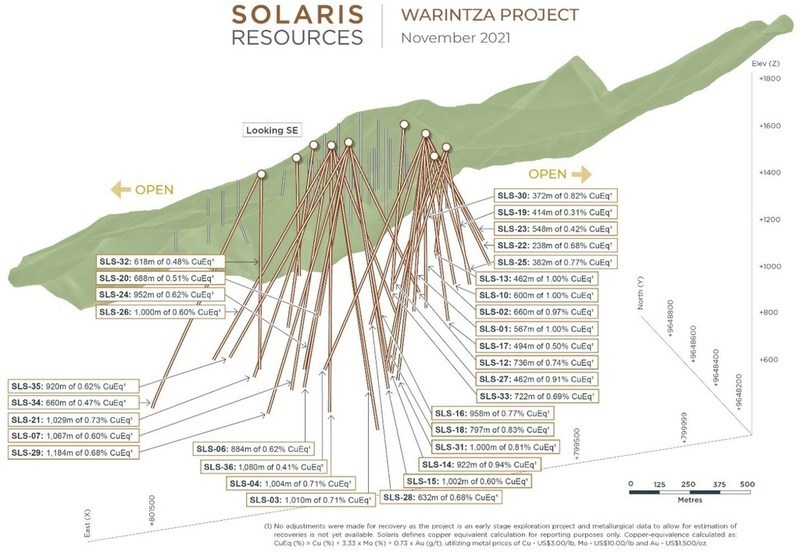


Solaris Resources (TSX:SLS) announced this morning its assay results from a set of additional holes from ongoing resource growth and discovery drilling programs at the Warintza Project in southeastern Ecuador.
Vice President, Exploration Mr. Jorge Fierro, commented: “We are pleased to see the continued growth of the Warintza Central zone, with every hole drilled having hit significant mineralization and the dimensions of the zone open and growing to the east, and broadening to the north and south where additional assays are expected soon. Our drilling fleet has now been fully reoriented to pursue aggressive growth and discovery drilling over the balance of the year and into 2022.”
The highlights from the project are as follows:
- Two additional holes reported in this press release have extended the dimensions of Warintza Central zone to the south and east, with the highest-grade intervals in each hole starting at or near surface
- Southern extension drilling in SLS-36 together with northern step-out drilling previously reported on October 12 in SLS-32, which returned 618m of 0.48% CuEq¹ from surface, including 372m of 0.64% CuEq¹ from 46m depth, have widened the Warintza Central zone
- SLS-35 was collared at the southeastern limit of the Warintza Central grid and drilled into a partially open volume to the east, returning 920m of 0.62% CuEq¹, including 326m of 0.80% CuEq¹ from 50m depth, extending mineralization to the east where it partially overlaps Warintza East
- SLS-36 was collared in the middle of the Warintza Central grid and drilled into an open volume to the southeast, returning 1,080m of 0.41% CuEq¹ from surface, including 290m of 0.81% CuEq¹ from 46m depth, extending mineralization by at least 200m to the south where it remains open
- To date, 50 holes have been completed at Warintza Central with assays reported for 36 of these
Source: Solaris Resources
Future drilling will be focused on extensional and step-out drilling. This includes establishing the potential link to the Warintza East zone, discovery drilling at the other well-defined targets within the 7km x 5km Warintza cluster of copper porphyries, and focusing on the untested gold potential.
Drilling Continues in Harmonious Alliance
A strategic alliance was made between Solaris and the Shuar communities of Warints and Yawi in 2019 to overlook and engage in direct and transparent dialogue regarding all Warintza Project-related activities. This alliance allows the people of the community to build and promote trust, reciprocal support, cooperation and strengthen the decision-making capacity of the community. It allows them to have a voice in their community when direct change is taking place.
The company states the mandate will include but not be limited to positive results including employment, business development opportunities, appropriate health care, and emergency care services, development of community infrastructure, and education and skills training.
The Warintza Project is situated in southeastern Ecuador, in the same belt as the Fruta del Norte and Mirador mines, adjacent to San Carlos – Panantza copper deposits. Solaris Resources also has four other current gold and copper projects, including La Verde in Mexico in which Solaris has earned a 60% interest via JV with Teck Resources.
There is also the Tamarugo in Chile which is an undrilled, grassroots copper porphyry exploration target in the Chilean copper belt, and the Capricho Paco Orco in Peru which is a Grassroots exploration project. The final project is Ricardo in Chile, it is a brownfield copper porphyry exploration project immediately contiguous and on the same structure as Chuquicamata, one of the largest copper mines in Chile.
Table 1 – Assay Results
|
Hole ID |
Date Reported |
From (m) |
To (m) |
Interval (m) |
Cu (%) |
Mo (%) |
Au (g/t) |
CuEq¹ (%) |
||
|
SLS-36 |
Nov 15, 2021 |
2 |
1082 |
1080 |
0.33 |
0.01 |
0.04 |
0.41 |
||
|
Including |
46 |
336 |
290 |
0.67 |
0.03 |
0.08 |
0.81 |
|||
|
SLS-35 |
48 |
968 |
920 |
0.53 |
0.02 |
0.04 |
0.62 |
|||
|
Including |
50 |
376 |
326 |
0.69 |
0.02 |
0.05 |
0.80 |
|||
|
SLS-34 |
Oct 25, 2021 |
52 |
712 |
660 |
0.36 |
0.02 |
0.06 |
0.47 |
||
|
SLS-33 |
40 |
762 |
722 |
0.55 |
0.03 |
0.05 |
0.69 |
|||
|
SLSE-02 |
0 |
1160 |
1160 |
0.20 |
0.01 |
0.04 |
0.25 |
|||
|
SLS-32 |
Oct 12, 2021 |
0 |
618 |
618 |
0.38 |
0.02 |
0.05 |
0.48 |
||
|
SLS-31 |
8 |
1008 |
1000 |
0.68 |
0.02 |
0.07 |
0.81 |
|||
|
SLS-30 |
2 |
374 |
372 |
0.57 |
0.06 |
0.06 |
0.82 |
|||
|
SLSE-01 |
Sep 27, 2021 |
0 |
1213 |
1213 |
0.21 |
0.01 |
0.03 |
0.28 |
||
|
SLS-29 |
Sep 7, 2021 |
6 |
1190 |
1184 |
0.58 |
0.02 |
0.05 |
0.68 |
||
|
SLS-28 |
6 |
638 |
632 |
0.51 |
0.04 |
0.06 |
0.68 |
|||
|
SLS-27 |
22 |
484 |
462 |
0.70 |
0.04 |
0.08 |
0.91 |
|||
|
SLS-26 |
July 7, 2021 |
2 |
1002 |
1000 |
0.51 |
0.02 |
0.04 |
0.60 |
||
|
SLS-25 |
62 |
444 |
382 |
0.62 |
0.03 |
0.08 |
0.77 |
|||
|
SLS-24 |
10 |
962 |
952 |
0.53 |
0.02 |
0.04 |
0.62 |
|||
|
SLS-19 |
6 |
420 |
414 |
0.21 |
0.01 |
0.06 |
0.31 |
|||
|
SLS-23 |
May 26, 2021 |
10 |
558 |
548 |
0.31 |
0.02 |
0.06 |
0.42 |
||
|
SLS-22 |
86 |
324 |
238 |
0.52 |
0.03 |
0.06 |
0.68 |
|||
|
SLS-21 |
2 |
1031 |
1029 |
0.63 |
0.02 |
0.04 |
0.73 |
|||
|
SLS-20 |
April 19, 2021 |
18 |
706 |
688 |
0.35 |
0.04 |
0.05 |
0.51 |
||
|
SLS-18 |
78 |
875 |
797 |
0.62 |
0.05 |
0.06 |
0.83 |
|||
|
SLS-17 |
12 |
506 |
494 |
0.39 |
0.02 |
0.06 |
0.50 |
|||
|
SLS-16 |
Mar 22, 2021 |
20 |
978 |
958 |
0.63 |
0.03 |
0.06 |
0.77 |
||
|
SLS-15 |
2 |
1231 |
1229 |
0.48 |
0.01 |
0.04 |
0.56 |
|||
|
SLS-14 |
0 |
922 |
922 |
0.79 |
0.03 |
0.08 |
0.94 |
|||
|
SLS-13 |
Feb 22, 2021 |
6 |
468 |
462 |
0.80 |
0.04 |
0.09 |
1.00 |
||
|
SLS-12 |
22 |
758 |
736 |
0.59 |
0.03 |
0.07 |
0.74 |
|||
|
SLS-11 |
6 |
694 |
688 |
0.39 |
0.04 |
0.05 |
0.57 |
|||
|
SLS-10 |
2 |
602 |
600 |
0.83 |
0.02 |
0.12 |
1.00 |
|||
|
SLS-09 |
122 |
220 |
98 |
0.60 |
0.02 |
0.04 |
0.71 |
|||
|
SLS-08 |
Jan 14, 2021 |
134 |
588 |
454 |
0.51 |
0.03 |
0.03 |
0.62 |
||
|
SLS-07 |
0 |
1067 |
1067 |
0.49 |
0.02 |
0.04 |
0.60 |
|||
|
SLS-06 |
Nov 23, 2020 |
8 |
892 |
884 |
0.50 |
0.03 |
0.04 |
0.62 |
||
|
SLS-05 |
18 |
936 |
918 |
0.43 |
0.01 |
0.04 |
0.50 |
|||
|
SLS-04 |
0 |
1004 |
1004 |
0.59 |
0.03 |
0.05 |
0.71 |
|||
|
SLS-03 |
Sep 28, 2020 |
4 |
1014 |
1010 |
0.59 |
0.02 |
0.10 |
0.71 |
||
|
SLS-02 |
0 |
660 |
660 |
0.79 |
0.03 |
0.10 |
0.97 |
|||
|
SLS-01 |
Aug 10, 2020 |
1 |
568 |
567 |
0.80 |
0.04 |
0.10 |
1.00 |
||
|
Notes to table: True widths cannot be determined at this time. |
||||||||||
Table 2 – Collar Location
|
Hole ID |
Easting |
Northing |
Elevation (m) |
Depth (m) |
Azimuth (degrees) |
Dip (degrees) |
|
SLS-36 |
799765 |
9648033 |
1571 |
1088 |
97 |
-60 |
|
SLS-35 |
800124 |
9648044 |
1568 |
995 |
78 |
-60 |
|
Notes to table: The coordinates are in WGS84 17S Datum. |
||||||
|
(1) No adjustments were made for recovery as the project is an early-stage exploration project and metallurgical data to allow for estimation of recoveries is not yet available. Solaris defines copper equivalent calculation for reporting purposes only. Copper-equivalence calculated as: CuEq (%) = Cu (%) + 3.33 × Mo (%) + 0.73 × Au (g/t), utilizing metal prices of Cu – US$3.00/lb, Mo – US$10.00/lb and Au – US$1,500/oz. |
Figure 1 – Long Section of Warintza Central Drilling Looking Southeast



Figure 2 – Plan View of Warintza Drilling Released to Date
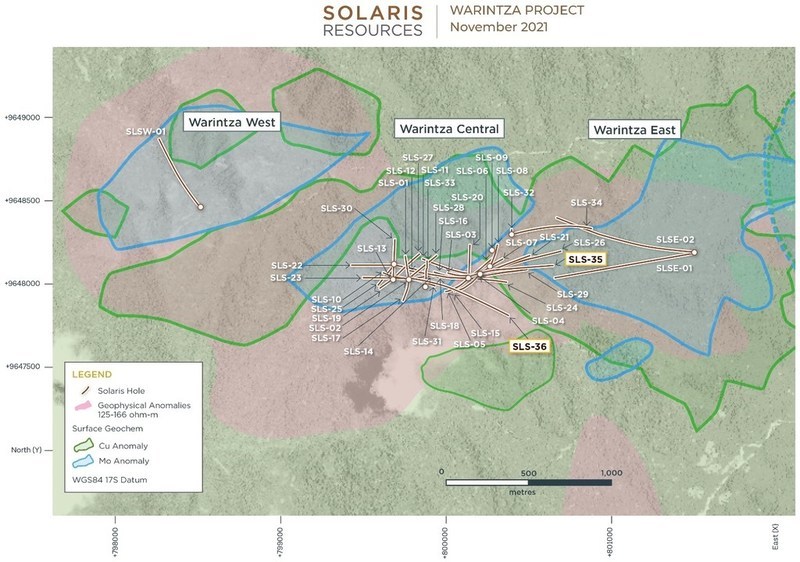

Figure 3 – Long Section of 3D Geophysics Looking Southwest
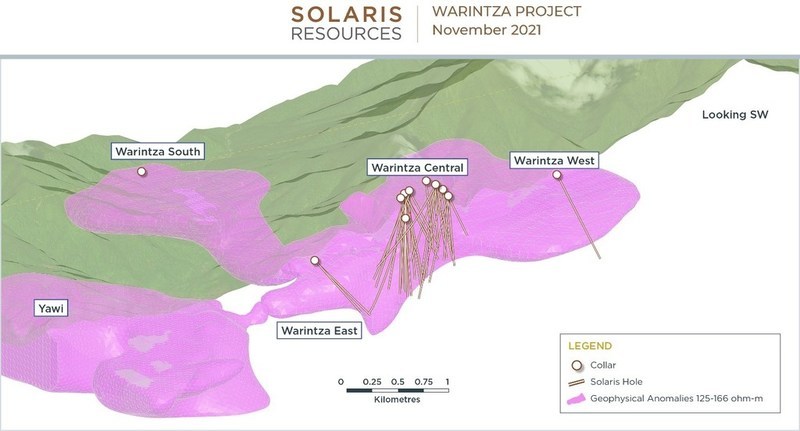

The above references an opinion and is for information purposes only. It is not intended to be investment advice. Seek a licensed professional for investment advice. The author is not an insider or shareholder of any of the companies mentioned above.
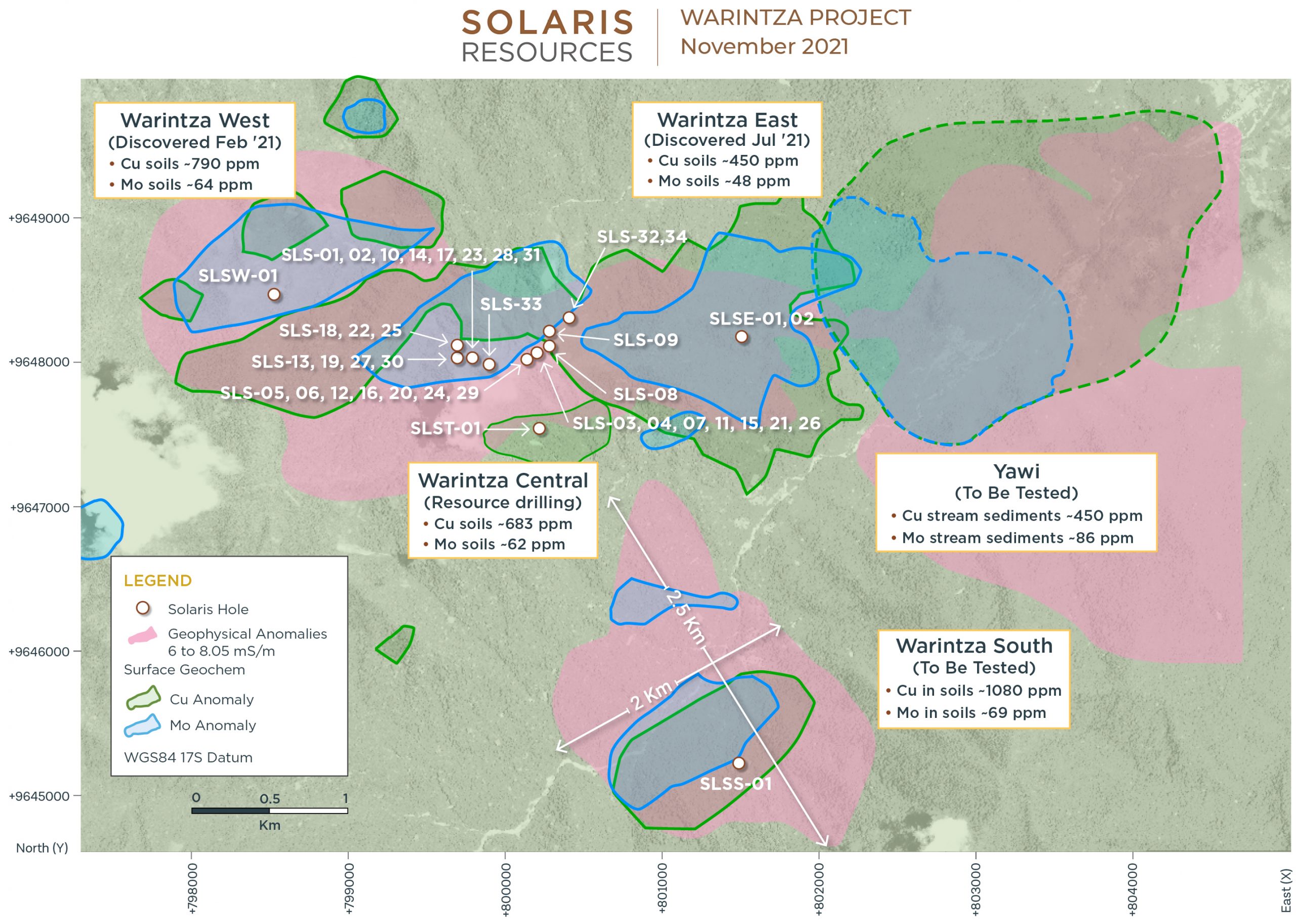

Solaris Resources (TSX:SLS) announced the commencement of maiden drilling at Warintza South this morning. In addition, updated results of detailed geophysical interpretation and geochemical sampling were delivered. The company has also refined and expanded the dimensions of the main objectives of the Warintza Project in southeastern Ecuador.
Mr. Daniel Earle, President and CEO of Solaris, said in a press release: “We are very excited to commence the first-ever drilling program at our voluminous Warintza South target, with the goal of making the fourth major discovery within our Warintza Project as we redirect our 12-rig drilling fleet toward aggressive step-out growth and discovery-oriented drilling over the balance of the year and into 2022.”
Highlights and corresponding Figures 1-3 are provided below. A dynamic 3D model featuring the updated geophysical and geochemical anomalies is available on the Company’s website.
Highlights
- Commenced maiden drilling at the Warintza South target, with the first hole collared ~3km south of Warintza Central (refer to Figures 1-3)
- The Warintza South high conductivity anomaly has dimensions more than twice the size of Warintza Central, and a similar geochemical signature where exposed at surface
- Updated interpretation has expanded the dimensions of the Warintza South high conductivity anomaly to ~2.5km x 2.0km x 0.7km and those of Warintza East and Yawi
- Additional geochemical sampling has also expanded the Warintza East anomaly further to the east and northeast where it now overlaps with Yawi
- Sampling continues to extend geochemical coverage over the sparsely sampled areas to the west and south of Warintza Central, and to targets beyond the Warintza porphyry cluster
Geophysical Reinterpretation
The Company retained Condor Consulting, Inc. (“Condor”), recognized experts in the field of airborne electromagnetics (EM), to perform detailed modelling and interpretation of the previously completed advanced airborne ZTEM survey (refer to press release dated February 16, 2021 for survey results) covering the entire 268km² Warintza and surrounding area land package.
Condor carried out a full 3D inversion of the EM and magnetic results using commercial and proprietary software producing enhanced images based on a greatly expanded dataset, including a considerable amount of additional drilling since the prior interpretation, and detailed geology, weathering and density models for the Project.
In general, the refined high conductivity volumes capture mineralization closer to surface and correlate more closely to networked sulfide mineralization in stockwork veining, with the anomalies now starting at surface and better reflecting the vertical zonation of the Warintza porphyries from higher density stockwork veining to lower density veining and disseminated mineralization.
Warintza South
Warintza South is defined by a voluminous high-conductivity anomaly located ~3km to the south of Warintza Central. The anomaly starts at surface and measures ~2.5km x 2.0km x 0.7km deep, with overlapping copper and molybdenum geochemical anomalies covering the exposed portion at surface.
Source: Solaris Resources
The above references an opinion and is for information purposes only. It is not intended to be investment advice. Seek a licensed professional for investment advice. The author is not an insider or shareholder of any of the companies mentioned above.
Solaris Resources (TSX:SLS) has reported new assay results from ongoing resource growth and discovery drilling at its flagship Warintza Project in Ecuador this morning. Warintza has now been extended, and now overlaps the Warintza East discovery.
Vice President of Exploration for Solaris Resource commented in a press release: “We are very proud to continue the great work of the late David Lowell with our first two holes confirming Warintza East as the third major copper porphyry discovery within the 7km x 5km Warintza porphyry cluster. Our drilling fleet has now been fully reoriented to pursue an aggressive growth strategy via step-out and extensional drilling as we prepare to test our next targets for further discoveries.”
Highlights are listed below, with corresponding images in Figures 1-3 and detailed results in Tables 1-2. A dynamic 3D model is available on the Company’s website and will be updated to incorporate the most recent results.
Highlights
- Eastern extension drilling has increased the strike length of Warintza Central to 1,350m where it now overlaps the western limits of Warintza East
- SLS-33 was drilled from Warintza Central into a partially open volume to the north, returning 722m of 0.69% CuEq¹, including 426m of 0.85% CuEq¹ from 46m depth, infilling and extending mineralization to the north in this area
- SLS-34 was collared at the northeastern limit of Warintza Central and drilled east into an entirely open volume, returning 660m of 0.47% CuEq¹, including 242m of 0.67% CuEq¹ from 52m depth, significantly extending mineralization to the east where it now partially overlaps Warintza East
- SLSE-02, the second hole at Warintza East, was collared approximately 1,300m east of Warintza Central and drilled northwest toward SLS-34, returning 320m of 0.48% CuEq¹ from surface within a broader interval of 1,160m assaying 0.25% CuEq¹, partially overlapping SLS-34
- SLSE-01 (previously reported September 27, 2021) was collared from the same platform as
SLSE-02 but drilled to the southwest, returning 396m of 0.42% CuEq¹ from surface within a broader interval of 1,213m assaying 0.28% CuEq¹ - Warintza East is the third major copper porphyry discovery within the Warintza cluster; each of the first two holes have returned long intervals of mineralization with the highest grades starting at or near surface reflecting the vertical zonation in the system
Figure 1 – Long Section of Warintza Central and Warintza East Drilling Looking Southeast
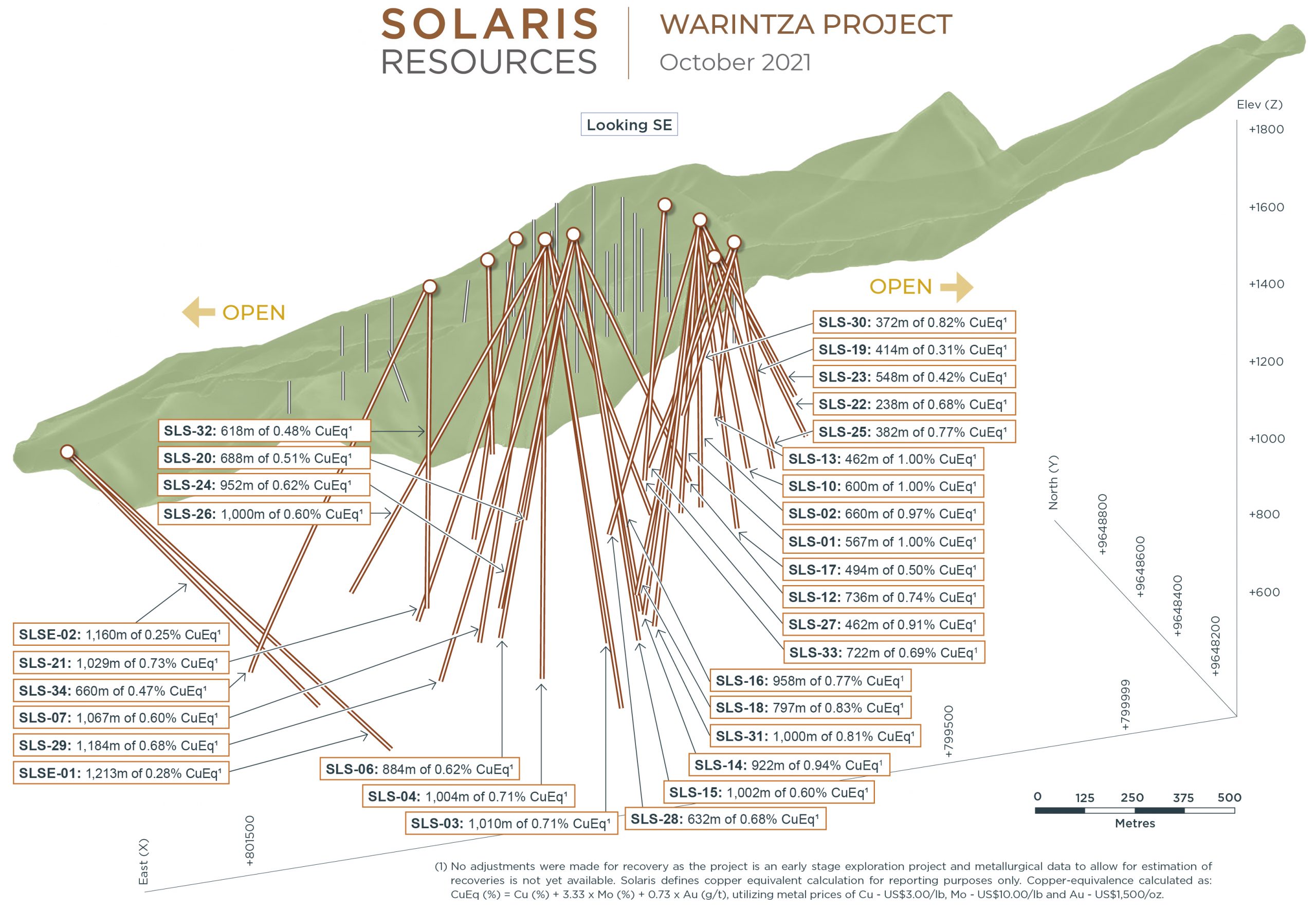

Figure 2 – Plan View of Warintza Drilling Released to Date
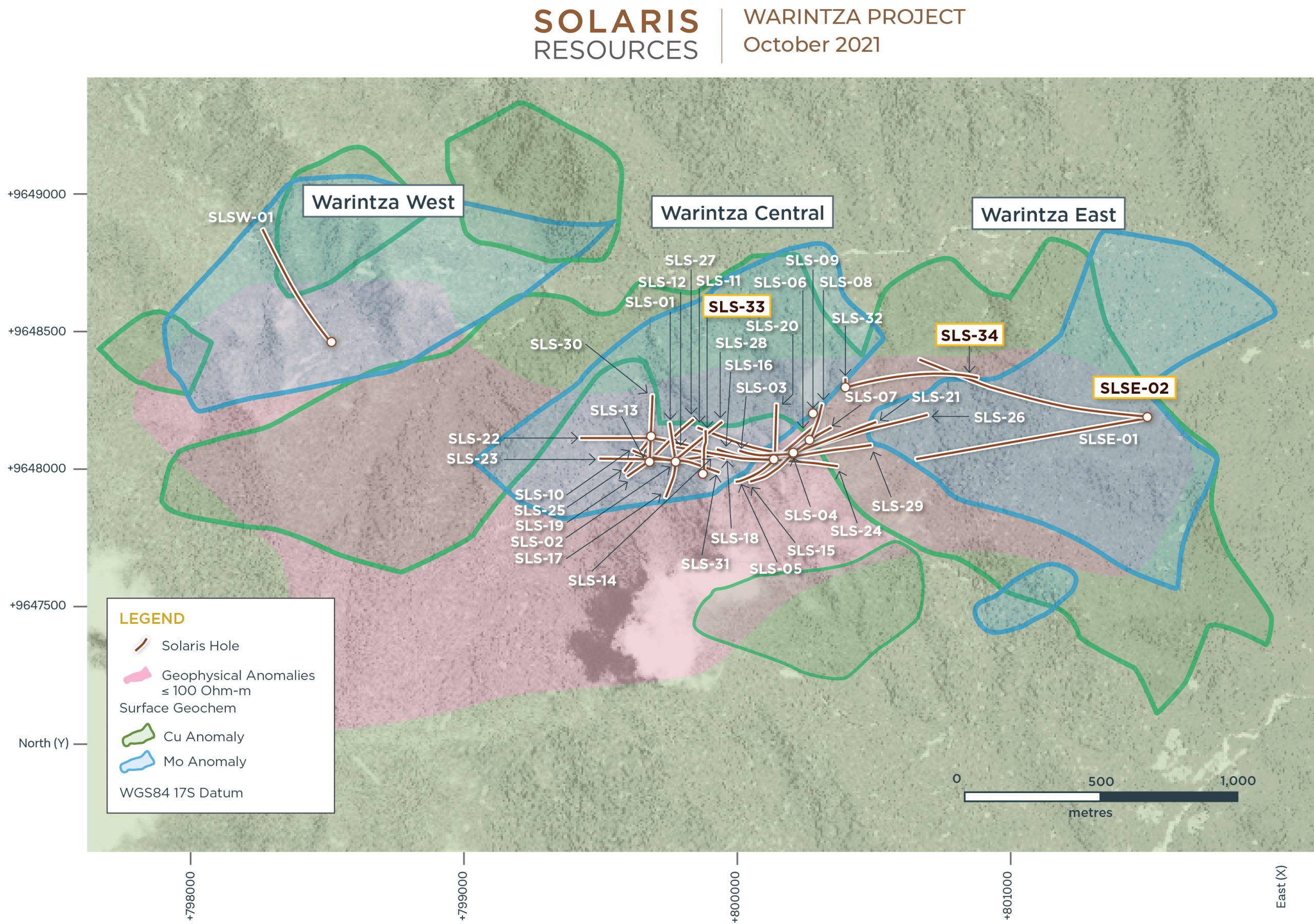

Figure 3 – Long Section of 3D Geophysics Looking Northeast
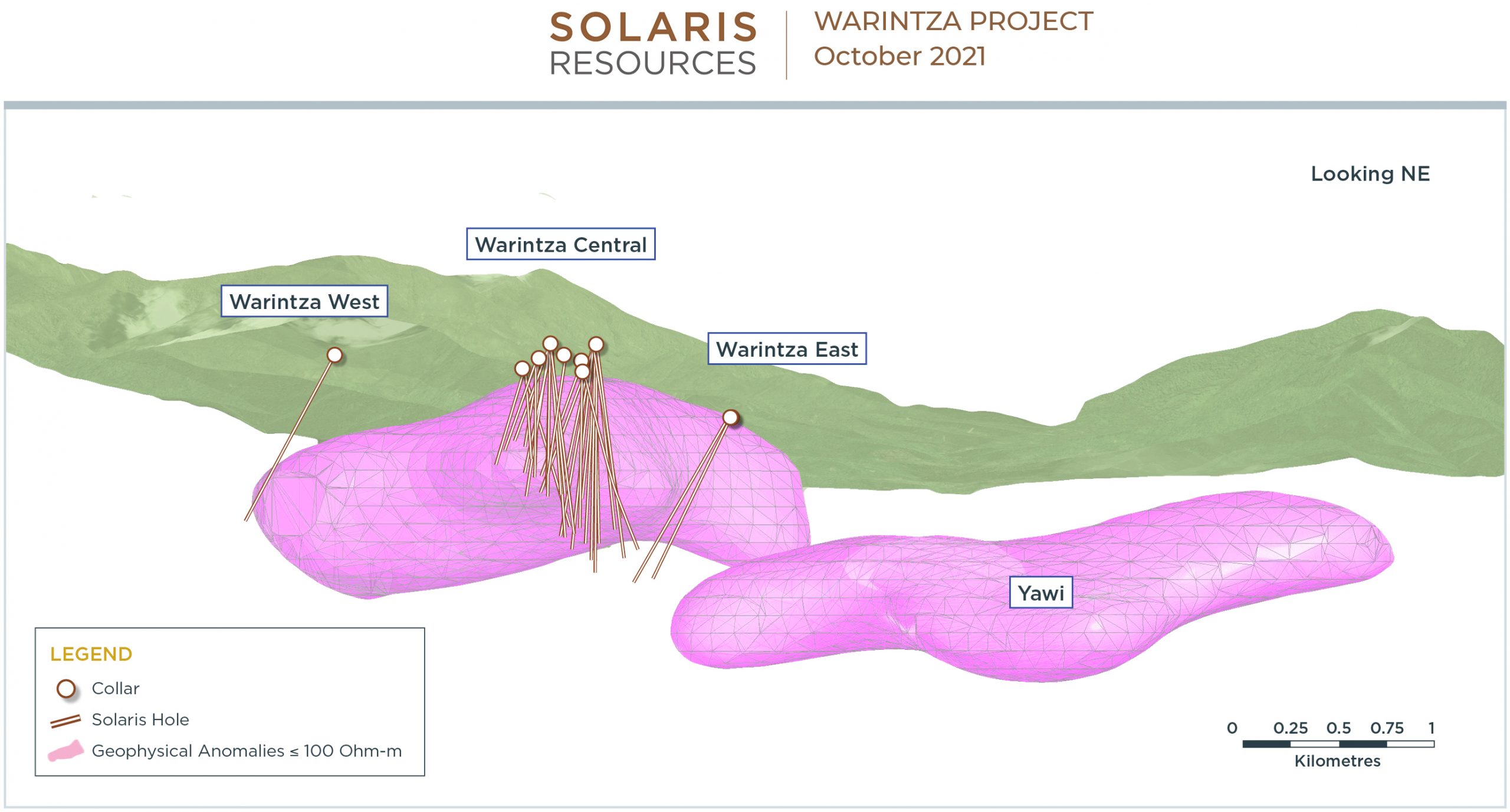

Note to Figure 3: Figure looks northeast and depicts high-conductivity geophysical anomaly (defined at 100 ohm-m) generated from 3D inversion of electromagnetic data, encompassing from left to right Warintza West, Central, East and the Yawi target (Warintza South lies off image to south).
Table 1 – Assay Results
| Hole ID | Date Reported | From (m) | To (m) | Interval (m) | Cu (%) | Mo (%) | Au (g/t) | CuEq¹ (%) | ||
| SLS-34 | Oct 25, 2021 | 52 | 712 | 660 | 0.36 | 0.02 | 0.06 | 0.47 | ||
| Including | 52 | 294 | 242 | 0.51 | 0.03 | 0.08 | 0.67 | |||
| SLS-33 | 40 | 762 | 722 | 0.55 | 0.03 | 0.05 | 0.69 | |||
| Including | 46 | 472 | 426 | 0.71 | 0.03 | 0.06 | 0.85 | |||
| SLSE-02 | 0 | 1160 | 1160 | 0.20 | 0.01 | 0.04 | 0.25 | |||
| Including | 0 | 320 | 320 | 0.39 | 0.02 | 0.04 | 0.48 | |||
| SLS-32 | Oct 12, 2021 | 0 | 618 | 618 | 0.38 | 0.02 | 0.05 | 0.48 | ||
| SLS-31 | 8 | 1008 | 1000 | 0.68 | 0.02 | 0.07 | 0.81 | |||
| SLS-30 | 2 | 374 | 372 | 0.57 | 0.06 | 0.06 | 0.82 | |||
| SLSE-01 | Sep 27, 2021 | 0 | 1213 | 1213 | 0.21 | 0.01 | 0.03 | 0.28 | ||
| SLS-29 | Sep 7, 2021 | 6 | 1190 | 1184 | 0.58 | 0.02 | 0.05 | 0.68 | ||
| SLS-28 | 6 | 638 | 632 | 0.51 | 0.04 | 0.06 | 0.68 | |||
| SLS-27 | 22 | 484 | 462 | 0.70 | 0.04 | 0.08 | 0.91 | |||
| SLS-26 | July 7, 2021 | 2 | 1002 | 1000 | 0.51 | 0.02 | 0.04 | 0.60 | ||
| SLS-25 | 62 | 444 | 382 | 0.62 | 0.03 | 0.08 | 0.77 | |||
| SLS-24 | 10 | 962 | 952 | 0.53 | 0.02 | 0.04 | 0.62 | |||
| SLS-19 | 6 | 420 | 414 | 0.21 | 0.01 | 0.06 | 0.31 | |||
| SLS-23 | May 26, 2021 | 10 | 558 | 548 | 0.31 | 0.02 | 0.06 | 0.42 | ||
| SLS-22 | 86 | 324 | 238 | 0.52 | 0.03 | 0.06 | 0.68 | |||
| SLS-21 | 2 | 1031 | 1029 | 0.63 | 0.02 | 0.04 | 0.73 | |||
| SLS-20 | April 19, 2021 | 18 | 706 | 688 | 0.35 | 0.04 | 0.05 | 0.51 | ||
| SLS-18 | 78 | 875 | 797 | 0.62 | 0.05 | 0.06 | 0.83 | |||
| SLS-17 | 12 | 506 | 494 | 0.39 | 0.02 | 0.06 | 0.50 | |||
| SLS-16 | Mar 22, 2021 | 20 | 978 | 958 | 0.63 | 0.03 | 0.06 | 0.77 | ||
| SLS-15 | 2 | 1231 | 1229 | 0.48 | 0.01 | 0.04 | 0.56 | |||
| SLS-14 | 0 | 922 | 922 | 0.79 | 0.03 | 0.08 | 0.94 | |||
| SLS-13 | Feb 22, 2021 | 6 | 468 | 462 | 0.80 | 0.04 | 0.09 | 1.00 | ||
| SLS-12 | 22 | 758 | 736 | 0.59 | 0.03 | 0.07 | 0.74 | |||
| SLS-11 | 6 | 694 | 688 | 0.39 | 0.04 | 0.05 | 0.57 | |||
| SLS-10 | 2 | 602 | 600 | 0.83 | 0.02 | 0.12 | 1.00 | |||
| SLS-09 | 122 | 220 | 98 | 0.60 | 0.02 | 0.04 | 0.71 | |||
| SLS-08 | Jan 14, 2021 | 134 | 588 | 454 | 0.51 | 0.03 | 0.03 | 0.62 | ||
| SLS-07 | 0 | 1067 | 1067 | 0.49 | 0.02 | 0.04 | 0.60 | |||
| SLS-06 | Nov 23, 2020 | 8 | 892 | 884 | 0.50 | 0.03 | 0.04 | 0.62 | ||
| SLS-05 | 18 | 936 | 918 | 0.43 | 0.01 | 0.04 | 0.50 | |||
| SLS-04 | 0 | 1004 | 1004 | 0.59 | 0.03 | 0.05 | 0.71 | |||
| SLS-03 | Sep 28, 2020 | 4 | 1014 | 1010 | 0.59 | 0.02 | 0.10 | 0.71 | ||
| SLS-02 | 0 | 660 | 660 | 0.79 | 0.03 | 0.10 | 0.97 | |||
| SLS-01 | Aug 10, 2020 | 1 | 568 | 567 | 0.80 | 0.04 | 0.10 | 1.00 | ||
| Notes to table: True widths cannot be determined at this time. | ||||||||||
Table 2 – Collar Location
| Hole ID | Easting | Northing | Elevation (m) | Depth (m) | Azimuth (degrees) | Dip (degrees) |
| SLS-34 | 800383 | 9648303 | 1412 | 1057 | 78 | -60 |
| SLS-33 | 799873 | 9648008 | 1632 | 764 | 0 | -80 |
| SLSE-02 | 801485 | 9648192 | 1170 | 1191 | 275 | -50 |
| Notes to table: The coordinates are in WGS84 17S Datum. | ||||||
The above references an opinion and is for information purposes only. It is not intended to be investment advice. Seek a licensed professional for investment advice. The author is not an insider or shareholder of any of the companies mentioned above.


In recent years, there has been much talk about the importance of helping women feel welcome, challenged in their skills, and finding opportunities in mining, an area traditionally dominated by men. Employers and an organisation called the Minerals Council of South Africa have conducted a survey on working conditions in the industry. They asked the respondents about their professional experience in the mining industry and whether it lured them into the mining industry or kept them there.
For the most part, respondents noted that the industry is constantly evolving, and never more than in the current moment. Inequality in the industry is at an all-time low and continues to drop as women take prominent positions at operational levels, middle-management, and the C-Suite.
North America Leading the Pack
A September 2019 report by international law firm Osler Hoskin Harcourt LLP & Co LLP found that in South Africa, the capital of African mining companies, a high percentage of female directors are driven by regulatory diversity standards. Whereas Latin America and the Caribbean have the lowest rates of women at the top of the mining sector. Canada and the United States are the countries making the most headway.
According to the US Bureau of Labor Statistics, women accounted for 15.8% of the labor force in the mining, quarrying, and oil and gas industries in the US in 2019. From the perspective of women with less than five years of work experience, women rank lower, while growth opportunities are higher for women with more than five years of work experience.
A report by PricewaterhouseCoopers in partnership with Women in Mining UK and Mining Talent shows that mining ranks third among global industries for women in leadership positions. Among the 500 largest mining companies in the world, 8% of directors are women.
A Prominent and Influential Executive
One of the executives breaking all barriers in their career in mining is Kylie Dickson. Kylie Dickson is a Canadian CPA with more than 14 years of experience working with listed commodity companies. She is also a Canadian auditor who has worked throughout the life cycle of the company’s growth and has played a key role in several financing and M & A transactions. Ms. Dickson is a board member of Fortuna Silver Mines Inc. and Star Royalties Ltd. and was appointed to the Board of Directors at Hillcrest Energy.
Other prominent positions have included her time as Chief Financial officer of Solaris Resources, which she resigned from in November of 2019. Before Solaris Resources was spun out of Equinox Gold, Ms. Dickson served as Vice President of Business Development at Equinox Gold.
Solaris Resources has made a deliberate effort to promote women’s empowerment in mining as the diversity of a workforce and management has been proven to lead to more innovation and profitability. Companies have adjusted expectations and seen that they do better with more women in the boardroom, and in particular, directing decisions in the C-suite.
Ms. Sunny Lowe, Chief Financial Officer of Solaris Resources Inc, states, “Solaris has embraced the Women’s Empowerment Principles established by UN Global Compact Office in an effort to advance gender equality and women’s empowerment in the workplace. We have made a deliberate effort to work towards developing a work environment that is barrier-free to developing women leaders in our organization and beyond. The Principles allow us to strengthen our commitment towards internationally proclaimed human rights and serve as a framework for us to create real impact on gender equality through commitment and action focused on seeing female representation in all our operations as well as within industry. Earlier this year, together with Women in Mining Ecuador, we launched the Soy Minera (Woman Miner) scholarship program that will finance undergraduate tuition for female engineering and/or undergraduate students in careers related to mining in Ecuador, supporting the mainstreaming of gender equality at our Warintza project, as well as the opportunity of the mining sector to incorporate actions, through investment, toward women empowerment in the industry.”
Kylie Dickson was on maternity leave for seven months after having her third child when the company she founded, Anthem United, Inc., entered into a merger with two other companies. Shortening maternity leave and hiring a nanny have been one of the toughest decisions of her career, she says.
Dickson grew up in Maple Ridge, British Columbia and earned a Bachelor of Business Administration from Simon Fraser University. During her studies, she worked at KPMG before getting a full-time job in 2003 and earning her Certificate of Accountancy. Using her skills and training, she has specialised as a manager in the mining sector.
A Track Record That Says it All
One of KPMG’s clients was Greg Smith, a mining entrepreneur who founded a company called Minefinders Corp. He hired Dickson as a financial controller and led partnerships in a series of successful mine mergers and acquisitions worth more than $2 billion. Dickson was Chief Financial officer of the subsequently acquired Esperanza Resources Corp. After leaving, Dickson co-founded Anthem United.
Her track record is an impressive one, and stands out as an example of a multi-faceted executive career in the mining industry. She was the Vice President of Business Development at Equinox Gold Corp. and, before that, VP, Business Development at Trek Mining. Kylie previously worked as Chief Financial Officer for JDL Gold Corp., Anthem United Inc. and Esperanza Resources, and served as the Corporate Controller of Minefinders Corporation.
The Latest Chapter
Most recently, Hillcrest Energy Technologies appointed Kylie Dickson to its Board of Directors.
Hillcrest is a partnership with Oropass Ltd., an Ontario-registered company that holds the U.S. license rights to a patented electrical generation technology. Through concept and commercialization, Hillcrest Energy Technologies Ltd. invests in the development of future-oriented energy solutions.
CEO Don Currie announced the appointment of Kylie Dickson to the company’s board of directors on April 9. Ms Dickson has worked throughout the life cycle of Hillcrest’s growth and has played a key role in several financing and M&A transactions. She will join the company’s Board of Directors, where she will bring experience, knowledge and involvement in areas such as audit and corporate governance committees.
Kylie Dickson also joined the Fortuna Silver Mines Inc. Board in 2017 and sits on the Audit Committee and Corporate Governance and Nominating Committee. Ms. Dickson is an executive with over 14 years of experience in the mining industry. She has worked with companies at various stages of the mining life cycle including exploration, mine development and operations, as well as playing a key role in multiple financings and M&A transactions. Kylie is currently the Vice President, Business Development of Trek Mining Inc. Kylie Dickson was the Chief Financial Officer of JDL Gold Corp. when JDL acquired Luna Gold Corp. to create Trek Mining in March 2017.
Previously, Kylie was a founding shareholder and Chief Financial Officer of Anthem United Inc. and was the Chief Financial Officer of Esperanza Resources which was acquired by Alamos Gold in 2013. She also served as the Corporate Controller of Minefinders Corporation from 2007 to 2012 prior to its acquisition by Pan American Silver. Kylie also currently serves on the Board of Directors at Hillcrest Energy Kylie began her career with KPMG LLP’s mining practice and is a Canadian CPA, CA with a BBA in Accounting from Simon Fraser University.
The above references an opinion and is for information purposes only. It is not intended to be investment advice. Seek a licensed professional for investment advice. The author is not an insider or shareholder of any of the companies mentioned above.
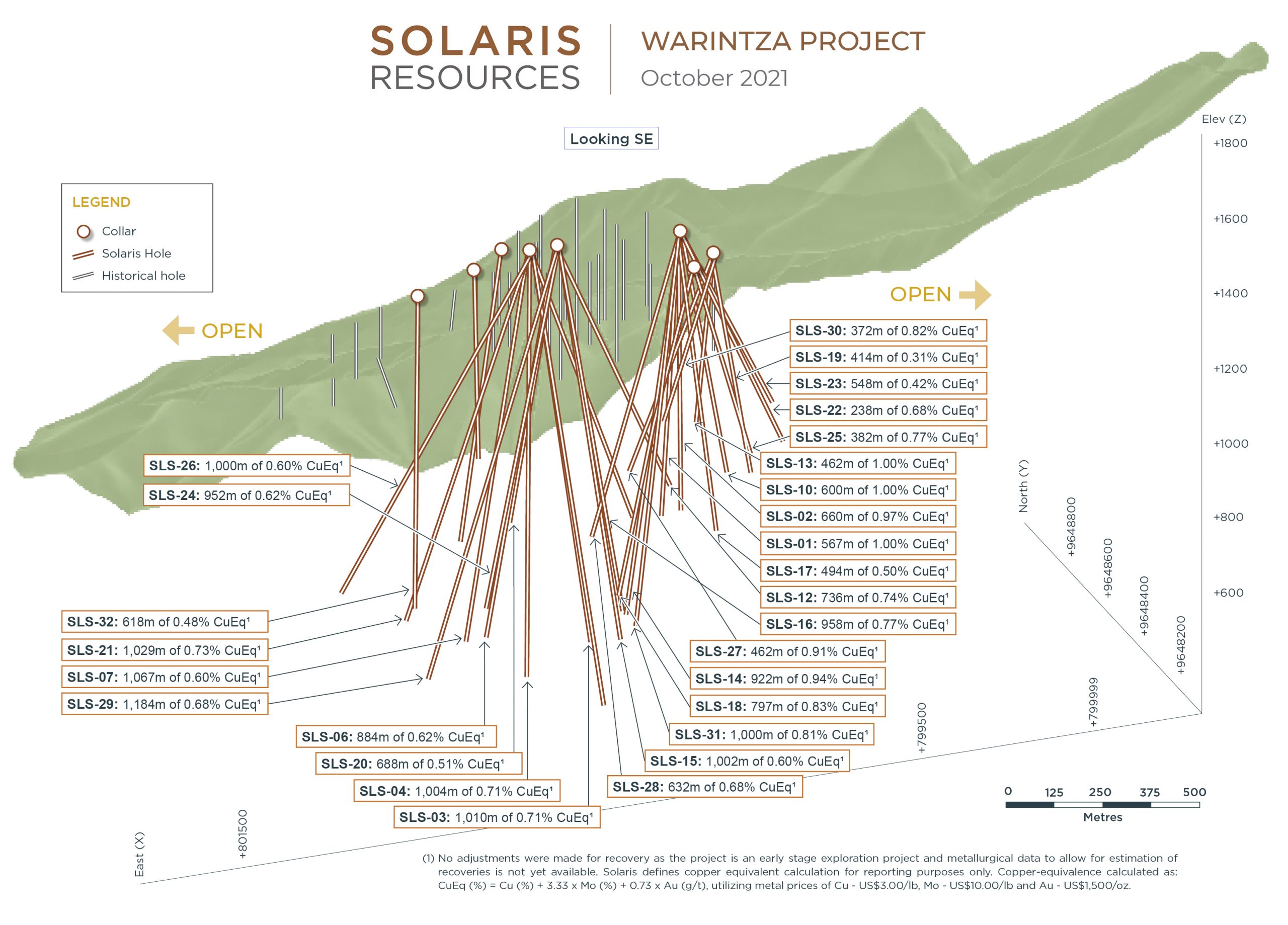

Solaris Resources (TSX:SLS) (OTCQB:SLSSF) has reported new assay results this morning from its ongoing resource expansion drilling at its flagship Warintza project. The project is located in southeastern Ecuador and has been progression rapidly, with a focus on Waritnza Central.
Mr. Jorge Fierro, Vice President, Exploration, commented: “Warintza Central continues to expand, with the limits of the zone to the north, south and east yet to be found. Drilling planned over the coming months is focused on further extensional and step-out drilling, including establishing the potential link to the recently-discovered Warintza East zone, and discovery drilling at the other well-defined targets within the 7km x 5km Warintza cluster of porphyries.”
Highlights
- Three additional holes at Warintza Central, as detailed below, have extended the drill defined envelope of high-grade mineralization to the north, northeast and south, with the highest-grade mineralization encountered in all holes starting at or near surface (refer to Figures 1 & 2)
- SLS-30 was collared in the western portion of the Warintza Central grid and drilled into a partially open volume to the north, returning 372m of 0.82% CuEq¹ from surface, including 264m of 0.97% CuEq¹ from 42m depth, extending mineralization in this direction
- SLS-31 was collared in the middle of Warintza Central and drilled into an entirely open volume to the southeast, returning 1,000m of 0.81% CuEq¹ from near surface, including 768m of 0.90% CuEq¹ from 44m depth, extending mineralization to the south in this area
- SLS-32, stepped out approximately 165m northeast beyond the northern limit of drilling and drilled vertically into an open volume, returning 618m of 0.48% CuEq¹ from surface, including 372m of 0.64% CuEq¹ from 46m depth, broadening the width of the zone to the north
- To date, 44 holes have been completed at Warintza Central with assays reported for 32 of these
Table 1 – Warintza Central Assay Results
| Hole ID | Date Reported | From (m) | To (m) | Interval (m) | Cu (%) | Mo (%) | Au (g/t) | CuEq¹ (%) | ||
| SLS-32 | Oct 12, 2021 | 0 | 618 | 618 | 0.38 | 0.02 | 0.05 | 0.48 | ||
| Including | 46 | 418 | 372 | 0.53 | 0.02 | 0.06 | 0.64 | |||
| SLS-31 | 8 | 1008 | 1000 | 0.68 | 0.02 | 0.07 | 0.81 | |||
| Including | 44 | 812 | 768 | 0.75 | 0.03 | 0.08 | 0.90 | |||
| SLS-30 | 2 | 374 | 372 | 0.57 | 0.06 | 0.06 | 0.82 | |||
| Including | 42 | 306 | 264 | 0.72 | 0.06 | 0.07 | 0.97 | |||
| SLS-29 | Sep 7, 2021 | 6 | 1190 | 1184 | 0.58 | 0.02 | 0.05 | 0.68 | ||
| SLS-28 | 6 | 638 | 632 | 0.51 | 0.04 | 0.06 | 0.68 | |||
| SLS-27 | 22 | 484 | 462 | 0.70 | 0.04 | 0.08 | 0.91 | |||
| SLS-26 | July 7, 2021 | 2 | 1002 | 1000 | 0.51 | 0.02 | 0.04 | 0.60 | ||
| SLS-25 | 62 | 444 | 382 | 0.62 | 0.03 | 0.08 | 0.77 | |||
| SLS-24 | 10 | 962 | 952 | 0.53 | 0.02 | 0.04 | 0.62 | |||
| SLS-19 | 6 | 420 | 414 | 0.21 | 0.01 | 0.06 | 0.31 | |||
| SLS-23 | May 26, 2021 | 10 | 558 | 548 | 0.31 | 0.02 | 0.06 | 0.42 | ||
| SLS-22 | 86 | 324 | 238 | 0.52 | 0.03 | 0.06 | 0.68 | |||
| SLS-21 | 2 | 1031 | 1029 | 0.63 | 0.02 | 0.04 | 0.73 | |||
| SLS-20 | April 19, 2021 | 18 | 706 | 688 | 0.35 | 0.04 | 0.05 | 0.51 | ||
| SLS-18 | 78 | 875 | 797 | 0.62 | 0.05 | 0.06 | 0.83 | |||
| SLS-17 | 12 | 506 | 494 | 0.39 | 0.02 | 0.06 | 0.50 | |||
| SLS-16 | Mar 22, 2021 | 20 | 978 | 958 | 0.63 | 0.03 | 0.06 | 0.77 | ||
| SLS-15 | 2 | 1231 | 1229 | 0.48 | 0.01 | 0.04 | 0.56 | |||
| SLS-14 | 0 | 922 | 922 | 0.79 | 0.03 | 0.08 | 0.94 | |||
| SLS-13 | Feb 22, 2021 | 6 | 468 | 462 | 0.80 | 0.04 | 0.09 | 1.00 | ||
| SLS-12 | 22 | 758 | 736 | 0.59 | 0.03 | 0.07 | 0.74 | |||
| SLS-11 | 6 | 694 | 688 | 0.39 | 0.04 | 0.05 | 0.57 | |||
| SLS-10 | 2 | 602 | 600 | 0.83 | 0.02 | 0.12 | 1.00 | |||
| SLS-09 | 122 | 220 | 98 | 0.60 | 0.02 | 0.04 | 0.71 | |||
| SLS-08 | Jan 14, 2021 | 134 | 588 | 454 | 0.51 | 0.03 | 0.03 | 0.62 | ||
| SLS-07 | 0 | 1067 | 1067 | 0.49 | 0.02 | 0.04 | 0.60 | |||
| SLS-06 | Nov 23, 2020 | 8 | 892 | 884 | 0.50 | 0.03 | 0.04 | 0.62 | ||
| SLS-05 | 18 | 936 | 918 | 0.43 | 0.01 | 0.04 | 0.50 | |||
| SLS-04 | 0 | 1004 | 1004 | 0.59 | 0.03 | 0.05 | 0.71 | |||
| SLS-03 | Sep 28, 2020 | 4 | 1014 | 1010 | 0.59 | 0.02 | 0.10 | 0.71 | ||
| SLS-02 | 0 | 660 | 660 | 0.79 | 0.03 | 0.10 | 0.97 | |||
| SLS-01 | Aug 10, 2020 | 1 | 568 | 567 | 0.80 | 0.04 | 0.10 | 1.00 | ||
| Notes to table: Grades are uncut and true widths cannot be determined at this time. | ||||||||||
Table 2 – Collar Locations for New Drill Holes
| Hole ID | Easting | Northing | Elevation (m) | Depth (m) | Azimuth (degrees) | Dip (degrees) |
| SLS-32 | 800383 | 9648303 | 1422 | 831 | 0 | -89 |
| SLS-31 | 799765 | 9648033 | 1571 | 1025 | 97 | -80 |
| SLS-30 | 799667 | 9648029 | 1499 | 552 | 0 | -65 |
| Notes to table: The coordinates are in WGS84 17S Datum. | ||||||
| (1) No adjustments were made for recovery as the project is an early-stage exploration project and metallurgical data to allow for estimation of recoveries is not yet available. Solaris defines copper equivalent calculation for reporting purposes only. Copper-equivalence calculated as: CuEq (%) = Cu (%) + 3.33 × Mo (%) + 0.73 × Au (g/t), utilizing metal prices of Cu – US$3.00/lb, Mo – US$10.00/lb and Au – US$1,500/oz. |
Source: Solaris Resources
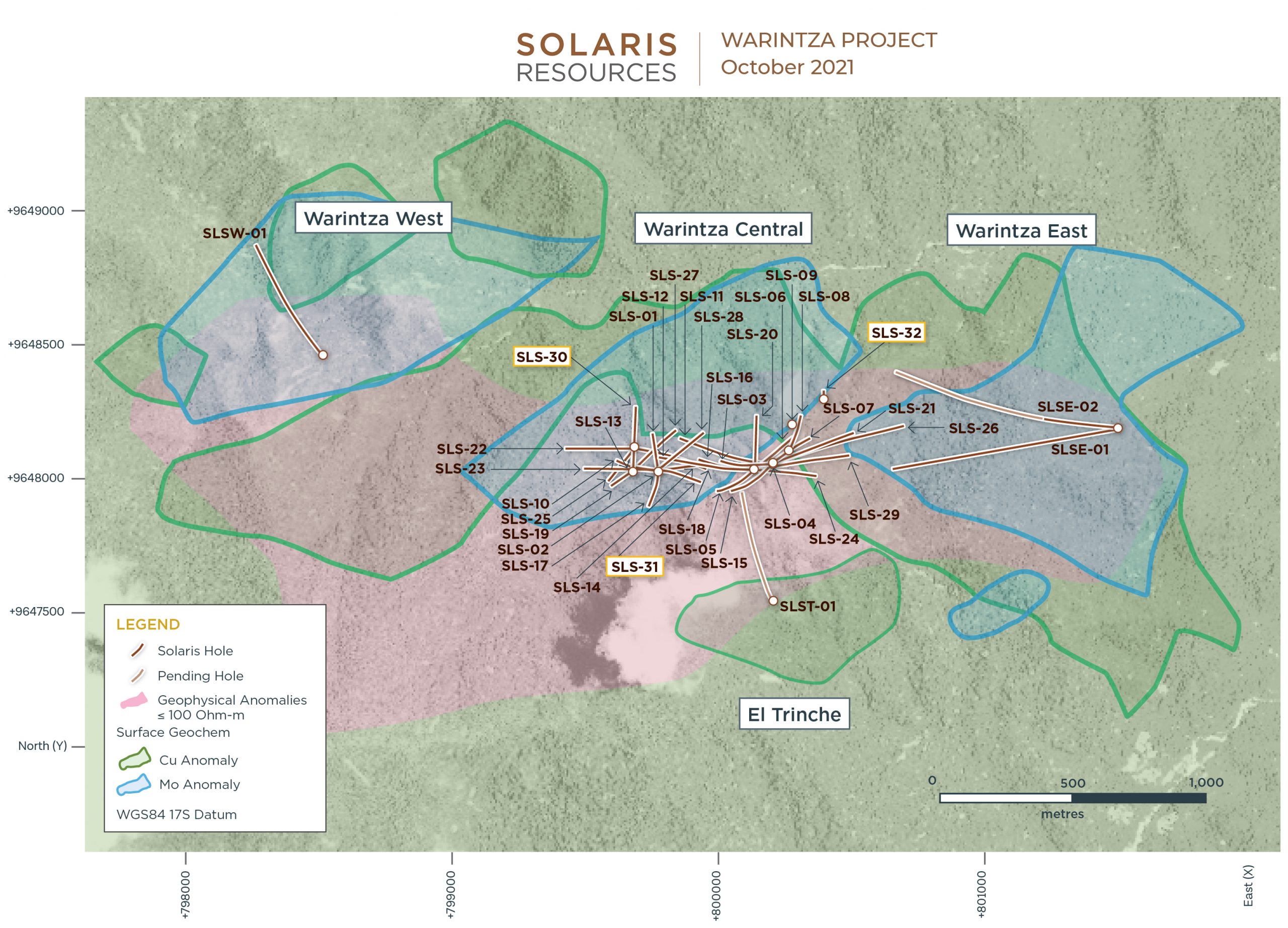

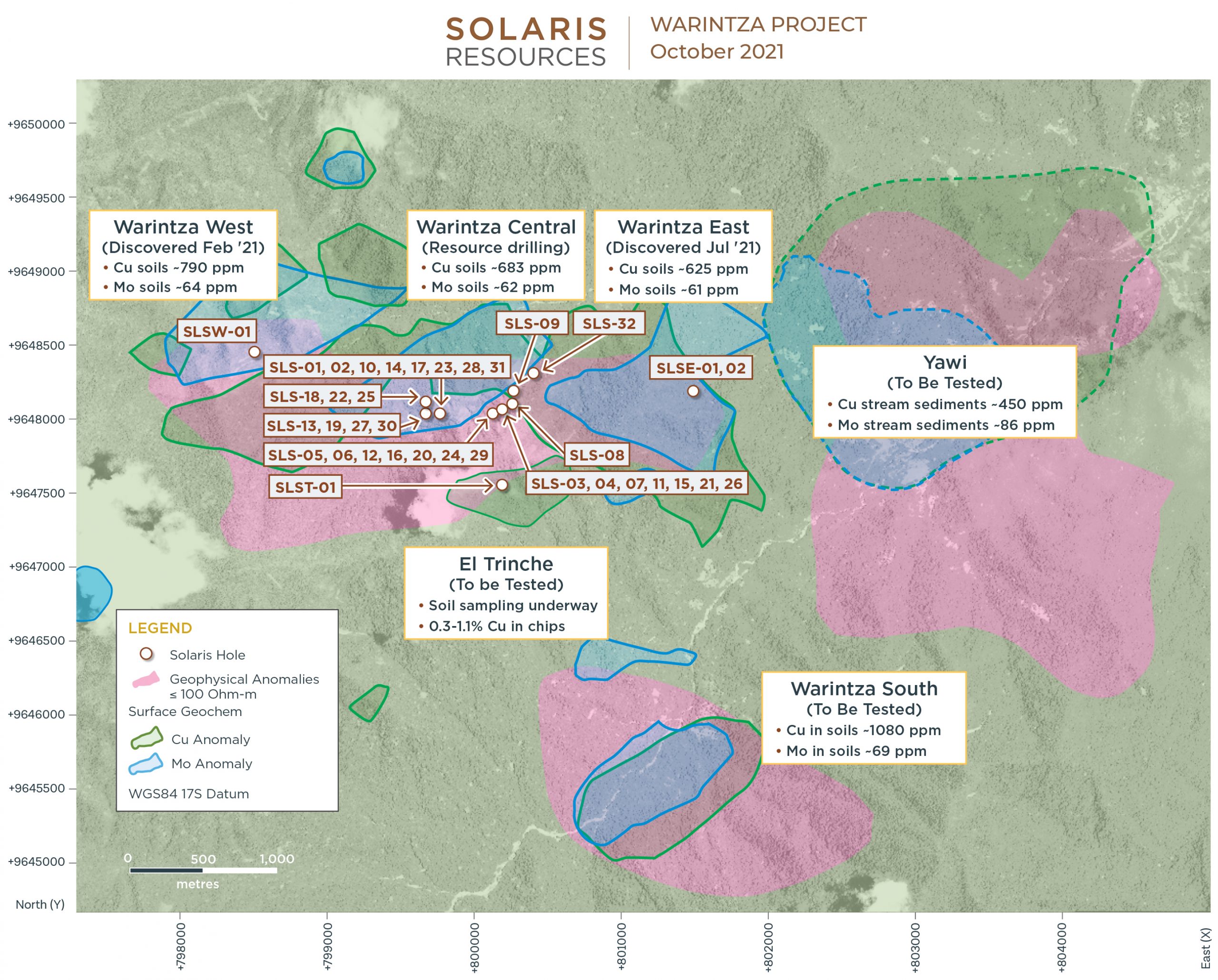

The above references an opinion and is for information purposes only. It is not intended to be investment advice. Seek a licensed professional for investment advice. The author is not an insider or shareholder of any of the companies mentioned above.
New assay results from Solaris Resources’ (TSX:SLS) Waritnza East discovery have return long intervals of copper prphyry mineralization from surface, from the first two holes. The high-grade links identified between Warintza East and Warintza Central is now being targeted, as this area to the north may yield a higher-grade mineralization.
Highlights
- The first two holes at Warintza East, as detailed below, both returned long intervals of copper porphyry mineralization from surface across a significant portion of the undrilled gap to Warintza Central, suggesting potential continuity between the two zones
- Visual observation of mineralization in the second hole and step-out drilling completed northeast of Warintza Central suggest an offset in the east-west corridor of higher-grade mineralization to the north that is being targeted in ongoing drilling
- SLSE-01, collared approximately 1,300m east of Warintza Central and drilled to the southwest, returned 396m of 0.42% CuEq¹ from surface, with the full length of the hole of 1,213m assaying 0.28% CuEq¹
- SLSE-02, collared from the same platform but drilled to the northwest, returned 320m of 0.48% CuEq¹, including 62m of 0.68% CuEq¹ from surface, from the first 320m of core for which assays have been received, with the last 10m of the interval grading 0.47% CuEq¹
- Visual observation of core from SLSE-02 suggests that a much broader interval of mineralization may exist than the portion for which assays have been received and reported herein; remaining assays are expected in October, along with the results of step-out drilling from Warintza Central
- Warintza East is the third major discovery within the 7km x 5km Warintza porphyry cluster and is defined by coincident copper and molybdenum soil anomalies, measuring approximately 1,200m in strike, and a high-conductivity geophysical anomaly that extends from the target through Warintza Central (refer to Figure 1)
Figure 1 – Long Section of 3D Geophysics Looking Northeast
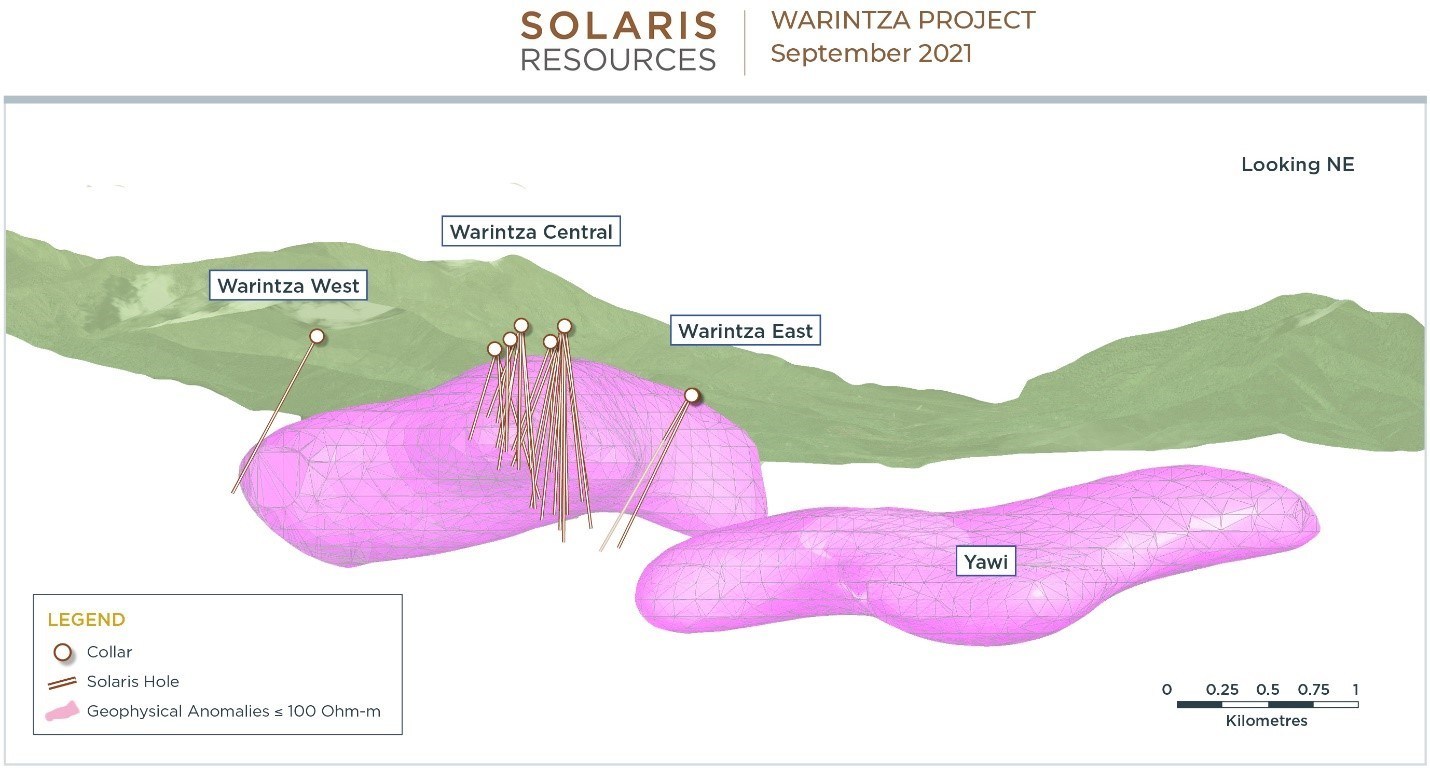

Figure 2 – Plan View Showing Wartinza East Drill Hole Traces
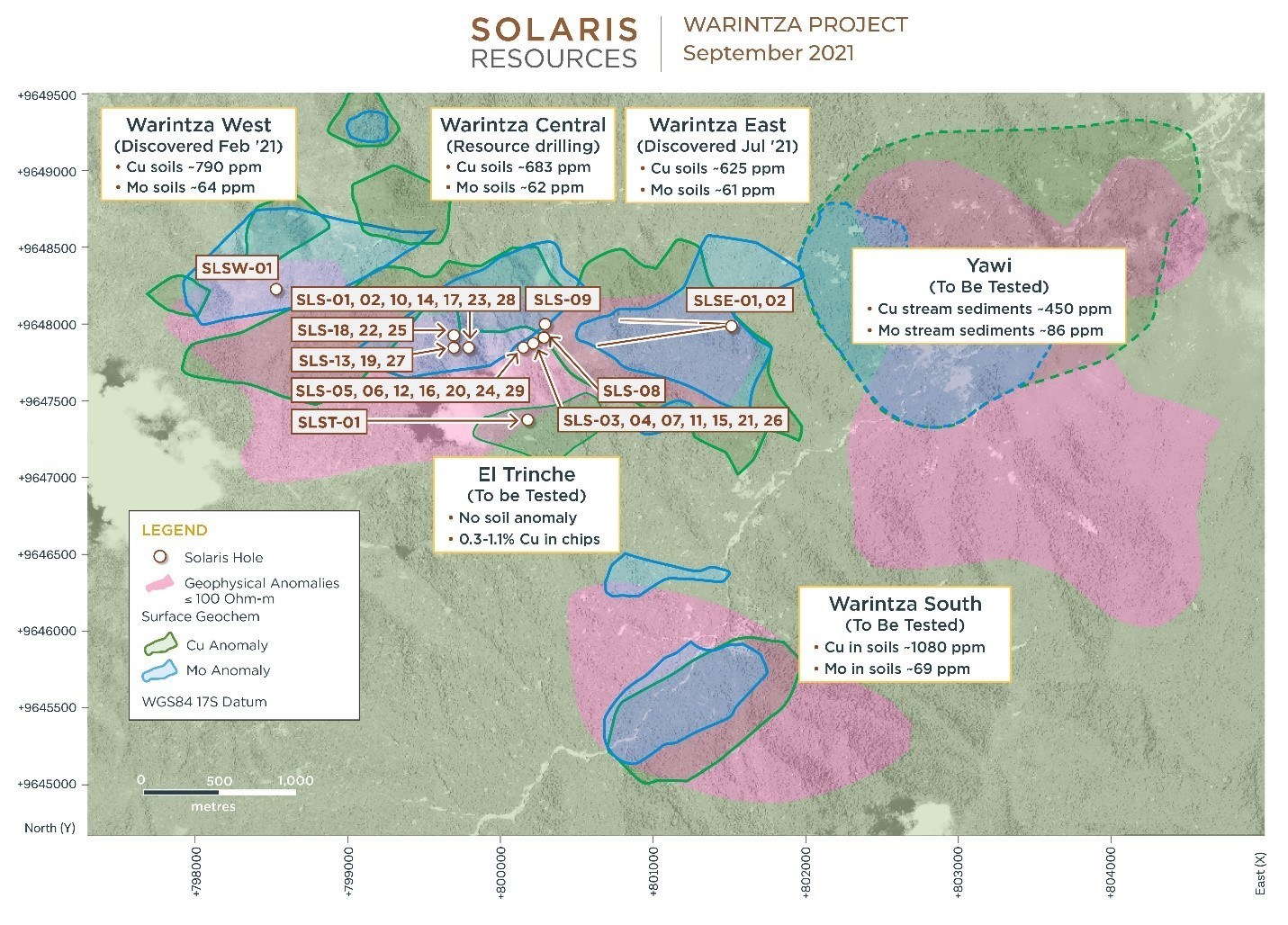

Table 1 – Warintza East Results
| Hole ID | Date Reported | From (m) | To (m) | Interval (m) | Cu (%) | Mo (%) | Au (g/t) | CuEq¹ (%) |
| SLSE-02 | September 27, 2021 | 0 | 320 | 320 | 0.39 | 0.02 | 0.04 | 0.48 |
| Including | 0 | 62 | 62 | 0.59 | 0.01 | 0.06 | 0.68 | |
| SLSE-01 | 0 | 1213 | 1213 | 0.21 | 0.01 | 0.03 | 0.28 | |
| Including | 0 | 396 | 396 | 0.33 | 0.02 | 0.04 | 0.42 | |
| Notes to table: True widths cannot be determined at this time. | ||||||||
Table 2 – Collar Location
| Hole ID | Easting | Northing | Elevation (m) | Depth (m) | Azimuth (degrees) | Dip (degrees) |
| SLSE-02 | 801485 | 9648192 | 1170 | 1191 | 275 | -50 |
| SLSE-01 | 801485 | 9648192 | 1170 | 1213 | 260 | -45 |
| Notes to table: The coordinates are in WGS84 17S Datum. | ||||||
| (1) | No adjustments were made for recovery as the project is an early-stage exploration project and metallurgical data to allow for estimation of recoveries is not yet available. Solaris defines copper equivalent calculation for reporting purposes only. Copper-equivalence calculated as: CuEq (%) = Cu (%) + 3.33 × Mo (%) + 0.73 × Au (g/t), utilizing metal prices of Cu – US$3.00/lb, Mo – US$10.00/lb and Au – US$1,500/oz. |
Mr. Jorge Fierro, Vice President, Exploration, commented: “With this latest discovery at Warintza East and the growing footprint of Warintza Central to the north and east returning some of the strongest intervals reported to date, the conceptual pit shell is expected to be extended to the north and east showing the potential to ultimately become one multi-kilometre ‘superpit’ joining the two areas. Future drilling will focus on the open, undrilled area between these two zones.”
The above references an opinion and is for information purposes only. It is not intended to be investment advice. Seek a licensed professional for investment advice. The author is not an insider or shareholder of any of the companies mentioned above.
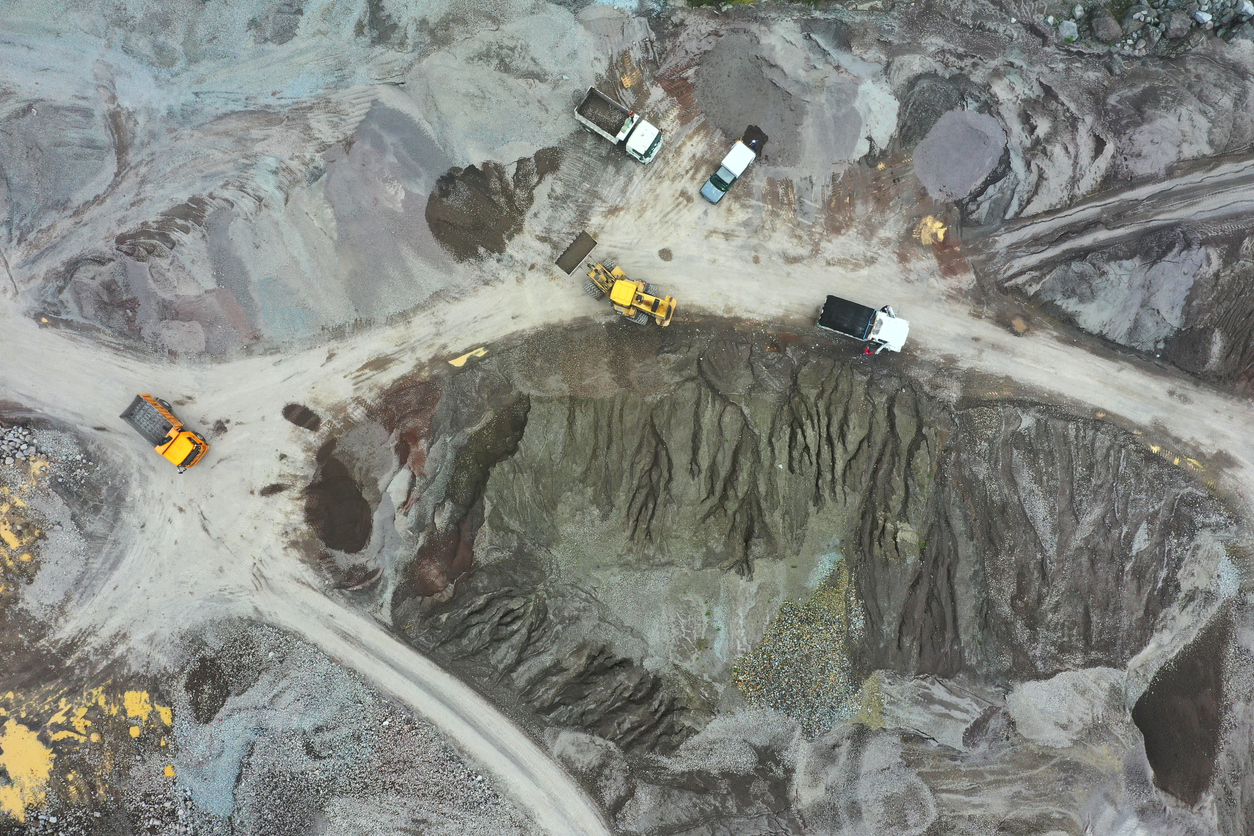

Ecuador expects to start production of four major mining projects by the end of President Guillermo Lasso’s first term in office in 2025, as he seeks to diversify the economy beyond oil exports, the Ministry of Natural Resources said on Friday. Lasso has been trying to attract private investment to boost the economy, which was in a deep recession last year, exacerbating Ecuador’s cash-strapped economy.
To do so, the President has issued a new decree, paving the way for investment in the nation and mining projects. This has the potential to open the floodgates for miners looking to expand or begin mining in the mineral-rich country.
Ecuador has rich mineral resources but lags behind its Andean neighbors Peru and Chile in the development of large mines. Many large mining projects in Ecuador face resistance from local communities and are struggling to fill informal miners who have slowed their development. However, the right approach with consultation with local communities has proven to be extremely effective. Successful projects like Solaris Resources’ (TSX:SLS) Warintza Project have been proven to be some of the most promising copper projects in the entire Andean region, and have been models of how mining companies can work hand in hand with local communities to uphold critical ESG principles.
Three gold concessions of Canadian companies Dundee Precious Metals (TSX:DPM) in Loma Largo, Atico Mining Corp (TSXV:ATY) in Plata, and Adventus Mining Corp (TSXV:ADZN) in Curipamba are in advanced exploration phase and could begin production by 2023, the Department of Energy, Non-Renewable Energy and Natural Resources said in its statement. The Cascabel concession, operated by Australia’s SolGold Plc, is expected to start copper production by 2025, the ministry added.
The largest copper mine in South America, the Mirador Project, operated by a subsidiary of the Chinese consortium CRCC Tongguan, commenced production in mid-2019. Its first major gold mine, the Canadian Lundin Gold Inc.’s (TSX:LUN) Fruta del Norte mine project, started in November this year. Its authorities expect exports of mineral resources to reach $1.6 billion a year, an increase of 7.4% from 2020.
With Ecuador positioning itself as a nation of open arms for the mining industry, it is set to catch up to, and surpass its neighbours in the coming years and decades.
The above references an opinion and is for information purposes only. It is not intended to be investment advice. Seek a licensed professional for investment advice. The author is not an insider or shareholder of any of the companies mentioned above.
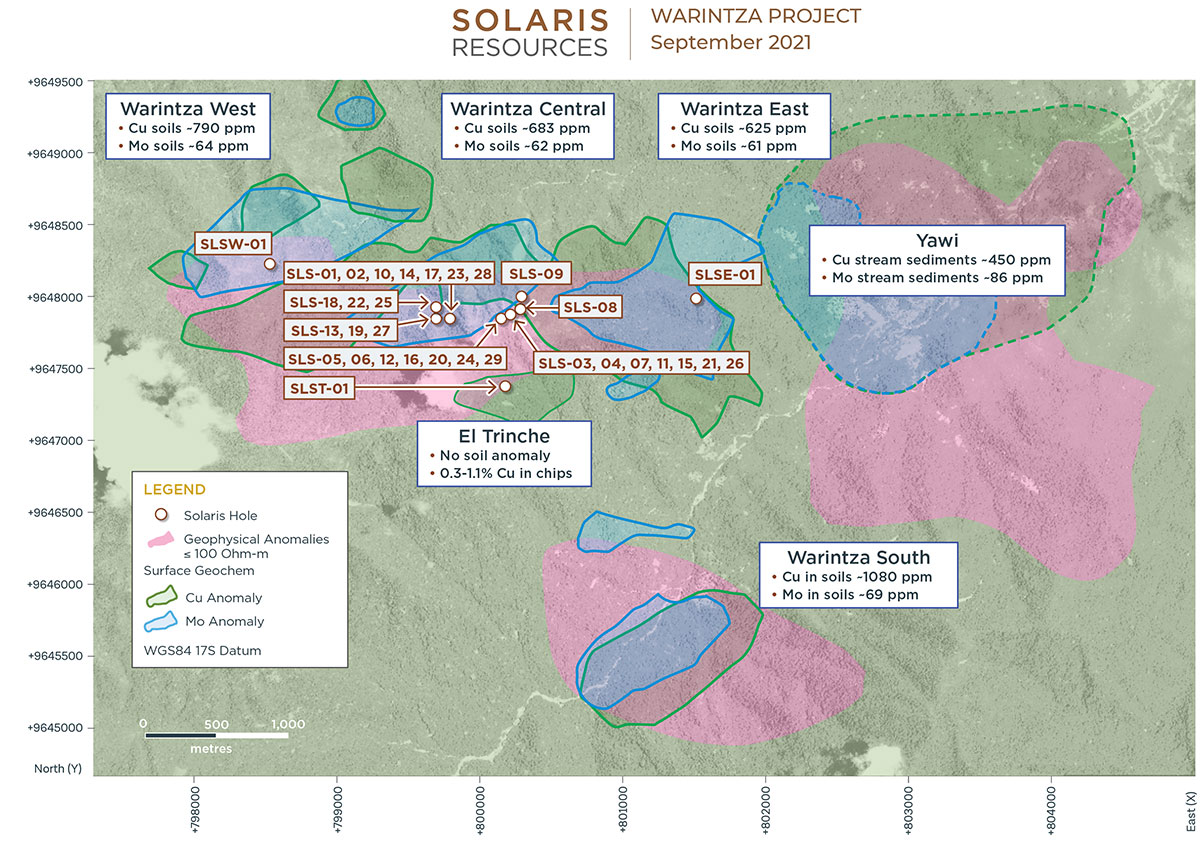

Solaris Resources has just announced its latest assay results from ongoing resource expansion drilling at its Warintza Project in southeastern Ecuador.
Mr. Jorge Fierro, Vice President, Exploration, commented “Drilling at Warintza Central continues to expand the dimensions of the zone beyond its original footprint. The strike length of Central now measures over 1,250m, with ongoing drilling aiming to extend the zone further to the east, broaden the zone to the north, and test the potential for a southern extension of at least 500m at El Trinche. At the same time, we await additional assays for our recent Warintza East discovery, where we have just added a second rig to accelerate drilling.”
The highlights from the results are as follows:
- Three additional holes at Warintza Central have unfilled gaps within the drilling pattern and extended the envelope of high-grade mineralization to the east, with high-grade mineralization encountered in all holes starting at or near the surface.
- SLS-27 was collared in the southwestern part of Warintza Central and drilled into a partially-open volume to the northeast, returning 462m of 0.91% CuEq¹ from near surface, including 372m of 1.02% CuEq¹ from 36m depth, infilling and extending mineralization in this area.
- SLS-28 was collared in the middle of Warintza Central and drilled into a partially-open volume to the northeast, returning 632m of 0.68% CuEq¹ from surface, including 316m of 1.00% CuEq¹ from 42m depth, infilling and extending mineralization in this area.
- SLS-29 was collared at the southeastern limit of the Warintza Central grid and drilled into an open volume to the east, returning 1,184m of 0.68% CuEq¹ from surface, including 480m of 0.80% CuEq¹ from 48m depth, extending mineralization to the east in this area.
- Maiden drilling has begun at El Trinche, a potential southern extension of Warintza Central, with the first hole collared approximately 500m beyond the southern limit of drilling in an area of rock sampling with values ranging from 0.3-1.1% copper at surface.
- To date, 40 holes have been completed at Warintza Central with assays reported for 29 of these. The assay backlog has grown due to downtime at the Project’s principal lab in Lima to install additional equipment and increase capacity, with operations having now resumed.
- Increased news flow is expected from September through year-end, including remaining assays from SLSE-01, which marked a new discovery at Warintza East (see press release dated July 20, 2021), with the Company adding a second rig to accelerate this important drilling.
Source: Solaris Resources
Solaris Resources Inc. is a part of the Augusta group of companies and is “responsibly and sustainably advancing a portfolio of copper and gold projects in the Americas.” The company currently operates their Warintza project in Ecuador, and expects to be drilling for discoveries at Tamarugo and Ricardo projects in Chile and Capricho and Paco Orco projects in Peru.
The above references an opinion and is for information purposes only. It is not intended to be investment advice. Seek a licensed professional for investment advice. The author is not an insider or shareholder of any of the companies mentioned above.
If you would like to receive our free newsletter via email, simply enter your email address below & click subscribe.
CONNECT WITH US
Tweets
Tweet with hash tag #miningfeeds or @miningfeeds and your tweets will be displayed across this site.
MOST ACTIVE MINING STOCKS
Daily Gainers
      |
AAZ.V | +50.00% |
      |
ADD.AX | +50.00% |
      |
ERA.AX | +50.00% |
      |
DEV.AX | +31.82% |
      |
CASA.V | +30.00% |
      |
RMD.V | +25.00% |
      |
BMG.AX | +25.00% |
      |
CUL.AX | +25.00% |
      |
NOW.V | +22.81% |
      |
ACS.V | +22.58% |












